1
COMMITTEE ON WAYS AND MEANS,
U.S. HOUSE OF REPRESENTATIVES,
WASHINGTON, D.C.
INTERVIEW OF: GARY A. SHAPLEY, JR.
Friday, May 26, 2023
Washington, D.C.
The interview in the above matter was held in 5480 O'Neill House Office Building,
commencing at 9:33 a.m.

2
Appearances:
For the COMMITTEE ON WAYS AND MEANS:
, MAJORITY COUNSEL
, MAJORITY COUNSEL
, MAJORITY COUNSEL
, MAJORITY STAFF
, MAJORITY STAFF
, MAJORITY COUNSEL
, MINORITY COUNSEL
, MINORITY COUNSEL
, MINORITY COUNSEL
For GARY A. SHAPLEY, JR.:
MARK D. LYTLE,
PARTNER,
NIXON PEABODY LLP
TRISTAN LEAVITT,
PRESIDENT,
EMPOWER OVERSIGHT

3
MAJORITY COUNSEL 1. Good morning. This is a transcribed interview of
Internal Revenue Service Criminal Supervisory Special Agent Gary Shapley.
Chairman Jason Smith has requested this interview following a letter sent to the
committee through counsel on April 19th, 2023, indicating Mr. Shapley's desire to make
protected whistleblower disclosures to Congress.
This interview is being conducted as part of the committee's oversight of the
Internal Revenue Code and the Internal Revenue Service.
Would the witness please state your name for the record?
Mr. Shapley. Gary Shapley.
MAJORITY COUNSEL 1. Could counsel for the witness please state your names
for the record?
Mr. Lytle. Mark Lytle.
Mr. Leavitt. Tristan Leavitt.
MAJORITY COUNSEL 1. On behalf of the committee, I want to thank you for
appearing here today to answer our questions and for coming forward to make these
disclosures to Congress.
My name is . I'm an attorney on Chairman Smith's Ways and Means
Committee staff.
I'll now have everyone else from the committee who is here at the table introduce
themselves as well.
MAJORITY COUNSEL 2. with the majority staff.
MAJORITY COUNSEL 3. , majority staff.
MAJORITY STAFF. , majority staff.
MAJORITY COUNSEL 4. , majority staff.
MAJORITY STAFF. , majority staff.

4
MINORITY COUNSEL 1. , minority staff.
MINORITY COUNSEL 2. , minority staff.
MINORITY COUNSEL 3. , minority.
MAJORITY COUNSEL 1. Thank you.
I'd like to now go over the ground rules and guidelines we'll follow during today's
interview.
Because you have come forward as a whistleblower and seek to make disclosures
to Congress, we will first give you an opportunity to make an opening statement.
Following your statement, the questioning will proceed in rounds. The majority
will ask questions first for one hour, and then the minority will have an opportunity to ask
questions for an equal period of time if they choose. We will alternate back and forth
until there are no more questions and the interview is over.
Typically, we take a short break at the end of each hour, but if you would like to
take a break apart from that, please just let us know.
As you can see, there is an official court reporter taking down everything we say to
make a written record, so we ask that you give verbal responses to all questions.
Do you understand?
Mr. Shapley. Yes, I do.
MAJORITY COUNSEL 1. So the court reporter can take down a clear record, we
will do our best to limit the number of people directing questions at you during any given
hour to just those people on staff whose turn it is.
Please try and speak clearly so the court reporter can understand and so everyone
at the end of the table can hear you. It is important that we don't talk over one another
or interrupt each other if we can help it, and that goes for everyone present at today's
interview.

5
We want you to answer our questions in the most complete, truthful manner as
possible, so we will take our time. If you have any questions or if you do not understand
one of our questions, please let us know.
Our questions will cover a wide range of topics, so if you need clarification on any
point, just say so. If you honestly don't know the answer to a question or do not
remember, it is best not to guess. Please give us your best recollection.
It is okay to tell us if you learned the information from someone else. Just
indicate how you came to know the information. If there are things you don't know or
can't remember, just say so and please inform us who, to the best of your knowledge,
might be able to provide a more complete answer to the question.
If you need to confer with counsel, we can go off the record and stop the clock
until you are prepared to respond.
You should also understand that, by law, you're required to answer questions
from Congress truthfully.
Do you understand?
Mr. Shapley. Yes, I do.
MAJORITY COUNSEL 1. This also applies to questions posed by congressional
staff in an interview.
Do you understand?
Mr. Shapley. Yes, I do.
MAJORITY COUNSEL 1. Witnesses that knowingly provide false testimony could
be subject to criminal prosecution for perjury or making a false statement under 18 U.S.C.
1001.
Do you understand?
Mr. Shapley. Yes, I do.

6
MAJORITY COUNSEL 1. Is there any reason you are unable to provide truthful
answer to today's questions?
Mr. Shapley. There is not.
MAJORITY COUNSEL 1. Finally, I'd like to note the information discussed here
today is confidential. As an IRS agent, I know you understand the significance of our tax
privacy laws. Chairman Smith takes our tax privacy laws extremely seriously, and we
have worked diligently to make sure that you can provide your disclosures to Congress in
a legal manner and with the assistance of counsel.
As I'm sure you know, 26 U.S.C. Section 6103 makes tax returns and return
information confidential, subject to specific authorizations or exceptions in the statute.
The statute anticipates and provides for whistleblowers like yourself to come
forward and share information with Congress under Section 6103(f)(5).
Specifically, that statute permits a person with access to returns or return
information to disclose it to a committee referred to in subsection (f)(1) or any individual
authorized to receive or inspect information under paragraph (4)(A) if the whistleblower
believes such return or return information may relate to possible misconduct,
maladministration, or taxpayer abuse.
In your position at the IRS, do you or did you have access to return or return
information covered by Section 6103 of the Internal Revenue Code?
Mr. Shapley. Yes.
MAJORITY COUNSEL 1. Have you had access to return information that you
believe may relate to possible misconduct, maladministration, or taxpayer abuse?
Mr. Shapley. Yes.
MAJORITY COUNSEL 1. Do you wish to disclose such information to the
committee today?

7
Mr. Shapley. Yes, I do.
MAJORITY COUNSEL 1. In addition to Section 6103(f)(5), the chairman of the
committee on Ways and Means has authority under Section 6103(f)(4)(A) to designate
agents to receive and inspect returns and return information.
To facilitate the disclosures you wish to make here today, Chairman Smith has
designated the individuals in this room for the purposes of receiving the information you
wish to share. The chairman considers this entire interview and the resulting transcript
as protected confidential information under Section 6103.
That means that this interview can only proceed so long as everyone in the room
is properly designated to receive the information. The chairman has designated the
court reporter and the related individuals that provide transcription services to the House
of Representatives.
I'd like to remind the witness and everyone in the room that 26 U.S.C. Section
7213 makes it unlawful to make any disclosure of returns or return information not
authorized by Section 6103. Unauthorized disclosure of such information can be a
felony punishable by fine or imprisonment.
Given the statutory protection for this type of information, we ask that you not
speak about what we discuss in this interview to individuals not designated to receive
such information.
For the same reason, the marked exhibits that we use today will remain with the
court reporter so that they can go in the official transcript, and any copies of those
exhibits will be returned to us when we wrap up.
We also understand that you have alleged that you have been retaliated against
for seeking to blow the whistle inside your agency and to Congress. We will discuss that
issue in more detail, but I will note that Chairman Smith values whistleblowers and knows

8
that whistleblowers take significant risks when disclosing wrongdoing. That is why there
are legal protections in place for whistleblowers making disclosures to Congress, such as
the protections in 5 U.S.C. Section 2302(b)(8)(C), which your counsel identified in your
initial letter to the committee.
At a hearing before the Ways and Means Committee on April 27th, 2023,
Chairman Smith asked IRS Commissioner Werfel to commit that there will be no
retaliation against whistleblowers. The IRS Commissioner replied, quote, "I can say
without hesitation, any hesitation, there will be no retaliation for anyone making an
allegation," end quote.
Since that time, you have shared additional information with the committee
regarding allegations of retaliation. This is very troubling, particularly given
Commissioner Werfel's testimony before the committee. We will discuss your
allegations in greater detail today.
That is the end of my preamble. Is there anything my colleagues from the
minority would like to add?
MINORITY COUNSEL 1. Thanks, .
Thank you very much for appearing before us today. I personally am very happy
that you were able to share with us some information in advance, because I think that
helped us get prepared for this meeting today. I look forward to hearing what you have
to say. Thank you for coming in.
MAJORITY COUNSEL 1. And with that, we invite you to begin with an opening
statement, after which we will begin questioning.
Mr. Shapley. So thank you for having me here today.
My name is Gary Shapley. I am a supervisory special agent with the Internal
Revenue Service Criminal Investigation. I have been an IRS agent since July 2009, and
9
have served as a supervisory special agent or acting assistant special agent in charge since
April 2018.
I grew up in a little town in upstate New York and never thought that I would be in
this position I am today. I was taught to be proud of this country that had afforded me
so many opportunities and to always do the right thing -- the right thing, a simple
philosophy that has me sitting here today. There is no reward for me for becoming a
whistleblower. The only win for me is to not be fired or arrested or retaliated against.
Before October of 2022, I had received the highest awards available to me in my
agency and multiple awards from DOJ. In October 2022, I was a senior leader, assistant
special agent in charge of the Chicago Field Office, and received the highest performance
rating available that year as an outstanding.
I was planning to transition to a new position in headquarters for an international
collaboration of foreign tax organizations that I was picked to help set up and operated
since 2018. I have led, planned, and executed undercover operations and/or search
warrants in over a dozen countries. I have investigated and managed some of the
largest cases in U.S. history and of the history of the agency, recovering over $3.5 billion
for the United States Government.
Since October 2022, IRS CI has taken every opportunity to retaliate against me and
my team.
I was passed over for a promotion for which I was clearly most qualified.
The special agent in charge and assistant special agent in charge of the
Washington, D.C. Field Office have sent threats to the field office, suppressing additional
potential whistleblowers from coming forward.
Even after IRS CI senior leadership had been made aware on a recurring basis that
the Delaware U.S. Attorney's Office and the Department of Justice was acting improperly,
10
they acquiesced to a DOJ request to remove the entire team from the Hunter Biden
investigation, a team that had been investigating it for over 5 years. Passing the buck
and deferring to others was a common theme with IRS CI leadership during this
investigation.
After you hear my testimony, I believe you will understand why my conscience
would not be silenced. My oath of office would have been unfulfilled if I did nothing. I
went from a senior leader to a pariah, and the only thing that happened in between was
that I blew the whistle.
I am blowing the whistle because the Delaware U.S. Attorney's Office, Department
of Justice Tax, and Department of Justice provided preferential treatment and unchecked
conflicts of interest in an important and high-profile investigation of the President's son,
Hunter Biden.
The mission of IRS CI is to investigate potential criminal violations of Internal
Revenue Code and related financial crimes in a manner that fosters confidence in the
Code and compliance with the law.
That mission can only be met by treating every taxpayer we encounter the same.
The normal process must be followed. If search warrants or witness interviews or
document requests that include the actual subjects' names are not allowed, for example,
that is simply a deviation from the normal process that provided preferential treatment,
in this case to Hunter Biden.
The case agent on this case is one of the best agents in the entire agency.
Without his knowledge and persistence, DOJ would have prevented the investigative
team from collecting enough evidence to make an informed assessment, which ultimately
included even DOJ agreeing on the recommended criminal charges.
I am alleging, with evidence, that DOJ provided preferential treatment,
11
slow-walked the investigation, did nothing to avoid obvious conflicts of interest in this
investigation.
I have absolutely no political activities in my past. I vote in the general election
and recently voted in the midterms because of an interest in the process for my children,
who I took to witness one of the pillars of this Nation, the right to vote.
I have never given a dollar to any campaign, never attended a campaign event at
any level of government, never had a campaign sign on my car, lawn, et cetera. I do not
own and have never owned a tee shirt or hat with any election topic. I vote for the
candidate, not the party. I have voted for Presidents with both an R and/or a D in front
of their names.
I speak on this topic so I can try to head off time that might be spent on it. In the
end, a fact is a fact, regardless of the political affiliation of the person who brought it to
you.
I am hoping the whistleblower process will allow me to give this protected
disclosure and leave it to you to make your determinations based on what my testimony
and the documents say about the investigation.
I respect this institution and have faith that the issues I raise will be considered
appropriately. I beg of you to protect me from the coming retaliatory storm. You are
my only hope, and your actions send a message to all those out there that see
wrongdoing but are terrified to bring it to light.
In this country, we believe in the rule of law, and that applies to everyone. There
is not a two-track justice system depending on who you are and who you're connected to.
But the criminal tax investigation of Hunter Biden, led by the United States
Attorney's Office for the District of Delaware, has been handled differently than any
investigation I've ever been a part of for the past 14 years of my IRS service.

12
Some of the decisions seem to be influenced by politics. But whatever the
motivations, at every stage decisions were made that had the effect of benefiting the
subject of the investigation. These decisions included slow-walking investigative steps,
not allowing enforcement actions to be executed, limiting investigators' line of
questioning for witnesses, misleading investigators on charging authority, delaying any
and all actions months before elections to ensure the investigation did not go overt well
before policy memorandum mandated the pause. These are just only a few examples.
The investigation into Hunter Biden, code name Sportsman, was first opened in
November 2018 as an offshoot of an investigation the IRS was conducting into a
foreign-based amateur online pornography platform. Special Agent
developed the investigative lead and was assigned to be the original case agent.
In October 2019, the FBI became aware that a repair shop had a laptop allegedly
belonging to Hunter Biden and that the laptop might contain evidence of a crime. The
FBI verified its authenticity in November of 2019 by matching the device number against
Hunter Biden's Apple iCloud ID.
When the FBI took possession of the device in December 2019, they notified the
IRS that it likely contained evidence of tax crimes. Thus, Special Agent drafted an
affidavit for a Title 26 search warrant, which a magistrate judge approved that month.
In January 2020, I became the supervisor of the Sportsman case. The group,
known as the International Tax and Financial Crimes group, or the ITFC, is comprised of 12
elite agents who were selected based on their experience and performance in the area of
complex high-dollar international tax investigations.
The IRS direct investigative team, including the co-case agent, case agent, and me,
were working closely with the FBI and the Delaware U.S. Attorney's Office and
Department of Justice Tax in biweekly prosecution team meetings, or pros meetings.

13
Yet, it soon became clear to me this case was being handled differently than any I'd seen
before.
As early as March 6th, 2020, I sent a sensitive case report up through my chain of
command at IRS reporting that by mid-March the IRS would be ready to seek approval for
physical search warrants in California, Arkansas, New York, and Washington, D.C.
Special Agent drafted an April 1st, 2020, affidavit establishing probable
cause for these physical search warrants. We also planned to conduct approximately 15
contemporaneous interviews at that time.
Yet, after former Vice President Joseph Biden became the presumptive
Democratic nominee for President in early April 2020, career DOJ officials dragged their
feet on the IRS taking these investigative steps.
By June 2020, those same career officials were already delaying overt investigative
actions. This was well before the typical 60- to 90-day period when DOJ would
historically stand down before an election. It was apparent that DOJ was purposely
slow-walking investigative actions in this matter.
On a June 16th, 2020, call Special Agent and I had with our chain of
command up to the Director of Field Operations, I pointed out that if normal procedures
had been followed we already would have executed search warrants, conducted
interviews, and served document requests. Nevertheless, my IRS chain of command
decided we would defer to DOJ.
Thus, I became the highest-ranking IRS CI leader to participate in our prosecution
team calls, be up to date on specific case strategies, to discuss the investigation with DOJ
and the Delaware U.S. Attorney's Office, and to address concerns as they arose.
From around October 2020 through October 2022, I was the IRS CI manager who
interacted directly with the United States Attorney, David Weiss, and individuals at DOJ
14
Tax Division the most.
Even after investigative steps were denied, enforcement operations were rejected
by DOJ, leading to the election in November 2020, we continued to obtain further leads in
the Sportsman's case and prepared for when we could go overt.
For example, in August 2020, we got the results back from an iCloud search
warrant. Unlike the laptop, these came to the investigative team from a third-party
record keeper and included a set of messages. The messages included material we
clearly needed to follow up on.
Nevertheless, prosecutors denied investigators' requests to develop a strategy to
look into the messages and denied investigators' suggestion to obtain location
information to see where the texts were sent from.
For example, we obtained a July 30th, 2017, WhatsApp message from Hunter
Biden to Henry Zhao, where Hunter Biden wrote: "I am sitting here with my father and
we would like to understand why the commitment made has not been fulfilled. Tell the
director that I would like to resolve this now before it gets out of hand, and now means
tonight. And, Z, if I get a call or text from anyone involved in this other than you, Zhang,
or the chairman, I will make certain that between the man sitting next to me and every
person he knows and my ability to forever hold a grudge that you will regret not following
my direction. I am sitting here waiting for the call with my father."
Communications like these made it clear we needed to search the guest house at
the Bidens' Delaware residence where Hunter Biden stayed for a time.
In a September 3rd, 2023 [2020], pros meeting, the Assistant United States
Attorney, Lesley Wolf, told us there was more than enough probable cause for the
physical search warrant there, but the question was whether the juice was worth the
squeeze. She continued that optics were a driving factor in the decision on whether to

15
execute a search warrant. She said a lot of evidence in our investigation would be found
in the guest house of former Vice President Biden, but said there is no way we will get
that approved.
The prosecutors even wanted to remove Hunter Biden's name from electronic
search warrants, 2703(d) orders, and document requests. Special Agent said on
the call he felt uncomfortable with removing the subject's name from those documents
just based on what might or might not be approved, as that seemed unethical. But his
concerns were ignored.
And Department of Justice Tax Line Attorney Jack Morgan said, doing it without
Hunter Biden's name would probably still get us, in quote, "most" of the data we sought.
I have never been part of an investigation where only getting most of the data was
considered sufficient.
On September 3rd, 2020, the slow-walking of process continued when AUSA Wolf
stated that a search warrant for the emails for Blue Star Strategies was being sat on by
OEO. That's the Department of Justice Office -- actually, I'm sorry. I don't know what it
means, the acronym.
She indicated it would likely not get approved. This was a significant blow to the
Foreign Agents Registration Act piece of the investigation.
On September 4th, 2020, Deputy Attorney General Donoghue issued a cease and
desist of all overt investigative activities due to the coming election. AUSA Wolf made
several odd statements, to include that DOJ was under fire and it was self-inflicted. She
stated that DOJ needed to repair their reputation.
At the next pros meeting, on September 21st, 2020, the FBI tried to dictate that
we only do five of the planned interviews so FBI management could reevaluate if they
wanted to continue assisting. Special Agent told them it seems inappropriate for

16
them to dictate in an IRS investigation who should be interviewed.
Later that day, I learned the FBI case agent in Delaware had only recently moved
back to his hometown of Wilmington with his wife and family and was concerned about
the consequences for him and his family if they conducted these sensitive interviews and
executed a search warrant of the President Biden guest house.
On October 19th, 2020, I emailed Assistant United States Attorney Wolf: "We
need to talk about the computer. It appears the FBI is making certain representations
about the device, and the only reason we know what is on the device is because of the
IRS CI affiant search warrant that allowed access to the documents. If Durham also
executed a search warrant on a device, we need to know so that my leadership is
informed. My management has to be looped into whatever the FBI is doing with the
laptop. It is IRS CI's responsibility to know what is happening. Let me know when I can
be briefed on this issue."
My email led to a special meeting on October 22nd, 2020, with the prosecution
team and the FBI's computer analysis team to discuss Hunter Biden's laptop. We once
again objected that we still had not been given access to the laptop.
Special Agent asked about the full filter reviewed copy of the contents of
the devices. He stated he had not been provided with the data. AUSA Lesley Wolf
stated that she would not have seen it because, for a variety of reasons, prosecutors
decided to keep it from the investigators. This decision is unprecedented in my
experience.
Investigators assigned to this investigation were obstructed from seeing all the
available evidence. It is unknown if all the evidence in the laptop was reviewed by
agents or by prosecutors.
Based on guidance provided by the prosecutors on a recurring basis to not look
17
into anything related to President Biden, there is no way of knowing if evidence of other
criminal activity existed concerning Hunter Biden or President Biden.
AUSA Wolf acknowledged that there was no reason to believe that any data was
manipulated on devices by any third party. She further supported this belief by
mentioning that they corroborated the data with other sources of information received.
Also on an October 22nd, 2020, pros team call, AUSA Wolf stated that United
States Attorney David Weiss had reviewed the affidavit for search warrant of Hunter
Biden's residence and agreed that probable cause had been achieved.
Even though the legal requirements were met and the investigative team knew
evidence would be in these locations, AUSA Wolf stated that they would not allow a
physical search warrant on Hunter Biden.
The case agent and I raised the issue to IRS CI leadership on a continued basis, to
include in a June 16th, 2020, meeting with the Director of Field Operations, where I
stated: "DOJ Tax has made a concerted effort to drag their feet concerning conducting
search warrants and interviewing key witnesses in an effort to push those actions to a
timeframe where they can invoke the Department of Justice rule of thumb concerning
affecting elections." No follow-up questions were asked and no action was taken by IRS
CI senior leadership.
Because the 2020 election was contested, our original plan to go overt on or
around November 17th was delayed. DOJ pushed back against the day of action date
because they did not want to approach Hunter Biden while he was in Delaware,
potentially collocated with President Biden.
United States Attorney Weiss stated on November 10th, 2020, that he had to
delay the day of action because it was a contested election. He also stated that because
there was no leak in the investigation to date, therefore not public at the time, that the
18
primary focus was to protect the integrity of the investigation, which meant to keep it
concealed from the public.
We began preparing for what we called our day of action on December 8th, 2020.
That included document requests and approximately 12 interviews around the country.
The search warrant had been rejected by DOJ, and we included a possibility of a potential
consent search of Hunter Biden's residence, which was a Hail Mary.
On December 3rd, 2020, we had around a 12-hour long meeting at the United
States Attorney's Office in Delaware with the prosecution team. United States Attorney
Weiss came in at the beginning of the meeting and jubilantly congratulated the
investigative team for keeping the investigation a "secret," quote.
Weiss was in and out for the rest of the meeting, but it went downhill from there.
We shared with prosecutors our outline to interview Hunter Biden's associate, Rob
Walker. Among other things, we wanted to question Walker about an email that said:
"Ten held by H for the big guy." We had obvious questions like who was H, who the big
guy was, and why this percentage was to be held separately with the association hidden.
But AUSA Wolf interjected and said she did not want to ask about the big guy and
stated she did not want to ask questions about "dad." When multiple people in the
room spoke up and objected that we had to ask, she responded, there's no specific
criminality to that line of questioning.
This upset the FBI too. And as I'll explain in a moment, the IRS and FBI agents
conducting this interview tried to skirt AUSA Wolf's direction.
Hunter Biden was assigned Secret Service protection on or around our December
3rd meeting. So we developed a plan for the FBI Los Angeles special agent in charge to
reach out at 8 a.m. on December 8th to the Secret Service Los Angeles special agent in
charge and tell them that we would be coming to the residence to seek an interview with
19
Hunter Biden and that it was part of an official investigation.
However, the night before, December 7th, 2020, I was informed that FBI
headquarters had notified Secret Service headquarters and the transition team about the
planned actions the following day. This essentially tipped off a group of people very
close to President Biden and Hunter Biden and gave this group an opportunity to obstruct
the approach on the witnesses.
The next morning, when I saw my FBI counterpart, Supervisory Special Agent Joe
Gordon, he was clearly dejected about how our plan had been interfered with. FBI SSA
Gordon memorialized the new plan in an email the morning of December 8th, 2020, that
stated the subject and the Secret Service protectees would be given the phone numbers
of the FBI SSA Joe Gordon and I and the subject would call us if he wanted to speak with
us.
SSA Gordon and I waited in the car outside of Hunter Biden's California residence
waiting for a phone call. It was no surprise that the phone call SSA Gordon received was
from his ASAC Alfred Watson, who informed us that Hunter Biden would contact us
through his attorneys.
We received a telephone call later that morning from Hunter Biden's attorneys,
who said he would accept service for any document requests, but we couldn't talk to his
client. The public news of our investigation hit the press the next day.
I can't know for certain whether FBI's advance notice played a role or not, but of
the 12 interviews we hoped to conduct on our day of action, we only got one substantive
interview. It was with Rob Walker in Arkansas, and it was exactly the sort of interview
we expected to have if the FBI hadn't tipped off Secret Service and the transition team.
In the interview, the FBI agent tried to get Rob Walker to talk about the "ten held
by H" email while not directly contradicting AUSA Wolf's direction not to ask about the,
20
quote, "big guy." The FBI agent said, this is a quote: "The famous email that Tony was
pointing out like the equity split, can you tell me your opinion of that, when it's going
through like, you know, ten B dot-dot-dot held by H?"
Walker answered: "I think that maybe James was wishful thinking or maybe he
was just projecting that, you know, if this was a good relationship and this was something
that was going to happen, the VP was never going to run, just protecting that, you know,
maybe at some point he would be a piece of it, but he was more just, you know -- it looks
terrible, but it's not. I certainly never was thinking at any time the VP was a part of
anything we were doing."
And yet it was clearly valuable for the investigators to ask about Hunter Biden's
dad, as Walker went on to describe an instance in which the former Vice President
showed up at a CEFC meeting.
Walker said: "We were at the Four Seasons and we were having lunch and he
stopped in, just said hello to everybody. I don't even think he drank water. I think
Hunter Biden said, 'I may be trying to start a company or try to do something with these
guys and could you?' And I think he was like, if I'm around and he'd show up."
The FBI agent asked: "So you definitely got the feeling that that was
orchestrated by Hunter Biden to have like an appearance by his dad at that meeting just
to kind of bolster your chances at making a deal work out?"
Walker answered: "Sure."
The FBI agent continued: "Any times when he was in office, or did you hear
Hunter Biden say that he was setting up a meeting with his dad with them while dad was
still in office?"
Walker answered: "Yes."
And, inexplicably, the FBI agent changed the subject.
21
On December 10th, 2020, the prosecutorial team met again to discuss the next
steps. One piece of information that came out of the day of action was that Hunter
Biden vacated the Washington, D.C., office of Owasco. His documents all went into a
storage unit in northern Virginia. The IRS prepared an affidavit in support of a search
warrant for the unit, but AUSA Wolf once again objected.
My special agent in charge and I scheduled a call with United States Attorney
Weiss on December 14th just to talk about that specific issue. United States Attorney
Weiss agreed that if the storage unit wasn't accessed for 30 days we could execute a
search warrant on it.
No sooner had we gotten off the call then we heard AUSA Wolf had simply
reached out to Hunter Biden's defense counsel and told him about the storage unit, once
again ruining our chance to get to evidence before being destroyed, manipulated, or
concealed.
My special agent in charge at the time emailed that she would be informing the
director of field operations and the deputy chief of IRS CI of her, quote, "frustration with
the United States Attorney's Office not allowing us to go forward with a search warrant."
To this day, I have no way of knowing if the documents from that unit were among
those ultimately provided to our team.
This was the second search warrant where prosecutors agreed that probable
cause was achieved, but would not allow the investigators to execute a search warrant, a
clear indication of preferential treatment of Hunter Biden.
In a briefing that I requested to make to Director of Field Operations Batdorf and
SAC Waldon on March 2nd, 2021, investigators mentioned the possibility of blowing the
whistle on how DOJ was handling this case. My special agent in charge disengaged and
was minimally involved moving forward.

22
This same sort of unprecedented behavior continued through 2021. For
example, as I wrote to my chain of command on a May 3rd, 2021, memo: "This
investigation has been hampered and slowed by claims of potential election meddling.
Through interviews and review of evidence obtained, it appears there may be campaign
finance criminal violations. AUSA Wolf stated on the last prosecution team meeting that
she did not want any of the agents to look into the allegation. She cited a need to focus
on the 2014 tax year, that we could not yet prove an allegation beyond a reasonable
doubt, and that she does not want to include their Public Integrity Unit because they
would take authority away from her. We do not agree with her obstruction on this
matter," end quote.
After we shared on August 18th, 2021, and multiple times thereafter about
interviews we had planned, on September 9th, 2021, AUSA Wolf emailed us: "I do not
think you are going to be able to do these interviews as planned." She told us they
would require approval from the Tax Division.
These delays extended through September and into October. Then the United
States Attorney's Office raised other objections. Part of what we examined were
charges made with Hunter Biden's card that might conceivably have been done by his
children. However, on October 21st, 2021, AUSA Wolf told us it will get us into hot
water if we interview the President's grandchildren.
As a result of this behavior, I went to my Director of Field Operations in November
2021 to express how poorly DOJ was handling this case. Despite these obstacles, around
this time Special Agent began drafting the Special Agent Report, or SAR, which is a
document in which IRS recommends what charges should be brought.
A[nother] troubling issue occurred with IRS criminal tax attorneys, commonly
known as CT counsel, related to their review of the SAR [that recommended] charging
23
Hunter Biden that laid out the evidence for each element of each violation.
The CT Counsel Line Attorney Christine Steinbrunner worked with the case agent
to get questions answered and to understand the case and the evidence. She indicated
to the case agent that she was going to concur with all the recommended charges in the
SAR.
On February 9th, 2022, a CT counsel attorney at the national office reached out to
the co-case agent and told her that Ms. Steinbrunner had sent it forward with concur for
all charges and that the five members of the review team at the national office concurred
with the line attorney.
It then went to CT senior leadership Rick Lunger and Elizabeth Hadden, and
direction was given to the line attorney, Ms. Steinbrunner, to change it to a nonconcur for
all charges.
I informed SAC Waldon, and he telephoned Ms. Steinbrunner's supervisor,
Veena Luthra. Ms. Luthra stated it had always been a nonconcur. I then
communicated with SAC Waldon that CT was misrepresenting the facts.
On February 11th, 2022, CT counsel issued the memorandum nonconcurring with
all counts. In a documented exchange with Ms. Steinbrunner, the case agent told her:
"Did you know that they were saying that it's always been a nonconcur?"
Ms. Steinbrunner responded: "What? No, I sent them a yellow light."
I have no idea why Ms. Luthra would provide false information about this topic.
Since CT counsel's opinion is only advisory, on February 25th, 2022, the IRS sent
the SAR to the Delaware U.S. Attorney's Office -- I'm sorry, that's incorrect. They sent it
to the Department of Justice Tax Division.
AUSA Wolf supported charging Hunter Biden for tax evasion and false return in
2014, 2018, and 2019, and failure to file or pay for 2015, 2016, and 2017. It is my
24
understanding that the Tax Division then authored a 90-plus-page memo that
recommended prosecution.
The proper venue for a tax case is where the subject resides or where the return is
prepared or filed. That meant the proper venue for the years we were looking into
would either be Washington, D.C., or California, not Delaware.
In March 2022, DOJ's Tax Division presented its prosecution memo to the United
States Attorney's Office for the District of Columbia, which had venue over the 2014 and
2015 tax years. The case agent and I requested to be part of the presentation to the
D.C. U.S. Attorney's Office, but were denied.
Department of Justice Tax Division Mark Daly telephoned the case agent and
stated that the First Assistant at the D.C. U.S. Attorney's Office was optimistic and had
stated she would assign an AUSA to assist.
Just a couple days later, Mark Daly called the case agent back and told him that
the President Biden appointee to the United States Attorney for the District of Columbia,
Matthew Graves, personally reviewed the report and did not support it. We in the IRS
didn't realize at the time that meant there was no ability to charge there.
Attorney General Merrick Garland appeared before the Senate Appropriations
Committee on April 26th, 2022. Senator Bill Hagerty asked him how the American
people could be confident that the administration was conducting a serious investigation
into the President's own son.
Garland testified: "Because we put the investigation in the hands of a Trump
appointee from the previous administration, who is the United States Attorney for the
District of Delaware, and because you have me as the Attorney General, who is
committed to the independence of the Justice Department from any influence from the
White House in criminal matters."
25
Garland said: "The Hunter Biden investigation is being run by and supervised by
the United States Attorney for the District of Delaware. He is in charge of that
investigation. There will not be interference of any political or improper kind."
We knew that President Biden-appointed U.S. Attorney Matthew Graves did not
support the investigation, but DOJ and United States Attorney Weiss allowed us to
believe that he had some special authority to charge.
From March 2022 through October 7th, 2022, I was under the impression that,
based on AG Garland's testimony before Congress and statements by U.S. Attorney Weiss
and prosecutors, that they were still deciding whether to charge 2014 and 2015 tax
violations.
However, I would later be told by United States Attorney Weiss that the D.C. U.S.
Attorney would not allow U.S. Attorney Weiss to charge those years in his district. This
resulted in United States Attorney Weiss requesting special counsel authority from Main
DOJ to charge in the District of Columbia. I don't know if he asked before or after the
Attorney General's April 26th, 2022, statement, but Weiss said his request for that
authority was denied and that he was told to follow DOJ's process.
That process meant no charges would ever be brought in the District of Columbia,
where the statute of limitations on the 2014 and '15 charges would eventually expire.
The years in question included foreign income from Burisma and a scheme to evade his
income taxes through a partnership with a convicted felon. There were also potential
FARA issues relating to 2014 and 2015. The purposeful exclusion of the 2014 and 2015
years sanitized the most substantive criminal conduct and concealed material facts.
Hunter Biden still has not reported approximately $400,000 in income from
Burisma and has not paid the tax due and owing of around $125,000 even after being told
multiple times by his partner, Eric Schwerin, that he had to amend his 2014 return to
26
report that income.
To make matters worse, defense counsel was willing to sign statute of limitations
extensions for 2014 and 2015 and had done so several times. Because United States
Attorney Weiss had no ability to charge 2014 and 2015, DOJ allowed the statute of
limitations to expire. There is no mechanism available to collect the tax owed by Hunter
Biden for 2014 other than in a voluntary fashion.
In the first week of May 2022, I received a call from FBI Supervisory Special Agent
Joe Gordon. Gordon was preparing a briefing for FBI leadership. He told me that his
field office thought they should push for this case to be given to a special counsel and
said, quote: "My leadership is wondering why your leadership isn't asking for a special
counsel in this investigation."
I relayed that information to my Director of Field Operations, who simply
responded: "I wouldn't even know how to go about that."
But since we didn't know D.C., District of Columbia, had refused to bring charges
and that United States Attorney Weiss had no authority to overrule them, we believed at
that time that the case could still be prosecuted.
It is common practice for DOJ to ask for the case agents' communications in
discovery, as they might have to testify in court. However, it's much more unusual to
ask for management communications, because it is simply not discoverable.
In March of 2022, DOJ requested of the IRS and FBI all management-level emails
and documents on this case. I didn't produce my emails, but I provided them with my
sensitive case reports and memorandums that included contemporaneous
documentation of DOJ's continued unethical conduct.
Much of that information was being provided up my chain of command for over 2
years on how I thought their handling of the case was unethical. I didn't hear anything
27
back about this at the time, leading me to believe no one read the discovery I provided.
In our July 29th, 2022, prosecution team call, AUSA Wolf told us that United States
Attorney Weiss indicated that the end of September would be his goal to charge the 2014
and 2015 years, because they did not want to get any closer to a midterm election. She
also said: "The X factor on timing will include any delay defense counsel has requested."
Two weeks later, I learned how defense counsel felt about the case when
prosecutors told us on a pros team call that Chris Clark, Hunter Biden's counsel from
Latham and Watkins, told them that if they charge Hunter Biden, they would be
committing "career suicide," end quote.
Around this time, there began to be discussions of the fact that the remaining tax
years, 2016, '17, '18 and '19, needed to be brought in the Central District of California.
There was no explanation as to why, after being declined in D.C. for 2014 and 2015, that
it took until mid-September 2022 to present the case to the Central District of California
United States Attorney's Office.
Prosecutors stated that they presented the case to the Central District of
California in mid-September. That happened to correspond with the confirmation of the
President Biden appointee to the United States Attorney, Martin Estrada. The case
agent and I asked to participate in that presentation, but it was denied.
On a September 22nd, 2022, pros team call, AUSA Wolf announced we wouldn't
be taking any actions until after the midterm elections, asking: Why would we shoot
ourselves in the foot by charging before the election? This was decided even though
DOJ's Public Integrity Section had provided instruction that there did not need to be a
cease and desist on investigative actions due to the upcoming midterms. It still
appeared that decisions were being made to conceal from the public the results of the
investigation.
28
The next meeting was in person on October 7th, 2022, and it took place in the
Delaware U.S. Attorney's Office. This meeting included only senior-level managers from
IRS CI, FBI, and the Delaware U.S. Attorney's Office. This ended up being my red-line
meeting in our investigation for me.
United States Attorney Weiss was present for the meeting. He surprised us by
telling us on the charges, quote: "I'm not the deciding official on whether charges are
filed," unquote.
He then shocked us with the earth-shattering news that the Biden-appointed D.C.
U.S. Attorney Matthew Graves would not allow him to charge in his district.
To add to the surprise, U.S. Attorney Weiss stated that he subsequently asked for
special counsel authority from Main DOJ at that time and was denied that authority.
Instead, he was told to follow the process, which was known to send U.S. Attorney
Weiss through another President Biden-appointed U.S. Attorney.
This was troubling, because he stated that, if California does not support charging,
he has no authority to charge in California. Because it had been denied, he informed us
the government would not be bringing charges against Hunter Biden for the 2014-2015
tax years, for which the statute of limitations were set to expire in one month.
All of our years of effort getting to the bottom of the massive amounts of foreign
money Hunter Biden received from Burisma and others during that period would be for
nothing.
Weiss also told us that if the new United States Attorney for the Central District of
California declined to support charging for the 2016 through 2019 years, he would have
to request special counsel authority again from the Deputy Attorney General and/or the
Attorney General.
I couldn't understand why the IRS wasn't told in the summer of 2022 that D.C. had
29
already declined charges. Everyone in that meeting seemed shellshocked, and I felt
misled by the Delaware United States Attorney's Office.
At this point, I expressed to United States Attorney Weiss several concerns with
how this case had been handled from the beginning. The meeting was very contentious
and ended quite awkwardly. It would be the last in-person meeting I had with United
States Attorney Weiss.
We had one more call 10 days later on October 17th, 2022. United States
Attorney Weiss wasn't on this call. In response to questions about more subpoena
requests, we were told there was no grand jury any longer to issue subpoena requests
out of.
When we asked when the Central District of California might make its decision on
the case, DOJ Tax Mark Daly responded, quote: "I'm not the boss of them."
After this call, DOJ either stopped scheduling prosecution team meetings or else
just stopped inviting the IRS to them.
Disclosing our concerns to United States Attorney Weiss produced other problems
too. In May, I had produced all my sensitive case reports for enforcement to date.
And now suddenly 5 months later, on October 24th, 2022, DOJ started asking for all those
reports since May.
They also renewed the request for all my emails on the case, saying they needed
to ensure they were aware of any exculpatory or impeachment effort in the case. But
their extraordinary request looked to us just like a fishing expedition to know what we'd
been saying about their unethical handling of the case.
On November 7th, 2022, the FBI special agent on the case, Mike Dzielak, called me
to tell me the United States Attorney's Office had requested both management- and
senior management-level documents from the FBI related to the investigation. He said
30
that had never happened before and that he was shocked at the request. The FBI
refused to provide any further discovery to the Delaware U.S. Attorney's Office.
I also shared with my leadership how inappropriate the whole situation was. On
December 12th, 2022, I emailed – “the United States Attorney's Office was so eager to
get my emails, which they already had 95 percent of, then surprise they might have a
problem with a few of them that memorialized their conduct. If the content of what I
documented in report or email is the cause of their consternation, I would direct them to
consider their actions instead of who documented them.
I documented issues that I would normally have addressed as they occurred,
because the United States Attorney's Office and Department of Justice Tax continued
visceral reactions to any dissenting opinions or ideas. Every single day was a battle to do
our jobs.
I continually reported these issues up to IRS CI leadership beginning in the
summer of 2020. Now, because they realize I documented their conduct, they separate
me out, cease all communication, and are now attempting to salvage their own conduct
by attacking mine. This is an attempt by the U.S. Attorney's Office to tarnish my good
standing and position with IRS CI, and I expect IRS CI leadership to understand that.
As recent as the October 7th meeting, the Delaware U.S. Attorney's Office had
nothing but good things to say about me and the team. Then they finally read discovery
items which were provided 6 months previous that are actually not discoverable, and
they are beginning to defend their own unethical actions.
I have called into question the conduct of the United States Attorneys and DOJ Tax
on this investigation on a recurring basis and am prepared to present these issues.
For over a year, I've had trouble sleeping and wake all hours of night thinking
about this. After some time, I realized it was because I subconsciously knew they were
31
not doing the right thing, but I could not fathom concluding that the United States
Attorney's Office or DOJ Tax were in the wrong.
After I wrapped my mind around the fact that they were not infallible, I started to
sleep better. My choice was to turn a blind eye to their malfeasance and not sleep or to
put myself in the crosshairs by doing the right thing. My conscience chose the latter.
I hope IRS CI applauds the incredibly difficult position I have been put into instead
of entertaining United States Attorney's Office attacks. If they bring up something
legitimate, I am sure we can address it, because it was not intentional. Everything I do is
with the goal of furthering IRS CI's mission, protecting the fairness of our tax system, and
representing IRS CI with honor.”
In January of this year, I learned United States Attorney Estrada had declined to
bring the charges in the Central District of California. For all intents and purposes, the
case was dead, with the exception of one gun charge that could be brought in Delaware.
And yet, when Senator Chuck Grassley asked Attorney General Garland about the
case on March 1st, 2023, Garland testified, quote: "The United States Attorney had
been advised that he has full authority to make those referrals you're talking about or to
bring cases in other districts if he needs to do that. He has been advised that he should
get anything he needs. I have not heard anything from that office that suggests they are
not able to do anything that the U.S. Attorney wants them to do."
I don't have any firsthand information into why Garland said that, but to all of us
who have been in the October 7th meeting with Weiss, this was clearly false testimony.
On March 16th, 2023, DOJ Tax Mark Daly was overheard on his telephone by one
of my agents. Mark Daly was talking to DOJ Tax Attorney Jack Morgan. Mr. Daly stated
that they would give United States Attorney Weiss the approvals required if he wanted
them, but that he had no idea where he planned to charge Hunter Biden.

32
This indicates that after the Central District of California declined to allow charges
to be brought there, the only route to United States Attorney Weiss was to request
special counsel authority. It appears that this case was not moving forward until
Senator Grassley asked pointed questions that held AG Garland accountable.
After my attorney sent the first letter to Congress on April 19th, I started to hear
rumblings that DOJ was picking the case back up again. I don't believe that would have
happened were it not for me blowing the whistle.
However, on Monday, May 15th, my special agent in charge called me and told
me that DOJ had requested an entirely new team from the IRS and that none of the 12
agents in my group would be able to work the case. This seems like clear retaliation for
me making my disclosures.
What's worse, after Special Agent emailed the Commissioner to point out
the human cost of the IRS simply implementing DOJ's retaliatory direction, my assistant
special agent in charge threatened him with leaking (6)(E) material.
And my special agent in charge sent me and other supervisors an email at the
same time that said we had to stay within our chain of command. I interpreted this as a
clear warning to me and anyone else who might be thinking of blowing the whistle.
I did not choose to sit here before you today. I was compelled by my conscience
when decision after decision has been made to deviate from our normal investigative
processes. I believe Congress needs to know this information. I trust you'll do the
right thing, because we have nothing if I can't trust this body.
MAJORITY COUNSEL 1. Thank you very much for your thorough opening
statement.
The time is 10:24. We'll start the clock with majority questions.
To start, I'd like to mark this document as exhibit 1.
33
[Shapley Exhibit No. 1
Was marked for identification.]
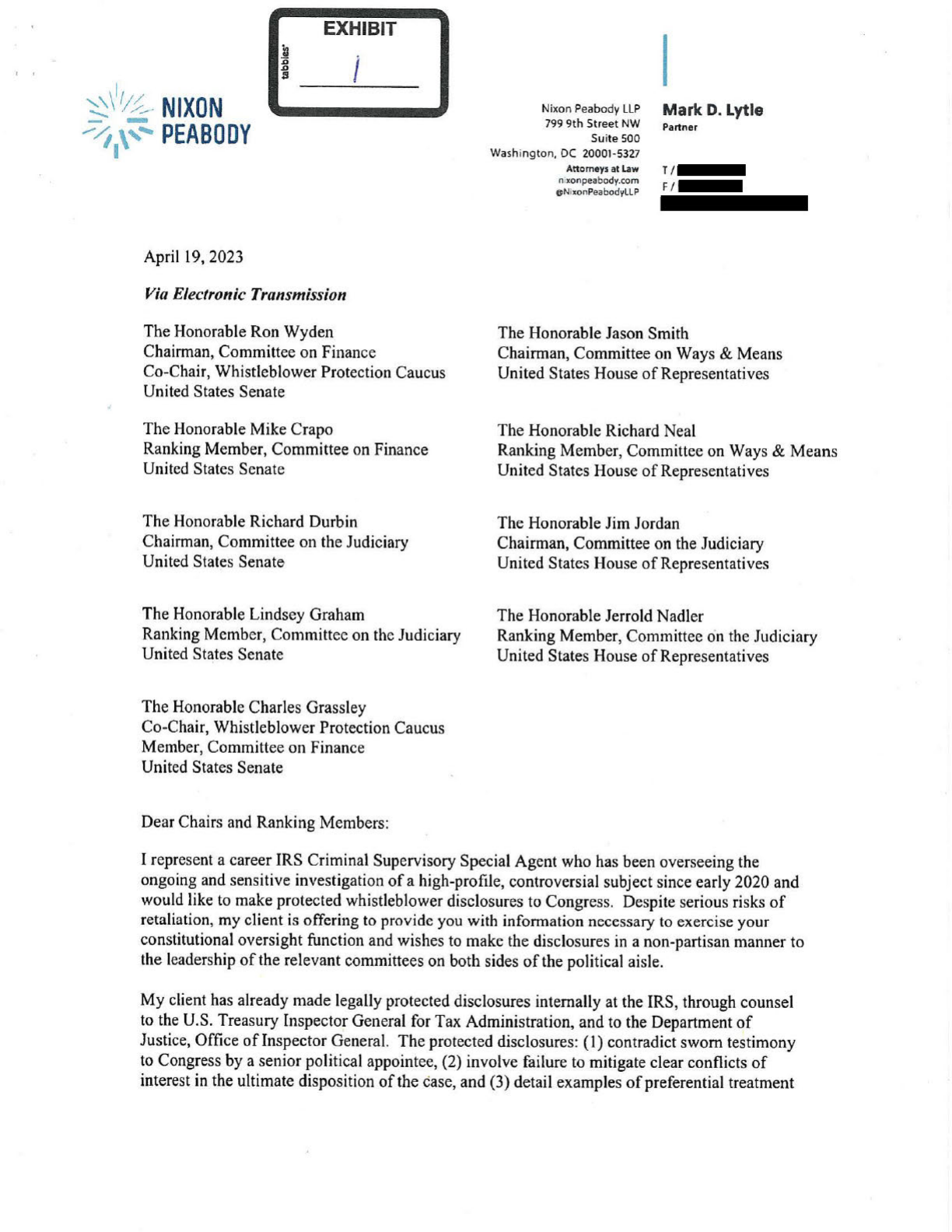


34
EXAMINATION
BY MAJORITY COUNSEL 1:
Q Do you recognize this document?
A Yes, I do.
Q What is it?
A This is the April 19th, 2023, letter sent to the chairs and ranking members
identified here by my attorneys Mark Lytle and -- oh, it's just from Mark Lytle.
Q And this is the initial reason why we're here today?
A This initiated what's happening, yes.
Q Okay. I'd like to talk a little bit about your background.
You mentioned, I believe, that you started at the IRS in 2009. Is that correct?
A Yes, that's correct.
Q And what is your educational background?
A I have an accounting and business degree from the University of Maryland,
and I have a master's in business administration from the University of Baltimore.
Q And before you joined the IRS, what did you do for employment?
A I was in the Office of Inspector General with the National Security Agency.
Q And when did you begin in that position?
A 2007.
Q Did you hold any other positions prior to that?
A Internships and stuff like that.
Q What was your motivation for joining the IRS?
A I always planned on going into law enforcement and I really had a desire to
serve. And that was why I went with the accounting degree and business degree and I

35
got my MBA, was for the purpose of getting that special agent job with the Federal
Government.
Q And you talked through sort of your history at the IRS during your opening
statement. Can you briefly summarize your roles and responsibilities in your current
position?
A Yes. So I oversee 12 agents. They are handpicked. They sit all across the
country. We work all high-dollar, complex, international cases. We work foreign
financial institutions. We do undercover operations and search warrants and all that
stuff in other countries and in this country.
And I'm responsible for reviewing all enforcement actions and recommendation
reports and case initiations and so on and so forth. That's like my main job as the
supervisory special agent of ITFC.
I'm also a representative in the Joint Chiefs of Global Tax Enforcement, working I
guess directly under the Chief of IRS CI. And it works with four other partner countries
in trying to collaborate and attack tax noncompliance on a global scale and share
information where we can legally.
Q And who do you directly report to?
A My current report is Assistant Special Agent in Charge Lola Watson.
BY MAJORITY COUNSEL 2:
Q Where does she sit?
A Washington, D.C.
Q She sits in Washington. And your office is in Baltimore?
A Yeah. I either sit in D.C. or Baltimore. I kind of split time.
Q Okay.
BY MAJORITY COUNSEL 1:
36
Q In the typical situation in the criminal tax investigation, what is your
understanding of the leadership and management structure at the Tax Division at the
Department of Justice?
A Well, with most of our cases, because they're complex and high-dollar and
they usually align with the very top priorities in the agency, we usually have Department
of Justice Tax attorneys that assist on the cases with us.
That's not typical for small cases, normal cases. But in our cases and in this
particular case, from the very beginning there were two Department of Justice Tax
Division attorneys working side by side with us the entire time. So they worked as
prosecutors alongside the AUSAs in Delaware.
And then ultimately what happens is the prosecution recommendation report that
is produced by Criminal Investigation gets sent to DOJ Tax. And they absorb that report,
and they usually put out a memo either approving, providing discretion, or declining.
And in the normal course, it's usually a pretty quick turnaround, 30 days, 45 days.
Q You mentioned two prosecutors in this case at DOJ Tax. Who are those
two individuals?
A At the beginning, it was Jason Poole and Mark Daly. And Mark Daly was
definitely the lead. Jason Poole took a different position at some point and Jack Morgan
took his spot.
Q And did those individuals sit in Washington, D.C.?
A I know Mark Daly does. I'm pretty sure -- yeah, Jack Morgan does as well,
yes, yes.
Q In the course of this investigation, did you interact with anyone else at the
DOJ Tax Division?
A I interacted with Jason Poole a lot, but in his new role, because he became

37
the chief of the Northern Division of the Department of Justice's Tax Division, and I had to
call him on several occasions concerning issues we were having.
MAJORITY COUNSEL 2. On this case?
Mr. Shapley. Yes.
MAJORITY COUNSEL 1. Okay. And in a typical case, what is IRS CI's relationship
with any given U.S. Attorney's Office?
Mr. Shapley. I'm sorry, can I add to my last question there?
MAJORITY COUNSEL 1. Please.
Mr. Shapley. So I also interacted with Stuart Goldberg, who I think is a Deputy
Assistant Attorney General, I think is his title, on a few occasions.
MAJORITY COUNSEL 2. And he's the head of the Tax Division?
Mr. Shapley. I believe he's the head of the Civil Tax Division and the head of the
Criminal is different, but there is not currently a person who's been confirmed there, I
believe.
Usually Stuart Goldberg would not be the person overseeing the criminal tax stuff.
It usually would go to the personal -- the Criminal Division.
MAJORITY COUNSEL 2. Is it fair to say he was the senior-most official in the Tax
Division?
Mr. Shapley. Yes. That's fair, yes.
BY MAJORITY COUNSEL 1:
Q On this investigation?
A That's correct.
Q Okay. What in a typical case would be IRS CI's relationship with the U.S.
Attorney's Office?
A On a case, we would talk strategy. We would go and get the evidence,
38
bring the evidence to them. We would be requesting to do, get certain document
requests from them.
There are things like search warrants and undercover operations that all go
through the United States Attorney's Office prosecutors. And generally, the way it
works is the agents go out and they get the information, and they have to be proactive in
doing so. And they bring that information to the prosecutor, and we kind of go forward
from there.
Q In your opening statement, you described prosecution team meetings. In
this case, individuals from which organizations participated in those meetings?

39
[10:32 a.m.]
Mr. Shapley. Sure, yeah. The prosecution team is the United States Attorney's
Office for Delaware, Department of Justice Tax Division.
At some point in time, a Department of Justice National Security Division attorney
came on.
MAJORITY COUNSEL 2. Who was that?
Mr. Shapley. McKenzie. Brian McKenzie.
And then it was FBI. And that was usually from the SSA to the case agents, and
there was around four or five of them.
BY MAJORITY COUNSEL 1:
Q Sorry. What's SSA?
A I'm sorry. Supervisory special agent, SSA.
And then it was IRS. And it was me, , and the co-case agent, Christine
Puglisi. And there was also an IRS CI agent out of the Philadelphia Field Office that was
working some ancillary issues, Anthony LoPiccolo, who would also participate in those.
And United States Attorney Weiss would be on those, but it wasn't scheduled.
He'd be on some -- pop in, pop out, that type of thing.
Q And is the structure of that prosecution team typical for a case of this size
and profile?
A It was -- we met more often, I think, because there were so many moving
parts. I wouldn't say that it's typical to have a prosecution team meeting every 2 weeks
in other cases. But it was just a way to get everybody at one spot at one time to have
the conversations.
Q And how did this specific investigation begin?

40
A So Special Agent was working on another case, and during that
case he found some reports that had some individuals' names in it. And it was basically
a case development tool he was using, and he looked at those and was seeing if he can
initiate criminal investigations on that list of people, and Hunter Biden was one of the
people on that list.
Q And from that stage, how does an investigation open? What's the process
around that?
A So the agent can write a PI evaluation report, and they send it to my level,
the SSA, supervisory special agent. And if it's a Title 26 case, it can just be approved and
put on our system.
Now, under a PI, it's kind of unique at IRS CI. There are only a few techniques
you can use, and it does [not] include third-party contacts and stuff like that.
So there's a whole other effort to make a subject criminal investigation, and that's
a more involved form, called the 9131, and it has a bunch of attachments. And really it's
an analysis of all the steps taken in the primary investigative phase.
And that 9131, in this case, if it's -- it goes forward to Department of Justice
Tax Division for approval and -- yeah, yeah. I'm sorry.
Generally. If it's generally like a 9131, if it's going to be a grand jury
investigation, request a grand jury investigation, generally a 9131 goes to Department of
Justice Tax Division, who approves it, and you're allowed to participate in that grand jury.
Q When a matter develops in this way, is there interaction on the civil side
related to civil audits? Are audits opened in connection with this process?
A Audits aren't opened in partner with a criminal investigation. Part of the
primary investigative phase, as one of the things you would do, you would request all the
information from IDRS, our internal system. That would include checks for audits and
41
things like that in the past, but there would be no request to initiate any civil activity.
It's actually the exact opposite. A form is issued that says -- the title of the form
is Suspend Civil Activity, and the subject's identifiers are included.
Q So in your opening statement you discussed tax years 2014 through 2019 for
this particular taxpayer. Do you know whether there are any issues related to 2020 or
2021?
A No. We never included that as part of the investigation.
We did get the returns, but we didn't.
[Shapley Exhibit No. 2
Was marked for identification.]
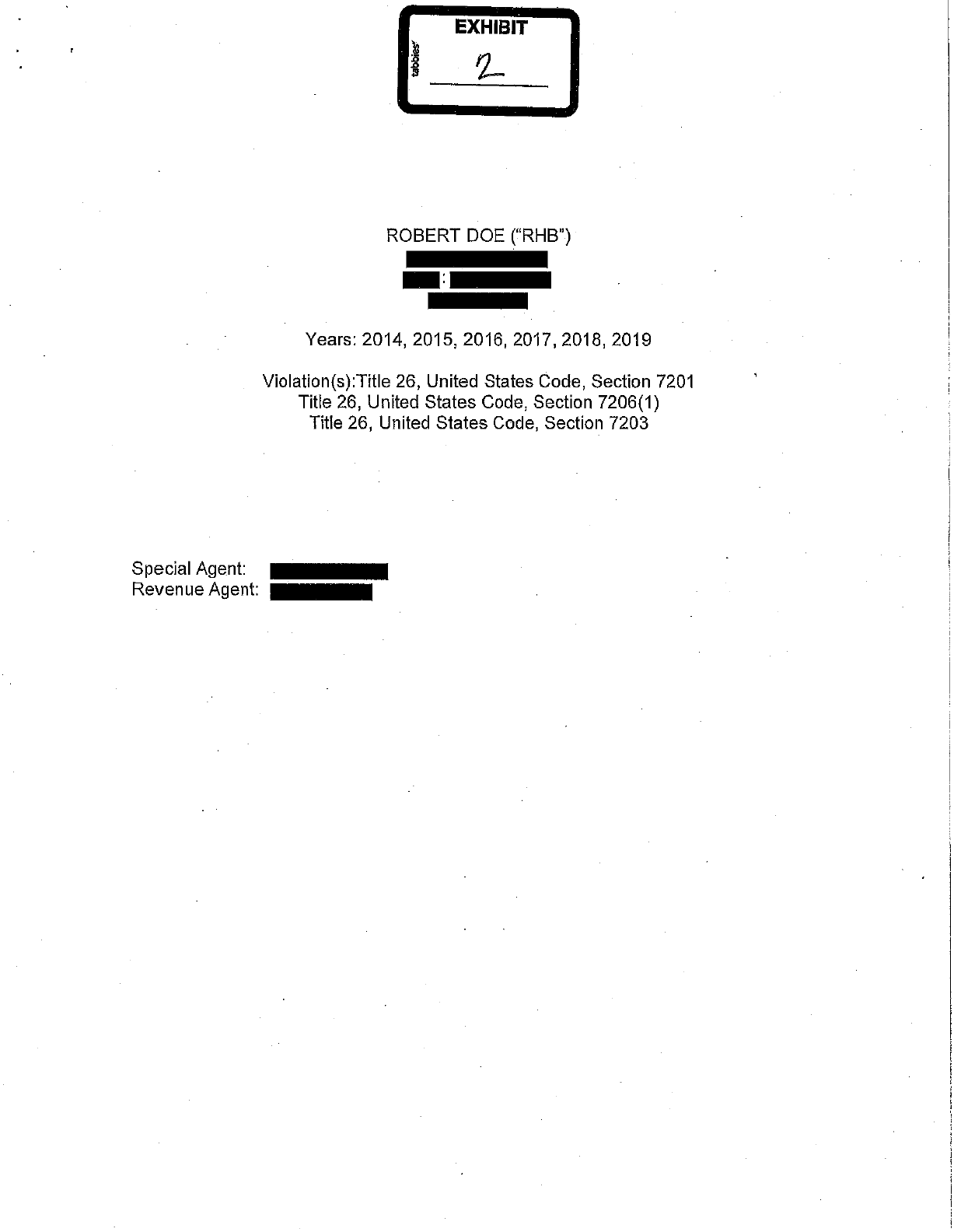
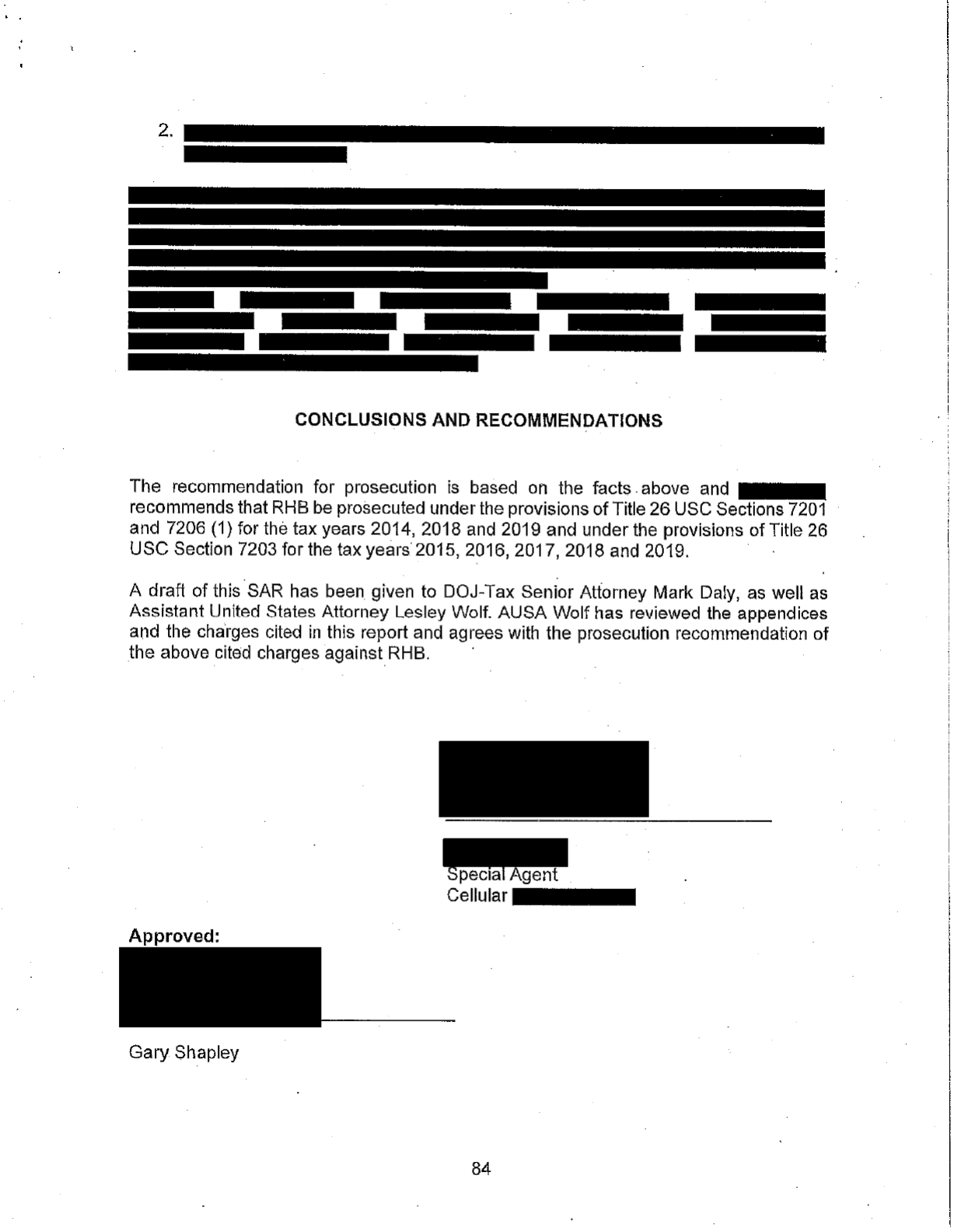
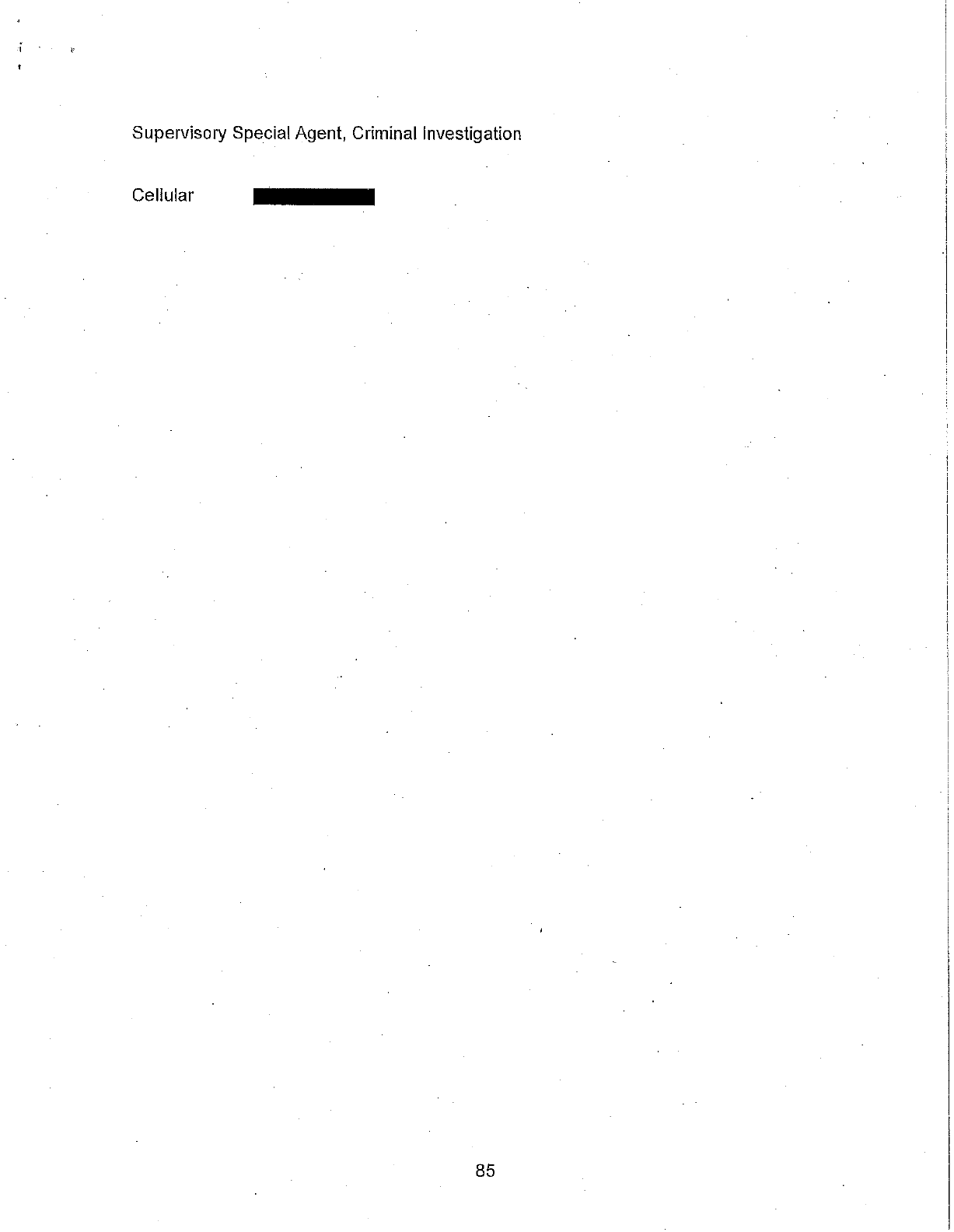

42
BY MAJORITY COUNSEL 1:
Q Okay. I'd like to talk now a little bit about the specific tax years at issue.
The document being handed to you is marked as exhibit 2.
Are you familiar with this document?
A Yes, I am.
Q What is it?
A This is the special agent report.
Q And who is the subject of this report?
A Yeah. To clarify the last response, it's an excerpt from the special agent
report.
Q And who is the subject of this report?
A So it says Robert Doe. That was the name that was put into our internal
system to attempt to keep anyone from revealing the name, and "RHB" stands for Robert
Hunter Biden.
Q And turning to the second page of the document, this excerpt includes the
"Conclusions and Recommendations" section. Can you describe the conclusions and
recommendations made in this report?
A Yes, I can. The report includes itemized elements of each violation for each
year up above it that I couldn't provide because of grand jury (6)(e) material.
This recommended felony tax evasion charges, that's 7201, is tax evasion, and
7206(1) is a false tax return, also a felony, for the tax years 2014, 2018, and 2019. And
for Title 26 7203, which is a failure to file or pay, that is a misdemeanor charge for '15,
'16, '17, '18, and '19.
Also under that is a paragraph that is common when we work directly with

43
Department of Justice Tax Division and AUSA so closely. We usually would give a
statement saying what they wanted as well at that time.
This report was reviewed extensively with Mark Daly, and also a lot with AUSA
Lesley Wolf, and each of them agreed with the recommendations as posed in this report.
Q Okay. And when was this document finalized and signed?
A It was, I believe, January 27th of 2022.
BY MAJORITY COUNSEL 2:
Q And can you just walk us through the process for this document? This is an
IRS document?
A It is, yeah.
Q And it is sent to who?
A Yeah. This document is a very robust document that includes everything
that we do. Internally it would go to CT counsel for their review. They provide a
memo, concur or nonconcur. It's just advisory. We don't have to follow what they say.
Q Did they concur?
A They nonconcurred.
Q They did not concur?
A Yeah. There was a portion in my opening statement that described that
event where the line attorney concurred with all charges and then it went to the national
office to review on sensitive case.
The panel at the national office agreed with the line attorney that it was concur.
And when it went up to their top two people at the CT counsel, they sent it back to the
line attorney and told her to change it to nonconcur.
Q Okay.
A So I'm not even sure. That could happen on occasion. What was
44
incredibly outside the norm here was that they usually tell us, and we ask them to tell us
if anything is going to be a nonconcur. And all along they were saying it's a concur, it's a
concur -- with all charges. It was green for 2018, yellow for other years, which is all in
the concur range.
And when we got the nonconcur, I went to my special agent in charge who called
the line attorney's supervisor and she said, it's always been nonconcur.
And then it was really incredible that that statement was made, and maybe only
IRS CI geeks care about that. But then we communicate in an instant message that's
captured with the line attorney saying, "They are telling us that this has always been a
nonconcur," and she's like, "What, no, no. It was a concur when I sent it up."
So for some reason, that got miscommunicated.
Q Was any feedback provided as to why?
A There's a robust document that was created by CT counsel -- I spent time
rebutting it, but there was nothing that we hadn't considered in the investigative team
with the prosecution team for the 3-plus years we'd been investigating.
Yeah, and this advisory. Yeah, it is, I would say, 90-plus percent of everything
that I do in my international tax group is nonconcur by CT counsel, and we ignore what
they say.
So then this report goes, after that, to the Department of Justice Tax Division.
It's transmitted to them. And that's when they take it and they review it. And usually
it's approve, discretion, or declined in a normal course. But we sent it to them on
February 25th of 2022, and I have yet to see an approval, discretion, or declination.
Q And what's the U.S. Attorney's Office in Delaware's role with this particular
document?
A So it's just to help advise them. After DOJ Tax, if they approve a charge,
45
then that's DOJ Tax saying that you have to charge it. And if the United States
Attorney's Office, they can say, "We don't want to charge it here," but DOJ Tax then has
to go and charge it. They have the authority to do so.
Q So did the U.S. Attorney's Office in Delaware concur with this?
A They would never have [to as part of the process, but] they did when it was
written, right? They were on board with all the charges when it was written. But there
would never be an official time where we requested their concur or nonconcur.
Q So did they review it before you submitted it to DOJ?
A Oh, yes, yes.
Q Okay.
A Yes.
Q And they had an opportunity to make suggestions or --
A Yes.
Q -- tell you to tweak things?
A Yes.
Q And they didn't.
A Well, we did, but --
Q The final document though --
A Yeah.
Q -- they concurred.
A The final document was a compilation of everyone's understanding of what
the evidence said and what should be charged.
Just a little bit more about this document. I mean, this document is around – it’s
incredibly robust. So I think it was around 85 pages, just the report, and it goes through
the theory of investigation. And then it goes, like I said, into each year and each
46
element.
And it's each piece of evidence in each element, and it's cited to evidence. So
this report, in reality, crashes my computer every time it comes up because it includes all
the evidence attached to it. It's like 8-, 9-, 10,000 pages of evidence and documents.
It's an incredibly robust document.
[Shapley Exhibit No. 3
Was marked for identification.]
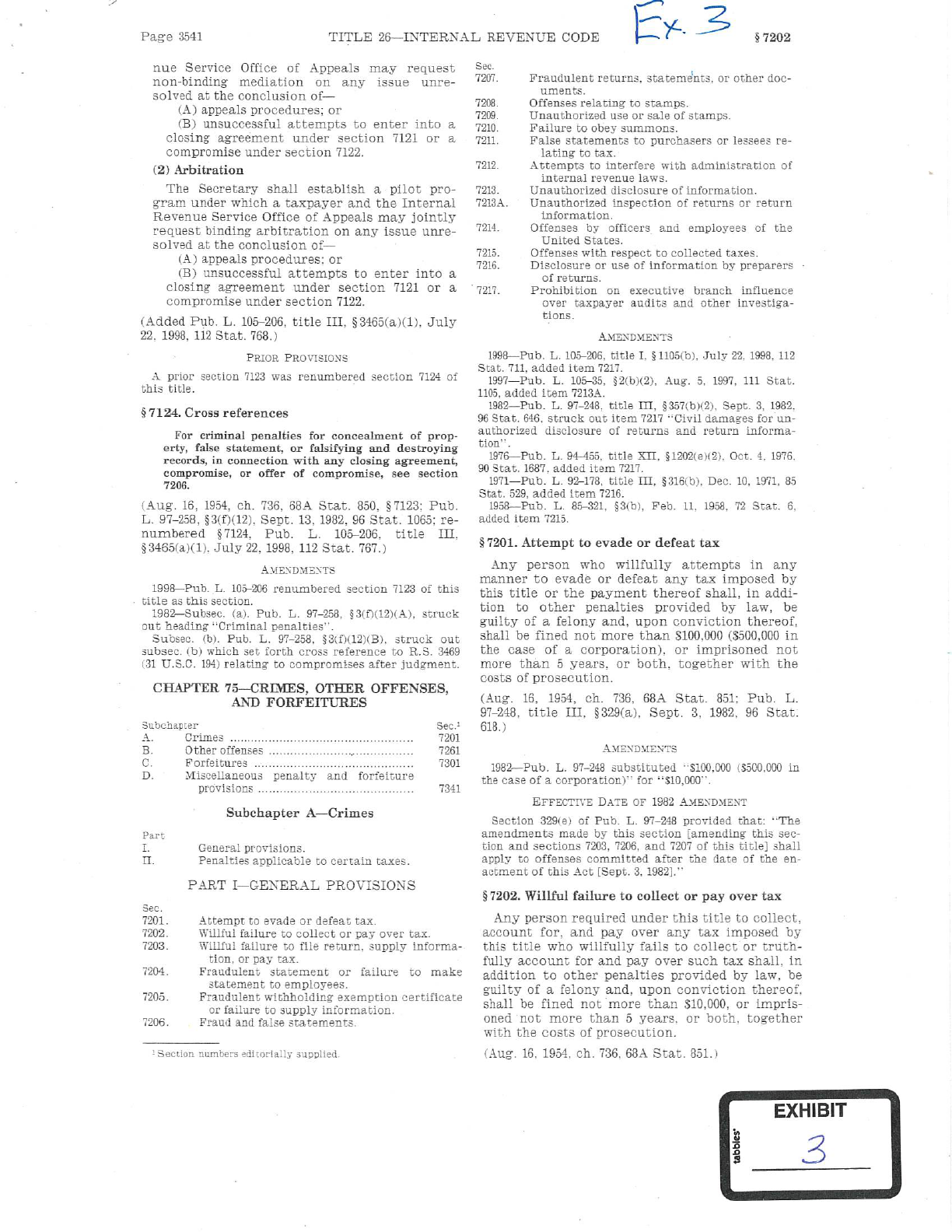
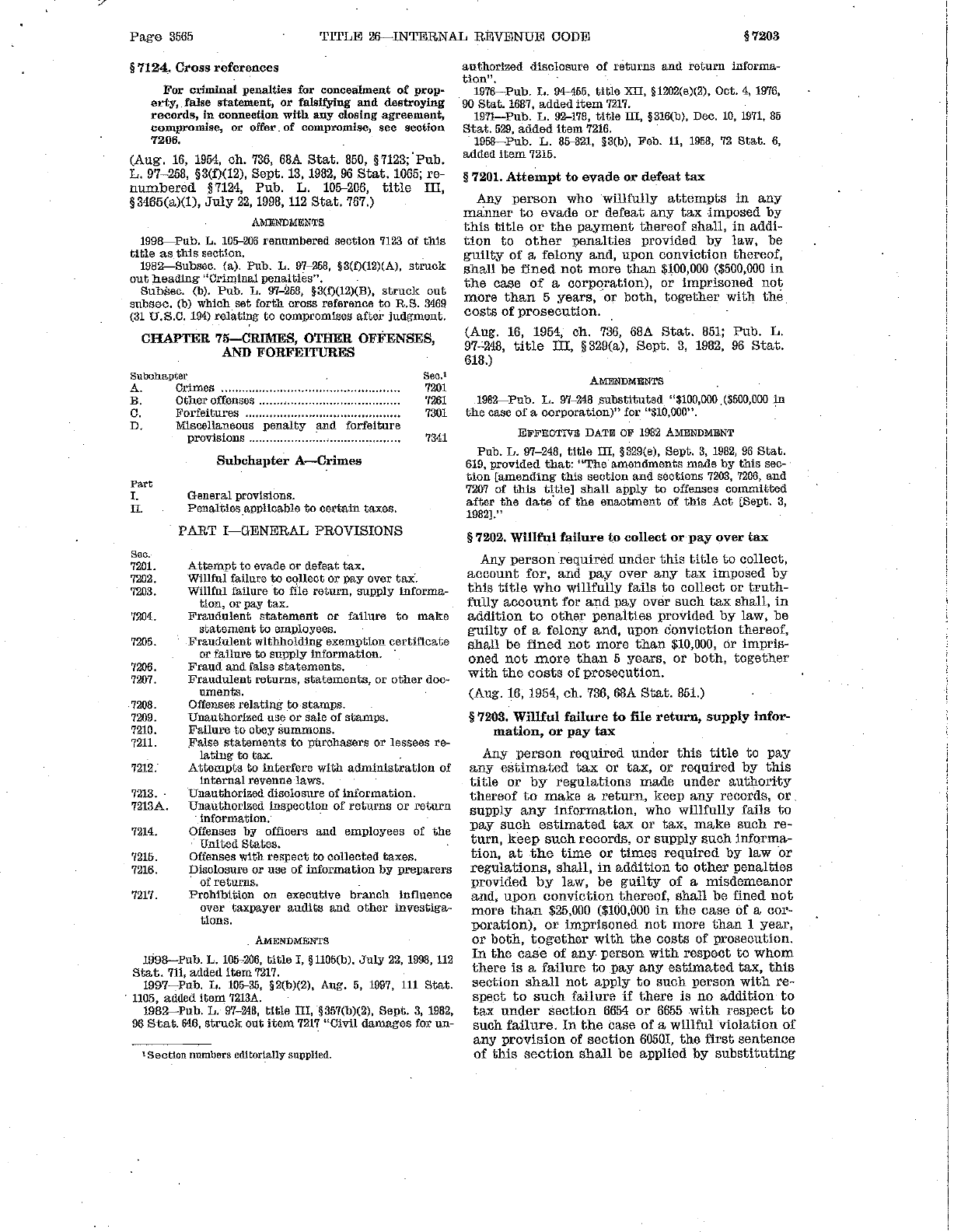
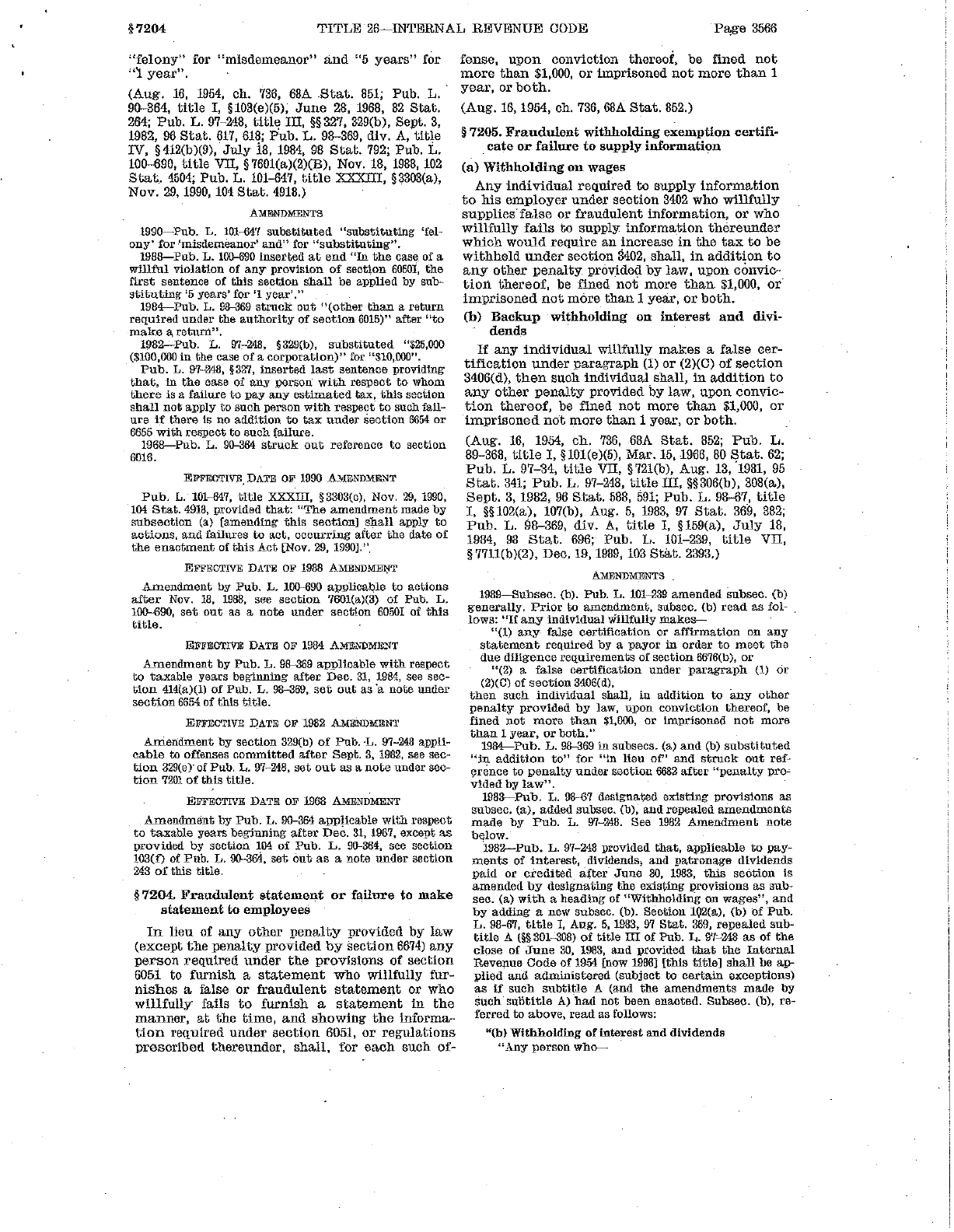

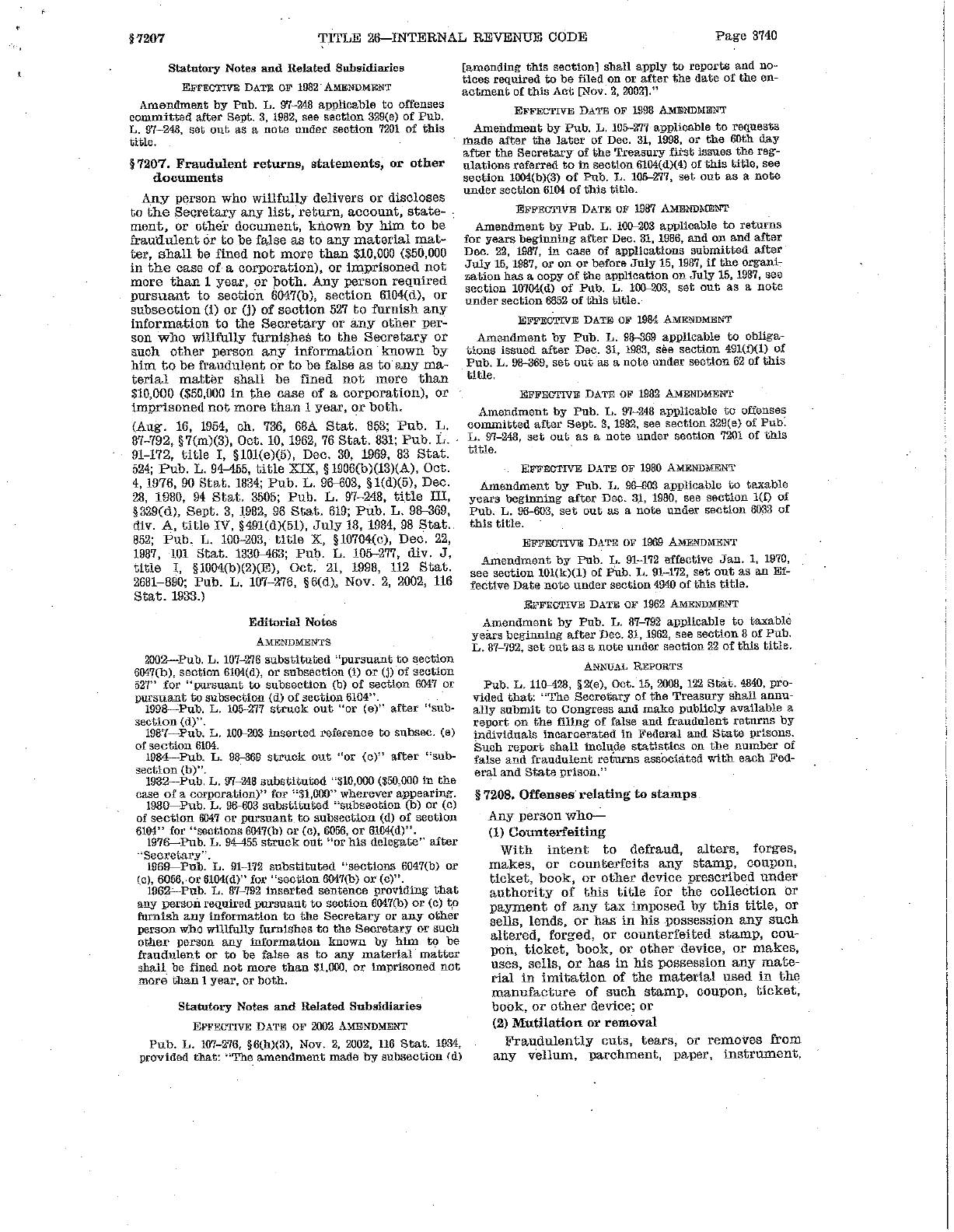

47
BY MAJORITY COUNSEL 1:
Q Okay. The document just handed to you is being marked exhibit 3. I’ll
give you a moment to look it over.
A Oh, okay, yes. Okay.
Q So this document contains the relevant statutory citations included in the
special agent report document you just looked at, and I'd like to walk through each of the
relevant statutes briefly.
A Okay.
Q 26 U.S.C. 7201 covers attempt to evade or defeat tax. Is that correct?
A That is.
Q What are the elements of a 7201 offense?
A So the elements are affirmative acts of evasion. They are that there's a tax
due and owing and -- I'm not used to reading it in this setting, so I'm sorry. So it's willful
attempts in any manner to evade or defeat any tax imposed by this title or the payment
thereof. There has to be tax due and owing. And the willfulness is a voluntary,
intentional violation of a known legal duty. And those are the elements.
Q And what is the statute of limitations for this offense?
A It's 6 -- this says 5 years. Did that just change? It was 6 years -- 6 years
from the date. Yeah. This says 5 years.
MINORITY COUNSEL 2. No, that's the prison sentence.
Mr. Shapley. Oh, thank you very much.
Yeah, the statute of limitations is 6 years from when the return is filed or of an
affirmative act of evasion that could occur after the filing of the tax returns.
BY MAJORITY COUNSEL 1:

48
Q Okay. And based on the conclusion in your report, the elements for that
offense were met in tax years 2014, 2018, and 2019. Is that correct?
A That's correct.
Q Okay. 26 U.S.C. 7203 covers willful failure to file, to supply information, or
pay tax. Is that correct?
A It is.
Q And what are the elements of a 7203 offense?
A So that's that you had a requirement to file and that you had the knowledge
that you did have to file, is how I know it. I mean, would you --
Q That's okay, you don't need to read the whole thing.
BY MAJORITY COUNSEL 2:
Q Yeah, we're just giving you the statute. And this isn't a pop quiz.
A Yeah, sorry, yeah.
Q We're just trying to understand what the elements of these crimes are --
A Yeah.
Q -- what the statute of limitations is and so forth. And since this is not a pop
quiz, we just thought we would provide this as a resource.
A Yeah. I never see it in this format.
BY MAJORITY COUNSEL 1:
Q Understood.
And what's the statute of limitations for this?
A It's 6 years.
Q And based on this report, elements for that offense were met in 2015, 2016,
2017, 2018, and 2019. Is that correct?
A That's correct, yes.
49
Q And same exercise, 26 U.S.C. 7206 (1) covers fraud or false statement. Is
that correct?
A It is.
Q And what are the elements of a 7206 (1) offense as you understand it?
A So that there's a material misrepresentation of an item on that tax return,
that they subscribe to that under penalties of perjury, and the willfulness and knowledge.
Q Okay. And what is the statute of limitations for that offense?
A It's 6 years.
Q And the elements for that offense were met in tax years 2014, 2018, and
2019. Is that correct?
A That's correct, yes.
Q Is the tax liability at issue here related to just the individual taxpayer or to
related companies controlled or that the taxpayer's --
A These charges include related companies as well.
Q Okay. Can you tell us which companies were involved?
A Yeah. He was responsible for filing personal income tax returns as well as
returns for Owasco P.C.
Q And is there anything you can tell us about Owasco P.C., as far as what is the
company, what does it do?
A Oh. So Owasco P.C., through the evidence that we obtained, was basically
created with his partner Eric Schwerin. And the crux of this, as I understand it, is that
Hunter Biden had a history of noncompliance with his taxes, and he would often get large
sums of money and wouldn't withhold.
So Owasco P.C. -- was initially for the -- the whole purpose was, Eric Schwerin
came in to help him with his tax situation so it didn't continue to be a problem in the
50
future.
So all of his consulting fees and all that type of stuff would go into Owasco.
There would be withholdings from it. So then he didn't get -- when he filed his tax
returns, they had withholdings to offset the taxes that he owed for that year.
Q Okay. Were there any other companies that you looked at in connection
with this investigation?
A Yes.
Q A lot?
A Yes, a lot.
Q Okay. The U.S. House Committee on Oversight and Accountability has
publicly identified a series of companies, mostly LLCs, that are connected to this taxpayer.
I'd like to walk through a list of those companies and just ask whether any of these
companies were part of your investigative work.
Lion Hall Group, LLC?
A Yes.
Q Owasco P.C.?
A Yes.
Q Robinson Walker, LLC?
A Yes.
Q Skaneateles, LLC?
A Yes.
Q Seneca Global Advisers, LLC?
A Yes.
Q Rosemont Seneca Partners, LLC?
A Yes.
51
Q Rosemont Seneca Principal Investments, LLC?
A Yes.
Q Rosemont Realty, LLC?
A Yes.
Q Rosemont Seneca Technology Partners, LLC?
A Not a hundred percent sure on that one.
Q Rosemont Seneca Thornton, LLC?
A Yes.
Q Rosemont Seneca Advisors, LLC?
A Yes.
Q Rosemont Seneca Bohai, LLC?
A Yes.
Q JBB SR, Inc?
A I'm not sure of that one.
Q RSTP II Alpha Partners, LLC?
A Yes.
Q RSTP II Bravo Partners, LLC?
A Yes.
Q Owasco, LLC?
A Yes.
Q Hudson West III, LLC?
A Yes.
Yes. Sorry.
Q Hudson West V, LLC?
A I'm not sure about V.

52
Q CEFC Infrastructure Investment U.S., LLC?
A Yes.
Q And in your line of work, are you familiar with what a form 1023 is?
MAJORITY COUNSEL 2. FBI form 1023?
Mr. Shapley. I don't know that form.
BY MAJORITY COUNSEL 1:
Q In the course of your investigation, did any FBI agent ever make you aware
of a form 1023 related to Hunter Biden or any of his family members?
A We never discussed the form.
Q Okay. I think in your opening statement you discussed the jurisdiction in
which the crimes we were just discussing took place, and you stated the District of
Columbia. Is that correct?
A For 2014 and 2015, yes.
Q Okay. And Central District of California? Is that correct?
A That is correct.
Q Any other jurisdictions?
A The -- no, no. I mean, there was a possibility of some, but it was always
that those were the strongest, those were the ones that should be.
Q And those are the jurisdictions related to the recommendations in the
special agent report excerpt that we looked at earlier?
A Yes, that's correct.
Q And are you able to share details or estimates of the scope of the liability the
taxpayer had to the U.S. Government or the loss to the U.S. Government in each of these
tax years?
A I probably couldn't itemize it off the top of my head, but altogether it was
53
around $2.2 million.
Q Spanning 2014 through 2019 tax years?
A Yes. And that only includes tax liabilities that were determined on a filed
tax return, because there's still unreported income in 2014 that there's no way to collect
because the statute of limitations is gone.
Q Okay. So let's talk about that.
So you stated earlier that at the October 7th, 2022, meeting there was only 1
month remaining to collect taxes owed for tax years -- for tax year 2014. Is that correct?
A To charge.
Q To charge?
A Yes.
Q For tax year 2014?
A I believe it was '14 and '15.
Q '14 and '15. Okay.
Do you know or can you clarify whether there was a deadline for collecting those
taxes?
A I don't know if I understand your question. Sorry.
Q Is the deadline for collecting taxes the same as the statute of limitations
period for the crime?
A The deadline to collect, I guess, is what I'm confused about. Like when the
tax return is filed, even if it's only an extension and they're going to extend it, they have
to pay the tax due and owing by the due date of the return.
And then if someone was charged and there was, say, a $2.2 million tax due and
owing, it would be the courts that define when the payments are made as part of the
sentencing.

54
Q Okay. Understood.
MAJORITY COUNSEL 2. Was the statute about to run, though? You talked
about the October 7th, 2022, meeting.
Mr. Shapley. Yeah. The statute was about to blow in March of 2022. And
Department of Justice Tax Division and the U.S. Attorney's Office in Delaware were
saying, "Get us the report, get us the report, get us the report." They were pushing
really hard to get the report to them because they wanted to go to defense counsel and
say that it's been recommended, because they were hoping to initiate conversations.
Their plan was, was to go to D.C. and to charge pretty soon thereafter, which is
why they requested discovery from all the agents at that time. But what happened was
the defense counsel said, "Whoa, whoa, whoa, whoa, don't charge, we'll sign statute of
limitations waivers."
Mr. Lytle. Extensions.
Mr. Shapley. Extensions. I'm sorry. Statute of limitation extensions. So I
believe at least two of those were signed by defense counsel, and the prosecutors told us
that they were willing to sign that, more of them, but they just didn't request it after the
November limitation expired.
BY MAJORITY COUNSEL 2:
Q Do you know when the extensions were signed and for what tax years?
A Well, these were specific to 2014 and '15 because the statute of limitations
were expiring.
Q Okay.
A And they -- didn’t -- they just wanted to say, "Well, don't indict, my guy, like,
we'll talk to you about it, we'll sign the extensions, and then you can --"
Q And how long were the extensions good for?

55
A I believe it was 6 months, each extension, but I'm not a hundred percent on
that. They could -- maybe they could being be defined as well. I'm not -- because I
know they signed at least two, and the last one was expiring in November of 2022.
Mr. Leavitt. So they were shorter than 6 months.
Mr. Shapley. Yeah, so they might be shorter than 6 months.
MAJORITY COUNSEL 2. And ultimately the statute ran?
Mr. Shapley. It was a conscious decision by DOJ to let that run. They could've
had them extend '14 and '15, but they said no.
MAJORITY COUNSEL 1. And when you say DOJ, who, in your opinion, ultimately
made that decision?
Mr. Shapley. So, it had to be United States Attorney Weiss. I don't know
personally, but that's how it would usually work.
BY MAJORITY COUNSEL 2:
Q It's not DOJ Tax?
A In this case no. The U.S. Attorney's Office would likely take the lead. But
then again, that's just based on my experience and how it would usually work, how I've
seen it work.
Q And can you give us any more information about the statute running in that
particular instance?
A I mean --
Q Did you get any feedback from the U.S. Attorney's Office as to the
blow-by-blow between their office and the taxpayer's lawyers?
A They weren't very transparent with the interactions with defense counsel.
I just know that in March when D.C. said no we still had that belief that he had some
authority, because we were doing a lot of work to try to, like, overcome whatever issues

56
D.C. said that they had with the report.
And we thought that he still had the authority to charge. And then October 7th
meeting comes and he said we couldn't charge it there, and he requested special counsel
authority. It was denied. So there was really no ability to charge it there. He had no
mechanism to charge it if what he said actually happened. So they let the statute
expire.
MAJORITY COUNSEL 1. Okay. I'm going to talk about specific issues in specific
tax years to the extent you're able. I know you said that special agent report was a very
robust document. And if you don't know or you don't recall the answers, that's totally
fine.
For tax year 2014, what evidence led to the recommendation for charges for
attempt to evade and false statement?
Mr. Lytle. Can we just have a sort of an understanding that he can't speak about
grand jury materials and protected (6)(E) just so it's clear that way?
MAJORITY COUNSEL 1. Absolutely. And if that's an issue, we'll certainly defer
to you on that, what can and can't be talked about.
Mr. Lytle. Great.
Mr. Shapley. So, is the question for specific evidence or more of a theme of
evidence?
MAJORITY COUNSEL 1. Let's start with a theme.
Mr. Shapley. So concerning the Burisma income, Hunter Biden basically used a
nominee organization, Rosemont Seneca Bohai -- which a convicted felon was the partner
of.
MAJORITY COUNSEL 2. That's Mr. Archer?
Mr. Shapley. Yes. Yes, Devon Archer.
57
And so the way the money worked is there's a document which is the contract
between Burisma and Hunter Biden. Those are the two parties. It was for $1 million
per year. Of course this was 2014, and it was negotiated in April, so the payments in
that year were reduced by the months. So it was $666,000, $83,000 a month he was
receiving.
What Hunter Biden did with that is he told Burisma to send that income to
Rosemont Seneca Bohai. And then when the money came back to him, he booked it as
a loan.
So there's all this machinations of nonsense happening over here in this nominee
structure that, "Oh, this is complex, this is complex," and, well, it's not complex, because
this is -- it was a taxable event as soon as the income came from Burisma to Hunter Biden.
And whatever he did with it after it was really just a scheme to evade taxes for that year.
And to add to it, is that Rosemont Seneca Bohai and Archer, when the money
came back to Hunter Biden, they booked that as an expense on their books. So even the
two parties didn't treat it the same way.
And then Eric Schwerin realized this and looked into it, and he even told
Hunter Biden on multiple occasions, multiple communications, you need to amend your
2014 return to include the Burisma income. And he never did, and the statute's gone
now.
[Shapley Exhibit No. 4
Was marked for identification.]
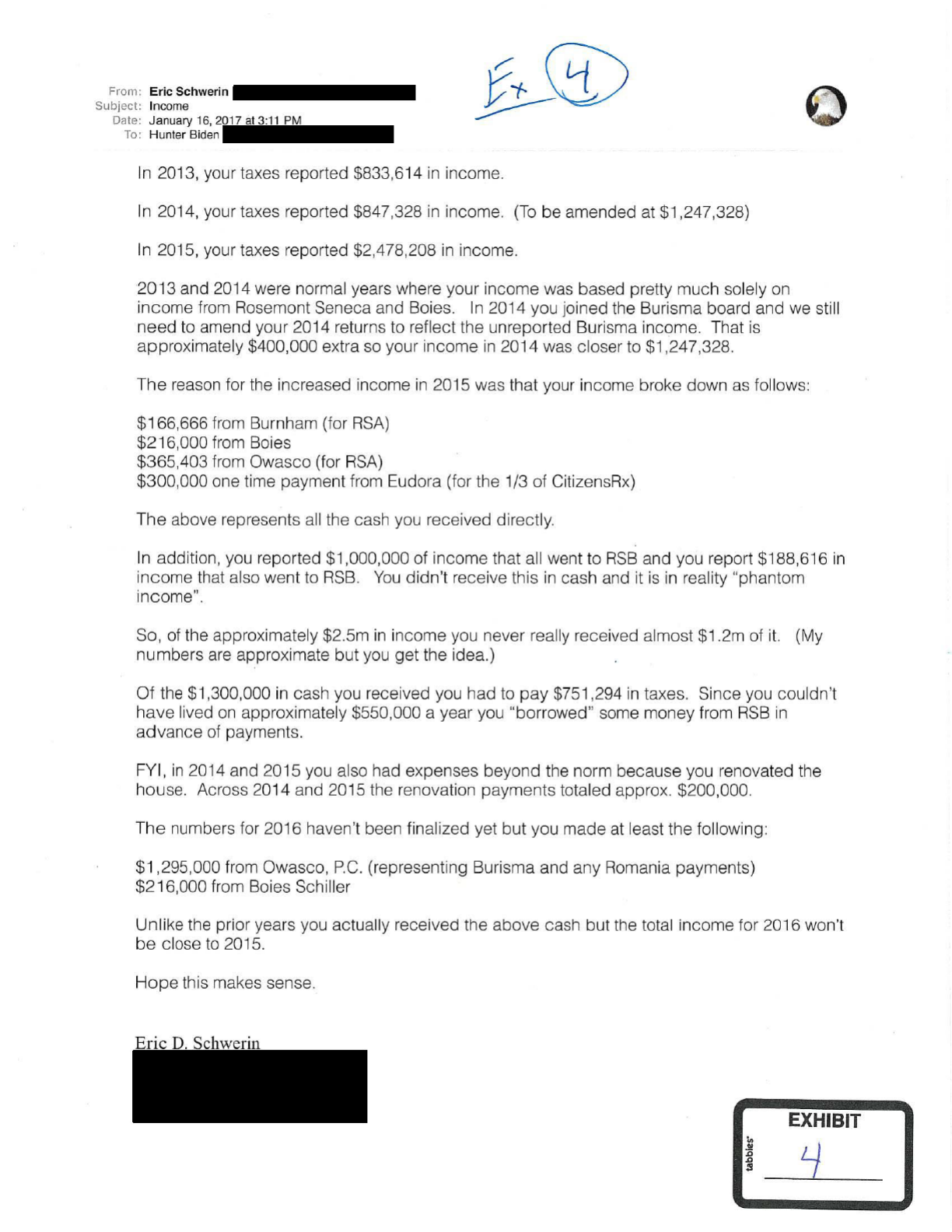


58
BY MAJORITY COUNSEL 1:
Q What's been handed to you has been marked as exhibit 4. I'll give you a
moment to review it.
A Yep.
Q Have you seen this document before?
A I haven't seen it in this form, but I've seen excerpts of this document.
Q Is this one of the communications you were referencing just a moment ago?
A I believe so, yes.
Q And it looks like it's about the fourth paragraph down, it reads: "In 2014
you joined the Burisma board and we still need to amend your 2014 returns to reflect the
unreported Burisma income."
Do you see that?
A Yes.
Q And is that consistent with your understanding of the issues in the 2014
return?
A Yeah, this is. This is accurate, yes.
Q Is there anything else on this document that stands out to you as significant?
A Well, what's important to note here as well is that Owasco was set up for
this exact reason, was to take in these type of consulting fees and to withhold taxes from
it. And Hunter Biden communicated with several folks that he wanted to keep this
outside of the D.C. people, and we believe that to be Eric Schwerin and Owasco, and the
purpose was to evade income taxes on that, in my understanding of the evidence. So,
that's kind of like laid over this as well.
And then when Eric Schwerin realizes there's money coming in, Hunter Biden is

59
telling him, "No, this is a loan, it's a loan, it's a loan, it's a loan," and then eventually
Eric Schwerin is talking with Momtazi, who is the accountant for Devon Archer and
Rosemont Seneca Bohai, and they start talking. And that's when Eric Schwerin realizes
that this is actual income, and he's like, "We're going to have to book this as income."
And there's multiple communications in the evidence that talk about that.
MAJORITY COUNSEL 2. So this was an affirmative scheme by the taxpayer to
avoid paying taxes?
Mr. Shapley. This is, like, textbook, I learned at basic training nominee stuff.
And in all of the defenses, it was a loan, got to have a promissory note, you got to have
defined interest, and you got to have repayments, and none of those were included.
And we raised that to DOJ Tax, and in one particular instance to Jack Morgan,
specifically saying this is not a loan. We don't have these three things. In any case,
these are the things we determine if it's a loan or not, and he said that this is not a typical
case.
MAJORITY COUNSEL 2. And do you think "This is not a typical case" referred to
the fact that this was the Vice President's son?
Mr. Shapley. Yeah, yeah. I think that there was -- every single time the process
could be bogged down by deferring to some other approval level, they took full
advantage of that.
[Shapley Exhibit No. 5
Was marked for identification.]

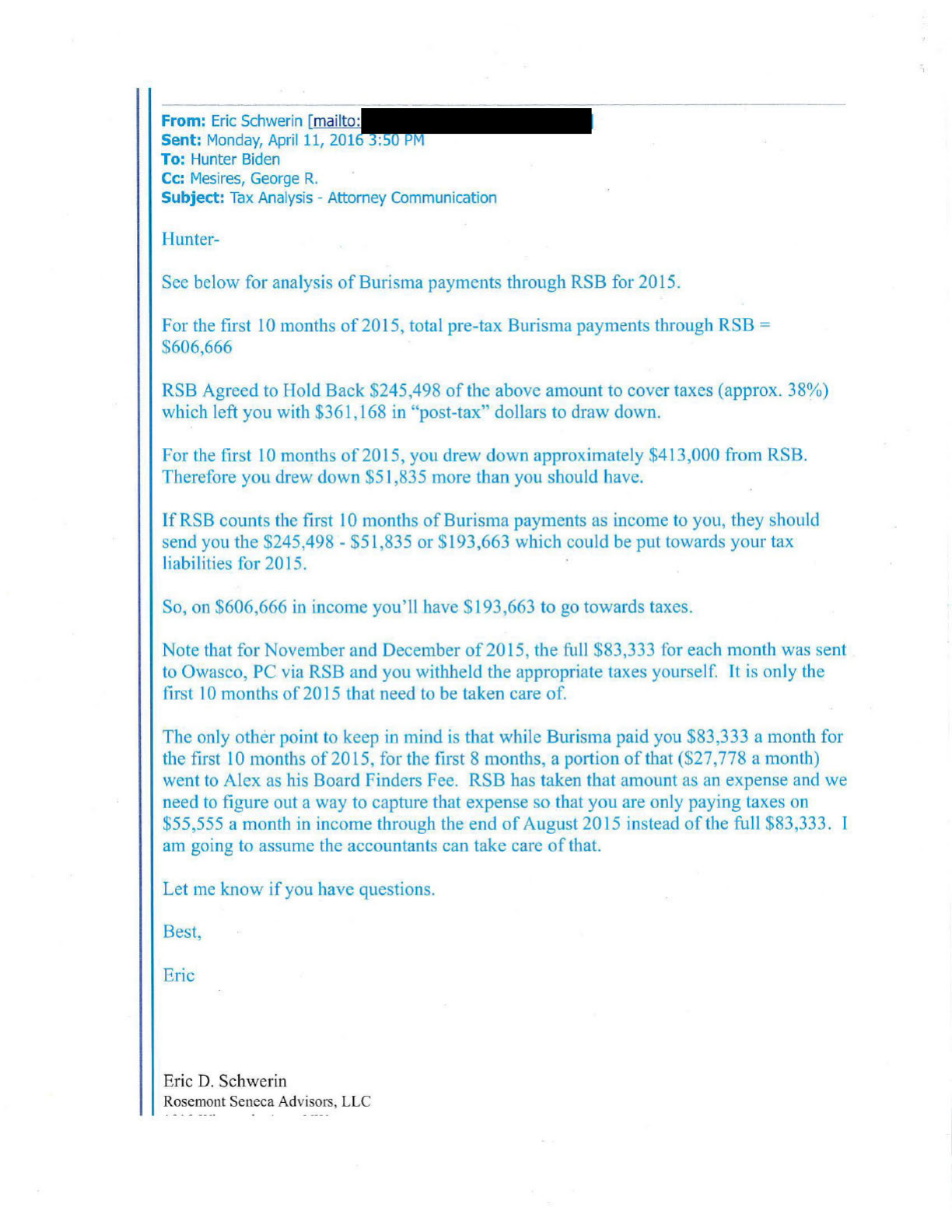


60
MAJORITY COUNSEL 2. We've just given you exhibit 5. I think it's more email
communication with Schwerin and Hunter Biden's lawyer, George Mesires, partner at the
Drinker Biddle firm or whatever the firm's called now, Faegre.
Have you seen this document before?
Mr. Lytle. Can we talk to our client just briefly.
MAJORITY COUNSEL 2. Of course. We can go off the record.
[Discussion off the record.]
MAJORITY COUNSEL 2. We're back on the record.

61
BY MAJORITY COUNSEL 2:
Q The question is whether you've seen this document before.
A No. Anything from George Mesires was considered privileged --
Q Okay.
A -- attorney-client privilege and was not provided to us.
Q Okay. And so that was kept from you by the FBI?
A No. It would be a filter team.
Q Okay.
A When we get any information, and even from the laptop and hard drive, it
went through filter reviews, and we only saw what came back as nonprivileged.
Q But who ran the filter team?
A It was different each time. We had agents assigned, groups of noninvolved
agents assigned that were --
Q With IRS or FBI?
A It was a little bit of both. I think that we took turns. I remember at least
two different filter teams made up of noninvolved IRS agents.
Q Okay.
A And these eventually go to the prosecutors, like after the filter review.
Q Okay.
Mr. Lytle. I'm sorry. Is there DOJ attorneys assigned to the filter team as well?
Mr. Shapley. Yes, yes.
BY MAJORITY COUNSEL 2:
Q Okay. On page 2 -- it's an email chain, so it actually starts from the last
page and works forward. The communication here is Eric Schwerin to Hunter Biden,
correct?
62
A Appears so, yes.
Q And Eric Schwerin is not Hunter Biden's lawyer, correct?
A That's correct.
Q Okay. So you think they marked this attorney-client privilege just because
they cc'd Mesires?
A Absolutely.
Q Okay.
A That was one of the things, just a search term was the known legal counsel
and just immediately went to --
Q So if he cc's Mesires on every communication, it's all privileged?
A That was the direction to the filter teams, and then it would go to the DOJ
attorney that oversaw that, and they would make the ultimate decision.
Q Okay.
A But they basically claimed privilege on a huge amount of information to
include the return preparers, Morgan Wingate, later on, and they said it was because
they had a verbal Kovel agreement with them.
Q Okay.
A A Kovel agreement, do you want me to explain? So I think it's from case
law and it's basically that a defense team can bring in an accountant or CPA or return
preparer into the defense team to assist them, so they become covered by the
attorney-client privilege.
In this case, when we were attempting to interview the CPAs on it, Hunter Biden's
legal team said there's a verbal Kovel team so you can't talk to them.
And we tried to get DOJ and U.S. Attorney's Office to pierce that, because
everyone, even they said it was nonsense. But they just wouldn't. It took, like, 12

63
months to finally get to the CPAs to actually get information from them.
Q Okay. Looking at the content on page 2, if you and your team had access to
this information, would that have been helpful, direct communication from Schwerin to
Hunter Biden? And you previously told us that one of Schwerin's main functions was to
help ensure that Hunter Biden was paying his taxes correctly, right?
A Yeah. I’m not reading it -- I haven't read it all, but any discussions in this
area, we need to know, we need to know that if it's truly a loan, then we can't include it.
We need all the pieces of information that discuss income, which is why it's so important
to ask about 10 percent for anybody else.
MAJORITY COUNSEL 2. Let's go off the record for a second.
[Discussion off the record.]
MAJORITY COUNSEL 2. Back on the record.
BY MAJORITY COUNSEL 2:
Q Now, was your team, were they permitted to use open-source methods for
looking at the materials for this case? Like, if materials were published on the internet
related to Hunter Biden or related to Hunter Biden's business concerns, were you allowed
to consult that?
A No. We were directed that if there's anything from the laptop from other
sources to not look at it because then it's potential for it to be tainted.
Q Okay. So if it's posted on the internet, if it's written about in the
newspaper, you were not allowed to consult that open source method?
A Yeah. We were directed not to.
Q Is that customary?
A I would say yes. Yes.
Q Okay. Going back to the special agent report, after you submitted the
64
report recommending charges, could you just walk us through the timeline of what then
happened?
A From?
Q You told us about what happened inside of IRS.
A So February 25th, 2022, forward?
Q Correct.
A So we sent it to DOJ Tax Division, and that spurred their discussions with
defense counsel. We did not participate in that.
And I would say that I think it's not typical for the investigative team and the
agents to never be in on proffers or reverse proffers with defense counsel. We never
once were allowed to do so.
And even though some communications occur with defense counsel without
agents, I've never seen it where we've never been involved.
Then it went to D.C. U.S. Attorney's Office. Department of Justice Tax Division
authored a 99-page memorandum that was requested by Stuart Goldberg. And my
understanding is that it was for the purpose to support recommending that they move
and be opened in D.C. It was like a document to support opening up and charging in
D.C. for 2014 and '15.
Q Okay. So you send what's exhibit 2, or the IRS sends it to DOJ Tax, and the
result was DOJ Tax Division produced a 99-page memo to support what your memo had
recommended?
A I never saw it, but my understanding was, is that we were moving -- we were
going to go to D.C., and we were going to charge, and here's the discovery. That was the
trajectory there. So I've never seen the document, but it's been described to me as
supporting those years and charging those years.

65
Q Do you feel like the document was kept from you and your team?
A Yeah. I don't know there's any reason not to share it with us. I don't
know why. And it's also outside the norm. When a SAR goes to DOJ Tax, it usually
gets -- if there's DOJ Tax attorneys working on that case, they -- those attorneys aren't the
ones that get the report. It's like a third-party supposedly objective person who looks at
the report and writes up whether it's approved, discretion, whatever.
This whole 99-page report was a whole separate event, and John Kane at
Department of Justice Tax Division was assigned to be the objective reviewer, and I still
have never seen a report from him approving, discretion, or declining.
Q Okay. So, after receiving the 99-page memo from DOJ Tax, the U.S.
attorney in Delaware initiates prosecution in the District of Columbia, correct -- or he
seeks permission from --
A Yeah, they send --
Q -- U.S. Attorney Graves?
A -- at least Mark Daly and I believe AUSA Wolf as well, to meet with the first
assistant in D.C., and the first meeting was Mark Daly called my case agent and said, "Hey,
looks good, they're going to assign AUSA."
Q That was Special Agent ?
A That's correct. And then it was 2 or 3 days later, Mark Daly calls
and says, "No, they don't support it. So we're basically dead in the water."
Q And that was the end of it?
A Yeah. At that point it became like a void. For 2 months we were working
to combat the potential defenses. And I think it was all a ruse because we didn't know
at the time that he requested special counsel authority and was denied. So he had no
ability to charge there whatsoever, but I feel like he just sent us on a fool's errand to try

66
to rebut it.
Q And when was the decision made by the U.S. attorney in the District of
Columbia not to go forward?
A It was in the March time frame. Like I said, we requested to be a part of
that, but they didn't allow us to.
Q And when did you learn of that decision?
A I feel like it was same day. It was a date in March, and, unfortunately, I
don't know the date.
Q Okay.
[Discussion off the record.]
Mr. Shapley. Yeah. So at the time we thought that he just didn't support it.
And that David Weiss would still have the ability to charge at some point. But later on,
on October 7th, David Weiss tells us straight out that he didn't allow it to be charged in
his district. And then he says he also requested special counsel authority, which why
would he request special counsel authority if he had the authority to charge.
So, yeah, it's a little bit nuanced, but what I knew then was that he just didn't
support it.
BY MAJORITY COUNSEL 2:
Q I want to call your attention to some testimony, and I believe you mentioned
it in your opener. But if the decision to not bring charges in D.C. was made in March of
'22 --
A Yes.
Q -- okay, a month later, roughly, in April of 2022, at the Senate Appropriations
Committee Subcommittee on Commerce, Justice, Science, held a hearing, a review of
the DOJ's funding request. And during the hearing under questioning from Senator
67
Hagerty -- and, again, I think you mentioned this -- regarding the Hunter Biden
investigation, the Attorney General testified -- this is a month later -- that U.S.
Attorney Weiss is supervising the investigation, is in charge of that investigation. He
also testified there will not be any interference of any political or improper kind.
Did you remember hearing that at the time?
A I did not hear that at the time.
Q And did anyone on your team ever bring that to your attention
subsequently?
A I learned of it on and around October 7th meeting --
Q Okay.
A -- because that's when it became substantive to me, like, because we still
were misled to believe that U.S. Attorney Weiss had the ability to charge in D.C. and that
we were still talking about the '14, '15 year.
And then when he tells us in the October 7th meeting that he's not the deciding
official and he doesn't have the authority to decide and that he requested special counsel
authority and was denied, that's when the statements of Attorney General Garland
became apparent that they were not accurate.
Q Right. And subsequently -- and you mentioned this in your
testimony -- Senator Grassley, on March 1st of 2023, so a whole year had gone by, asked
the Attorney General about this, and the Attorney General responded -- you mentioned
this -- "I promised to leave the matter of Hunter Biden in the hands of the U.S. attorney
for the District of Delaware…I have pledged not to interfere with that investigation, and I
have carried through on my pledge."
Is that a true statement?
A It's not accurate. No, it's not accurate.
68
Q And by March of 2023, you had certainly known that the U.S. attorney in
Delaware did not have special counsel authorities. Is that correct?
A By what he told us, yes.
Q And when the Attorney General made that statement, that had been almost
a year after the decision was made not to move forward in the district in D.C., correct?
A Yes.
Q Senator Grassley followed up: “Without special counsel authority he could
need permission of another U.S. attorney in certain circumstances to bring charges
outside of the District of Delaware. I'd like clarification from you," Senator Grassley said
to the Attorney General, "with respect to these concerns."
And the Attorney General responded: "The U.S. attorney in Delaware has been
advised that he has full authority to make those kind[s] of referrals that you are talking
about or bring cases in other jurisdictions."
Okay. I'll just say it again. The Attorney General said that he, meaning U.S.
Attorney Weiss, "has full authority to make those kind[s] of referrals that you are talking
about or bring cases in other jurisdictions if he feels it's necessary. And I will assure that
if he does, he will be able to do that."
Are you aware that the Attorney General responded in that way?
A Yes, I am.
Q Is that true?
A No, that's not. Based on what actually happened, as well as the statements
provided by U.S. Attorney Weiss, those statements are false.
Q And those statements were made in March of 2023, 1 year after the case
was attempted to be brought in D.C. by the United States Attorney's Office for Delaware,
correct?
69
A That's right.
Q And it also occurred many months after you learned in October of 2022 of
this happening. Is that correct?
A Of this happening? I'm sorry.
Q Of the U.S. attorney in Delaware being denied the ability --
A Oh. Yes.
Q -- to bring the case in D.C.?
A Yes, that's correct, yes.
Q Senator Grassley followed up: "Does the Delaware U.S. attorney lack
independent charging authority over certain criminal allegations against the President's
son outside of the District of Delaware?"
And the Attorney General responded: "He would have to bring…if it's in another
district, he'd have to bring the case in another district. But as I said, I have promised to
ensure that he is able to carry out his investigation and that he be able to run it. And if
he needs to bring it in another jurisdiction -- again, if he needs to bring it in another
jurisdiction -- he will have full authority to do that."
Did that happen?
A No.
Q Senator Grassley then said: "Has the Delaware U.S. attorney sought
permission of another United States Attorney's Office, such as the District of Columbia,
or" -- presumably Senator Grassley meant the Central District of “California to bring
charges? If so, was it denied?"
And what's the actual answer to that question?
A That he did bring it to both of them, and they both denied it.
Q And, just remind me again, what was the timing of the Central District of

70
California denying?
A We were informed that they denied it in and around January of 2023.
Q Okay. So 3 months before this testimony.
A Yes.
Q Approximately.
And the Attorney General followed up, and he said: "I don't know the answer to
that, and I don't want to get into the internal elements of the decision making by the U.S.
attorney. But he has been advised that he is not to be denied anything he needs. And
if that were to happen, it should ascend through the Department's ranks. But I have not
heard anything from that office to suggest that they're not able to do everything the U.S.
attorney wants to do."
Do you think it's conceivable that the DAG's office or the head of DOJ Tax kept
that information from the Attorney General?
A I feel like it's my opinion that you wouldn't make statements like that if you
thought that was the case.
MAJORITY COUNSEL 2. I think our hour's up. Going to have to stop there as
our hour's up.
Mr. Shapley. Sure.
[Recess.]

71
[11:40 a.m.]
BY MINORITY COUNSEL 2:
Q Thank you again for coming in and providing your testimony before the
committee. I don't think we will take the full hour allotted. Hopefully we will be able
to move things along a little bit.
I actually wanted to start by just going back, way back in your initial testimony. It
is something our counterparts alluded to in the beginning of their questioning. Your
initial testimony that over the course of your career you worked on teams or worked on
cases that collected in the neighborhood of something along the lines of $3.2 billion of
previously uncollected tax revenue. Obviously, $2 million or thereabouts, that amount
at issue is relatively small, relative to the $3.2 billion over the course of your career
you've collected. I am just sort of trying to get a sense of the scope and scale of this
investigation relative to what would be a normal size of a criminal investigation of the
type that you work on.
You have a team of 12. How many investigations does your team generally work
on at one time?
A I have 75 investigations that I am [in charge of] right now of 12 agents.
Q And how many man-hours would you say that your team spent on this
investigation?
A I would just have to multiply it, right? We have at least one agent working
full-time on it for 4 years -- at least 4 years. So it's 2,000 hours a year.
Q And is it typical to assign an agent full-time for 4 years on an amount in issue
of $2 million or thereabouts?
A It would be normal with an IRS CI, right? Like, the amount of time it takes,
72
we don't drive that bus. So we have to work with our partners. So they have an effect
on the timing as well, but the case agent also had other cases as well.
Q When you say work with your partners, do you mean work with defense
counsel and work with -- who do you mean --
A Like, FBI, DOJ.
Q And presumably, though, in terms of how agents and your team and you
allocate your time in terms of looking at these cases, does that all receive review in terms
of allocation of resources?
A Yeah, yeah. In this particular case, we also work large cases, the initial case
is a $6 billion case. And then we also have spinoffs from these larger cases that we
work, and that is the way that we do to on some other large cases we are working now.
So this is an example of one of those spinoff cases that had an international nexus, so we
kept it within the group.
Q Right. But presumably, there was a $6 billion case, and then evidence
came to light and that evidence was referred to a spinoff case. Presumably if the
evidence, was an amount at issue of $1,000, the IRS wouldn't put a full-time employee on
that audit for 4 years?
A My agents would not spend time on $1,000. And we are not auditors, we
are criminal investigators.
Q Criminal investigators.
A Yeah, yeah, yeah, yeah. Okay.
Q So there is some sort of threshold and some sort of judgment applied to how
many man-hours are applied on any given case, correct?
A I don't know if there is any application of how many man-hours around each
case. I have never seen that.
73
Q But somebody at some point does make a decision as to how many
resources, how much in terms of CI's resources they are going to devote to any given case
at any given time, right? And presumably, that, at least in part, is dependent upon the
amount at issue?
A It is definitely not about the amount, right? If it is a case that is approved,
then if it takes 3 years or 4 years or however long it takes, they are going to let that play
out. At some point, if the charges look not viable, then we discontinue the case. But
that never occurred in this case.
Q Right. So the size of the tax liability is irrelevant to the resources that CI
puts into the investigation?
A Like a $2.2 million case for 95 percent of the IRS CI special agents would be a
huge case for them.
Q That is relevant information.
So this is generally considered within IRS CI to be a big case.
A Yes.
Q And a case of this size would typically have 12 or, for instance, 12
simultaneous interviews in terms of its investigatory step or something along those lines?
A I mean --
Q It wouldn't be unusual?
A It's case-by-case. Yeah, it is case by case, right? We don't always do days
of actions. We do lots of days of actions, but it is based on the case because you want
to do them simultaneously so that the witness pool isn't tainted by each other. So that
is why the simultaneous interviews occurred in this particular case.
Q So, the resources that were being devoted to this case, at the end of the day,
you did receive some sort of supervisory approval and up the chain, folks understood

74
what kind of resources were being devoted to the investigation here?
A I guess I was confused about the resources, like, yeah, there are hours that
are applied to the case.
Q Think about hours being applied to the case as resources, so man-hours.
A Okay. So could you say the question again then?
Q It was relatively understood by folks senior in CI, probably at DOJ Tax, how
many man-hours were being devoted to the investigation of Hunter Biden's taxes?
A Yeah, yeah.
Mr. Leavitt. Did you want to talk about the supervisory approval process?
MINORITY COUNSEL 2. If there is a supervisory approval process for the
allocation of resources like that, then sure. I am under the impression that there is not.
Mr. Leavitt. I don't mean for the resources. I just mean just for the case, the
case being briefed up in terms of awareness of supervisors?
Mr. Shapley. People are aware of the hours spent on the case, yes. But it is
not -- it is definitely -- DOJ would never, DOJ U.S. Attorney's Office they would never, they
don't care how many hours are applied to a case, right? And we even assigned a co-case
agent to assist, try[ing] to keep the sphere small. They would never know it. It would
really be hours applied to a case would be on our 17A CIMIS report, 17-As, and it is really
like me as a supervisor or me as the ASAC, and I don't think that they go even higher than
that. I don't think that anyone -- like a special agent in charge probably wouldn't even
like look at the allocation of resources on a case. They just want to know if it is viable or
if it is not viable.
Mr. Leavitt. But you were briefing your supervisors about the case, in which
case --
Mr. Shapley. Oh, yeah, yeah. But if we are talking about resources, that is my

75
answer. If we are talking about case specifics, then that is a different story.
BY MINORITY COUNSEL 2:
Q That is totally fine.
I would like to ask you a little bit about the special agent report that was discussed
earlier. Your special agent report was approximately 85 pages long and it recommended
charging recommendations. Could you once again, and I know you did it before, but it
would be helpful for us again -- what specifically was the process by which it went to an
entity that gave it a nonconcurrence?
A Sure, yes. When a special agent report is still in draft, it comes past my
desk and we send it to our criminal tax attorneys, called CT counsel, and they do a review
of it. They create a -- it is called a CEM, I believe it is Criminal Enforcement
Memorandum. So yes, that is the process.
Then we get that and then, the management and the agent. And then we
sometimes take time to answer any concerns or to provide additional evidence that
maybe they didn't see to make those recommendations. But then, when it is a
nonconcur from CT counsel, in order for it to go forward to the department of [Justice]
Tax division, it has to be approved by the director of field operations which is -- so an IRS
investigation is the chief, deputy chief, and then there is three director of field
operations. So, like, the third level. So when there is a nonconcur from CT counsel, the
director of field operations has to approve that to be transmitted to the Department of
Justice tax division.
Q Just -- sorry. The director of op has to approve it to override the nonconcur
to transmit? When you say approve, what do you mean?
A I don't think override is the correct term because CT counsel is advisory.
Q Okay.

76
A But I think it is an extra step in the process to ensure that more people have
reviewed it and agree with the evidence since the elements were met.
Q Could you say a little more about who comprises the makeup of the CT
counsel?
A Just by title or names or --
Q If you have their names or what their experience is?
A So the head, I am not sure if it is a director or chief of criminal tax is Rick
Lunger. And the number two there is Elizabeth Hadden, I believe. And then there is
area counsel and that is like a middle layer of management. And for me on this case it
was Veena Luthra. Then my line attorney, it was Christine Steinbrunner and she went by
Christy and -- I'm sorry, did I answer your whole question?
Q What are their backgrounds? Why are they designated to be in this role,
which appears to be something of an advisory review role?
A The --
Q Their professional backgrounds, what lead them to be put on this CT -- on
this counsel?
A I mean --
Q Are they appointed?
A Oh, no, no, no, they are internal, just internal career hires.
Mr. Lytle. Also, could you just pause your question and give him time to answer
because sometimes you guys are talking over each other. But he needs time to just
digest what you are asking him. Are you asking -- does he know the process of how
people's qualifications are determined to serve on CT counsel?
MINORITY COUNSEL 2. That is certainly a question I could be asking, yes. If
that is the question he wants to answer --

77
Mr. Lytle. No, no. I just wanted to clarify.
MINORITY COUNSEL 2. He can answer it either or both ways, which is to say
either do we know the specific individuals and what their qualification are, or if he does
not -- what would make an individual qualified to serve on this counsel?
Mr. Leavitt. Elizabeth would know more about it, wouldn't --
Mr. Shapley. I mean, the only background I know is Elizabeth Hadden was at the
Department of Justice tax division up until a year or 2 years ago maybe. Like, 2 years
ago. And then she came over to be the number two in CT counsel. In terms of
background, that is all I know about them.
BY MINORITY COUNSEL 2:
Q But in general, is it safe to say that they are experienced criminal tax
attorneys, or criminal tax agents or having a fair amount of experience in criminal tax
investigations?
A They review our reports, our enforcement actions for legal sufficiency based
on the Internal Revenue manual, yeah.
Yeah, well, yes, CT counsel is not a respected organization within IRS CI. Their
opinion, as I alluded to before, I bet you around 90 percent of everything that we do in
the international realm are not concurred with them, and we just simply ignore them. I
have heard AUSA's and prosecutors in the past when the agent will be, like, Well, you
know, CT counsel nonconcurred, I have heard them say, I don't care anything of what
they are saying. And then in this particular case -- it was either the August 16, 2022
meeting, or the October 7, 2022 meeting and -- Shawn Weede, who was the number two,
I believe, at the U.S. Attorney's Office at Delaware actually had CT counsel's nonconcur
memorandum, which, that is the first time I have ever seen a U.S. Attorney's office ever
even interested in that document. And they ostensibly laughed at the legal reasonings

78
in that document.
Q Can you describe the legal reasonings?
A I couldn't with specificity. I really want to. So --
Mr. Lytle. If you recall.
Mr. Shapley. I don't recall. But internationally, there are things that they just in
every single CEM they write, right? Like, availability of foreign witnesses, one.
Admissibility of foreign evidence, two, right? There are these things, like, if a guy's
70-years-old, then they make some statement about how he could die before trial. So, I
don't remember the specific items in their memorandum, but those are the types of
things that I see like consistent in their reviews of the international work.
Mr. Leavitt. So you are saying it covers not just legal sufficiency but as a practical
matter in success of trial for the ability to get to prosecution.
Mr. Shapley. Yeah, it could.
BY MINORITY COUNSEL 2:
Q Do charging decisions also depend on the practicality of success at trial as a
general matter?
A From?
Q From the DOJ?
A Yeah.
Q If legal sufficiency is not solely the basis by which CT counsel makes its
recommendations, then is that also true of the Department of Justice?
A Reasonable likelihood of prosecution is the statement, as I understand it, but
I am also not an attorney.
Q Fair enough.
I want to go back to something you testified to -- you mentioned green light,
79
yellow light, red light on various [occasions] -- and I kind of wanted to flesh that out a
little bit more. I think you testified that the line attorney had suggested that for every
tax year other than 2018, she had a yellow light, and then for 2018, it was a green light.
Can you describe to me what you view as a distinction between a yellow light and a green
light?
A Sure, yeah. And this was described to me by CT counsel Christy
Steinbrunner where a yellow and green [is a] concur and red is that she did not concur.
Some of the reasons to be in yellow are that, like, I said before would be admissibility of
foreign evidence, and availability of foreign witnesses and things of that nature. But to
be yellow, the elements of the crimes and the minimum legal requirements have to be
met.
Q But again, just for clarity, yellow indicates that notwithstanding [that] the
legality of a crime has been met, there may be other considerations regarding the
likelihood of success at trial?
A I don't know if it pertains to the likelihood of success, but it is definitely like
maybe there's complexities, like, international type issues in there.
Q Do you have any indication of what, for instance, you described 2014 and
you described a payment disguised as a loan, what would cause an evaluation of that year
[to] impact your chances of being yellow as opposed to green?
A I don't recall what she said specifically. I could opine if you wanted me to.
Q If you had to guess, what would it be? If you had to venture your best
professional judgment as to why it might be yellow?
A Sure. So, as I described the income flows, that is how I would see it
presented to a jury, right? Because you have got to consider the jury might be a
20-year-old auto mechanic, right? As soon as a contract between the two parties
80
identified occurs and payments from that contract begin, that is the taxable path. For
instance you can't send your paycheck to someone else, and then them send you money
and tell you to say it is a loan and then you not pay taxes on it.
So if you go into the other side, this construct, this scheme to evade, of course it is
incredibly complex and confusing because it is made up. So, that is an example of how
that might work for 2014 as CT counsel's opinion.
Q Then sort of continuing along with the special agent report, we discussed
before I guess the nonconcur was over[ridden] -- but it was passed on to DOJ as a result
of concurrence by who exactly?
A Director of field operations.
Q Director of field operations. And then that went to DOJ tax. And then
DOJ tax authored a 99-page memo?
A I don't want to commit to a timing of that memo, but it is around that time.
And that was separate and distinct from the path of the SAR. That SAR would never be
reviewed [for approval] by the DOJ tax attorneys who are working the case. It always
would go to a separate person. And in this particular instance, it was DOJ tax John Kane
is his name. So the 99 page [memo], I am sure it was being authored or maybe it was
authored or it was said to author around that time. But it was in process because we
knew since at least June of 2021, there was no venue in Delaware. So we knew that it
had to go to D.C., it had to go to California. So, I think this document, which was outside
the norm, but maybe -- I am not saying that it is wrong, right, it is just outside the
norm -- maybe it was for the purpose of helping them present it to the D.C. U.S.
Attorney's Office, and eventually to CDCA, the Central District of California.
Q Okay. So this was a memo that was I would say not written necessarily in
the normal course of an investigation, and it would not normally be something that was

81
produced in response to an SAR?
A Yes.
Q Have you ever seen a DOJ tax memo?
A The 99-page memo?
Q The 99-page memo.
A I have not. I have seen excerpts in a presentation.
Q And did those excerpts give you a sense of whether or not DOJ tax was
recommending charges?
A I don't think I could conclude from those excerpts that that happened. But
I have worked with Mark Daly for 10 years and I talked to him almost daily, it was called
the "daily Daly," that was extra. But you see all the action up until March, right? And
you see the SAR being sent over on February 25, you see the discovery request. They
anticipated it was going to go to D.C. and it was going to be opened in D.C. and it was
going to be charged in D.C. So if they produced a 99-page memorandum that said
something other than that, would be surprised but I have not read that document.
Q But you don't have any reason to believe that, or knowledge one way or the
other of whether or not the DOJ tax memo contained information about litigation risk for
instance?
A I did not see that. I wouldn't know that.
MINORITY COUNSEL 2. , that is all I have.
BY MINORITY COUNSEL 1:
Q Thank you for being here today. I appreciate it. I am going to go back
over some of the things you said that I probably just missed in my notes. I just want to
make sure that I have a clear record.
I think one of my colleagues had asked you when did this case begin. And you

82
noted that it started on another case, and then it had basically spun off of that and he
was on a list of individuals. Do you have a date as to when the case started, like a year?
A So 2018, internally, the IRS CI, yes. And it went through like that PI, that
primary investigation phase. And then it went through the 9131 process to go to the
U.S. Attorney's Office, the DOJ tax approval to go to the U.S. Attorney's Office.
Q This was another question that I had. I think it is exhibit 2, and it is just the
list of the tax years and the conclusion. On the front of it, it has a special agent and that
person is redacted and the revenue agent is also redacted. Are you able to provide the
names or are you one of these individuals? I just can't tell who wrote it.
A Sure. So special agent -- this report was written by . He is
the case agent on this.
Q Okay.
A The revenue agent -- he had zero input into the authoring of this document.
What a revenue agent's traditional responsibilities are as a special agent we might get all
these income streams and get a compilation of what we believe to be income. And we
give it to these revenue agents -- and they are super educated in Tax Code and
everything. And they put it into a RAR, Revenue Agent Report, and it basically spits out
for each year what the additional tax due and owing, taking into account additional
income, maybe additional expenses that would lower that tax income, the tax due and
owing. But that is the role in it. So -- I don't know why he's on the front of --
Q Is that --
A I don't know why he's on the front of the report, but I think it is kind of to
throw him a bone because --
Q Okay, okay. Do you know if that person, the revenue agent, do they review
the final document, the draft before it comes across your desk?

83
A No.
Q Or it is just really you are using their numbers and that is why they --
A It's only numbers -- appendix A to every SAR is an additional tax [due] and
owing for criminal purposes, that would be the revenue agent's -- that would be the only
thing that they would create exhibits that populate that document, that document says
all these years, this is how much they owe for criminal purposes. That would be the
extent of their interaction with this document.
Q Okay. So I am going to come back to exhibit 1 in a minute, but I wanted to
look at exhibit 4 and 5. So I want to start with exhibit 4. Did you provide this email to
the committee?
A No.
Q Okay. Do you know where this email came from?
A As part of the investigation I wouldn't be able to answer that question,
unless you are asking me like literally where it came from on the document.
Q Well, I am asking two things. I was going to get to the person. We have
never seen these two documents on my side, and so I just don't know where they came
from. And the documents that I have been provided are the ones that you gave to the
committee. So I am just wondering if this is some second set of documents that we
didn't receive, or where these documents actually came from?
A No, I'm --
Mr. Lytle. So two questions there.
MINORITY COUNSEL 1. Yes.
Mr. Lytle. Does he know how they were obtained?
MINORITY COUNSEL 1. Yes.
Mr. Lytle. Is a question. Do you know that?

84
Mr. Shapley. No, I don't.
Mr. Lytle. Okay. Second question, did you deliver Exhibit 4 to the committee?
Mr. Shapley. No, I did not.
MINORITY COUNSEL 1. Okay.
Mr. Leavitt. Or 5.
BY MINORITY COUNSEL 1:
Q Did you deliver exhibit 5 to the committee?
A I did not.
Q Because I did actually read the documents that you provided, so I was
surprised by these two documents. Where they came from, I don't know, maybe the
internet. I don't know.
Can we talk about the individuals that are listed in exhibit 4?
A Sure.
Q Do you know who Eric Schwerin is?
A Yes, I know who Eric Schwerin is, yes.
Q And is he an attorney, a person, an accountant? Do you know anything
about his background or what is his relationship here? I guess I am trying to understand
why we have an email from Eric here.
A Okay. So I don't know if he's an attorney or CPA, but he is a very close
friend of the family of the Bidens and a close friend of Hunter Biden. And he is known to
just be a very diligent guy. And he was brought in and helped create OWASCO P.C.
Based on the documents that I have read and understand to -- for the sole purpose of
getting Hunter Biden into tax compliance. Because in the early 2000s, he often had
these large taxes due and owing, and then he couldn't pay them. And he used to have
problems and that stuff. So he was brought in to help bring Hunter Biden into tax
85
compliance.
Q Okay. And this was back in 2017. Okay.
And then on exhibit 5, it's the same question, George Mesires, and I think you
might have mentioned him earlier, do you know his relationship?
A Yeah. I know him to be a personal, quote, unquote attorney to Hunter
Biden. And if I wasn't taken off the case, I would have been tainted by this document.
Q And do you know who Eric is? Eric is the same guy from exhibit 4, I guess.
A Yeah, Eric Schwerin.
Q And do you know if there is -- and maybe I missed it, do you see any
response on here from Hunter Biden to these emails?
A I don't. This is the first time I have seen this so I don't see an email from
Hunter Biden, or at least what this document shows.
Q And then it appears in the top in the header, right after the date there a
number of names. But it also appears that there is a number of names that have been
redacted. The first one is Eric Schwerin, and then Hunter Biden, Michael McPhail and
then Nicholas Klinefeldt. But it seems some names that are missing. Would you
happen to know who those names might be?
A I think they are there, but they are just grayed out.
Q Oh.
A I think it is email addresses.
Q Oh, okay.
A Yeah. That is why I looked to see if it was a bleed-through, or yeah, they
are just very faint. So it looks like the email address is to those individuals.
Q Okay. Thank you.
Now I would like to go to exhibit 1. This is a letter that was sent, and these are

86
some basic questions. I want to make sure that I have my notes clear so that I
remember what I am doing when I go back to look at this. Okay.
Mr. Leavitt. What was your question before whether there was an email from
Hunter Biden or whether he was the recipient?
MINORITY COUNSEL 1. Oh, no. My question was I thought that there were
names that had been redacted out. But it turns out that they were actually the email
addresses of those individuals?
Mr. Leavitt. But prior to that you were asking about whether Hunter Biden was
on this.
MINORITY COUNSEL 1. No, whether there was a response from him.
Mr. Shapley. That's how I understood it.
MINORITY COUNSEL 1. And he said there was no response.
BY MINORITY COUNSEL 1:
Q On the first letter which is dated April 19th, and is exhibit 1, it is mentioned
in here that my client has already made legally protected disclosures internally at the IRS.
I wanted to ask a little bit about those disclosures, when they were made and to whom
they were made, and whether you made them by letter or email -- I know you can make
them by phone call as well -- and if you received any acknowledgment.
So, we can break those down, but that is essentially it. I want to know a little
bit more about the line with the disclosures within the IRS.
A I don't think I will be able to be all inclusive, but I will give you examples.
Q That is fine.
A I think that the first disclosure that I made that something was far outside
the norm was a June 16th of 2020 memorandum. That memorialized a meeting with
the director of field operations and down, so it would be the SAC, the ASAC, me, case

87
agent. I can't remember exact dates for some of these.
Q That is okay.
A It was something that the SCRs, these sensitive case reports, that went up to
supposedly to the chief, they are authored for the chief. And there is only a finite
number of sensitive case reports produced in CI, because they are there for the purpose
of informing the chief on these more sensitive cases. And so, those were monthly on
this case. There were multiple of those where I raised various concerns to the chief.
Q Do you know who the chief was at the time or maybe the chief changed over
time, but --
A So Don Fort was the chief through December 31st of 2020 and since then,
the chief is Jim Lee.
There were briefings, there were meetings, at least, like once a year those
occurred, sometimes twice a year. And then as we got to 2022, we had those
conversations more frequently, and they were surrounding bigger meetings, like a
June 15th, 2022 meeting at Main DOJ, an October 7th, 2022 meeting.
Q That is good, yeah. Thank you.
At any time, did you make any disclosures outside of CI? Did you make any
disclosures out of the chain to, I don't know, the deputy commissioner of services and
enforcement, or anyone outside of CI?
Mr. Lytle. This is outside of CI, right?
MINORITY COUNSEL 1. Yeah.
Mr. Lytle. But within the IRS?
MINORITY COUNSEL 1. Within the IRS.
Mr. Shapley. So the chief would be, you know, that is the highest, right, like that
we would usually go to unless of course I thought the chief was not doing something that

88
they should be doing. I raise these issues to the U.S. Attorney's Office in Delaware, and
often to DOJ tax attorneys, but outside, I --
BY MINORITY COUNSEL 1:
Q But no one at Treasury?
A Oh, no.
Q No one at IRS above -- other than CI, no deputy commissioners, no
commissioner?
A That is correct. And, there was a common theme that and the
co-case agent Christine Puglisi would -- after all these pros team calls we would have a
follow-up call. And sometimes FBI agents would be on there as well. And it was
basically talking about the strategy and it often became like, Wow, they are not letting us
do this. Can you believe they said that? Like that type of thing.
And we -- in order to protect the record of the investigation basically it was me
that could only document that, right? Because we wanted to make sure that the agents
weren't documenting things that would eventually be turned over in discovery and could
somehow affect the viability of the case.
So that is something that I documented moving forward. And each time we
were, like, Wow, they didn't let us do the search warrant. Like she said -- to overcome
probable cause with a search warrant is, like, that is it, right? That is really, like, okay,
well, you are going to go do it, because we want evidence that is unfiltered, right? But
the whole point is we were like, well, there is no way they are not going to charge us.
The evidence is there. They say the evidence is there. And we just really couldn't
believe that they would be doing something wrong. It was a very heavy burden to
overcome from my experience and training to be, like, wow, there is something going on
here.
89
So it got to the point where we are like, well, they are just going to charge and all
the things that they didn't do were just going to go away, right, and it is not going to
matter. But it just didn't happen. And then the October 7th meeting, you know,
changed everything for me and I could no longer stay silent. And the case agent is also
willing to come forward as well.
Q Do you know if the chief reports to anyone on, like your SCRs? Does that
go anywhere up the chain at IRS, or does it just go to chief, so Mr. Fort at the time, and
that is kind of the end of it. Did he ever give you an acknowledgement that he read the
SCR?
A No, no. Well, the first question is I don't know if goes above the chief.
The second question is, you know, there is -- they never told me they read the document.
It is for the chiefs, but I don't know if they read it.
Q So no one gives you any feedback like, we need more information on this
particular bullet point or something like that?
A You know, that was a common theme along the investigation as well is that
we would be raising these issues, right and my senior leadership was never, like, okay
explain that to me. Oh, okay, we disagree with you. So we are not going to do
anything. In fact, there is multiple correspondence that basically show that they are,
like, wow, yeah. And then we understand and we support you and whatever. And
then even the prosecution recommendation, right? So finally, when we heard that
‘14 -- they were kind of leaning toward -- we thought they were still deciding on ‘14 and
‘15 in August, and that they were leaning toward a no to charge those. My DFO
responds that he is going to go and talk to the deputy chief and tell him to call over to
Stuart Goldberg and tell him that IRS CI supports 2014 and 2015. It was kind of, like, I
hate to be too colloquial but it was like literally burying their heads in the sand. But

90
when it popped up, they even agreed, they even were able to say that they agreed with
some of these charges that eventually were not charged.
Q Okay.
Mr. Leavitt. Could I just clear something up?
MINORITY COUNSEL 1. Yes.
Mr. Leavitt. When you asked about Treasury, are you just talking about Main
Treasury or the inspector general there as well?
MINORITY COUNSEL 1. I was really talking about Main Treasury.
Mr. Leavitt. Okay. Thank you.
MINORITY COUNSEL 1. But if you'd like to answer about the inspector general
that is fine, too, but I was asking about Main Treasury.
Mr. Lytle. Just to clarify, his attorneys have made some disclosures to all of these
entities so --
MINORITY COUNSEL 1. That is fine. But I am not asking about those. I was
asking more at the time --
Mr. Lytle. Got it.
MINORITY COUNSEL 1. -- whether there were any other channels or avenues for
reporting up through the IRS beyond the chief, or someone else that he might have
emailed. I don't know [maybe] the chief counsel, or if there is someone else that is in
that chain of command that we did not ask about. My question was really just what he
answered, which is did he or anyone else in that chain do anything within main Treasury.
Mr. Shapley. I was a little confused by it, but -- okay, good.
MINORITY COUNSEL 1. Okay, that is correct.
You guys have any other questions? We're done.
Thank you very much.

91
MAJORITY COUNSEL 1. Off the record.
[Discussion off the record.]
BY MAJORITY COUNSEL 3:
Q We were surprised to learn that prosecutors walked away from a tax
assessment of hundreds of thousands of dollars. In a typical IRS audit there will be an
examination of taxpayers records, either in person or via mail. If the IRS determines
that additional tax is owed, IRS exam will make a formal adjustment to tax liability.
Interest and penalties may apply being an underpayment of tax. And if there is no
agreement between the taxpayer and the revenue agents on the amount of tax owed,
there is an assessment, and the taxpayer has 30 days to consider their next course of
action. Again, this is in a civil case. The taxpayer may choose to appeal the assessment
administratively within the IRS, or to the Federal courts. But the taxpayer owes that tax
plus any interest and penalties. If left unpaid, that can lead to criminal prosecution. It
is our sense that it would be rare for the IRS to simply walk away from a six-figure tax
assessment on the civil side. But based on your testimony, this case started within IRS
CI. Can you confirm?
A Yeah, that is correct.
Q So your team went through the course of this investigation. You
mentioned that there was $400,000 in underreported income for 2014 or 2015 or both.
Can you confirm?
A 2014 was the $400,000.
Q Thank you. And that amount was reflected on an SAR?
A Yes.
Q Thank you. Then as we discussed in 2022 the U.S. Attorney allowed the
statute of limitations to expire with respect to that amount. Can you confirm?

92
A With respect to that tax year, which included --
Q The 2014 tax year.
A Yes. That is correct.
Q Is it typical for IRS CI to make an assessment of additional taxes owed, and
then see the IRS and prosecutors simply allow the statute of limitations to run out?
A So assessment is a civil term and assessment means that like that dollar
amount goes on that taxpayer's account and then they owe that, right? So assessment
is kind of used a little bit outside of what I am used to. So --
Q I understand. On an SAR, there will be a number, an assessed amount, or a
deficiency in tax. Is that correct?
A Tax due and owing for criminal purposes, yes.
Q Criminal purposes. And is it typical for IRS and prosecutors to simply allow
the statute of limitations to run out from the amounts shown on an SAR? Is that a
typical practice with cases that you have dealt with?
A Letting a statute of limitations expire in an active criminal investigation is not
normal.
Q Thank you.
I would also add it seems that if Hunter Biden had been audited like any normal
American, he definitely would not have received a free pass on a six-figure tax bill for
2014. That would have been an assessment, that would have gone potentially through
the courts. It is not something that IRS on the civil side would have just walked away
from.
A I mean, based on my understanding of civil, yeah. That is correct.
Q Thank you.
Mr. Leavitt. 2015 is also when the statute of limitations --

93
Mr. Shapley. Yeah, 2015 the statute of limitations also expired. I mean, I
just -- that particular year and that particular charge, I could see some issues with that
that would preclude it being charged.
BY MAJORITY COUNSEL 1:
Q When you say that particular year?
A 2015.
Q 2015.
A Yeah, so, 2014 is -- the elements are met, absolutely should have been
charged, any other case I ever worked with similar fact patterns, similar acts of evasion
and similar tax due and owing. 2015 was a lower -- was a much lower amount. And,
you know, I don't -- I am not -- I wouldn't argue that 2015 should have been -- that if they
didn't charge it that was a huge problem.
BY MAJORITY COUNSEL 2:
Q And why was that? What was the number in 2015?
A It was lower it was like $23,000, $25,000. It was really low. And there
were like, diamonds given, and it was like gifts and stuff -- so it was a little bit less
straightforward. 2014 was just solid straightforward.
Q And what was the number in 2014, if you know?
A The tax -- again --
Q So of unassessed -- per the report was, what was that? I want to say it was
$220,000 but I don't remember off the top of my head, 2014. I do know that there is
still that $125,000 of unreported that cannot be collected through civil or criminal means.
BY MAJORITY COUNSEL 1:
Q And just to clarify that point, because of the way this played out on the
criminal side, civil actions were suspended during the course of your investigation. Is

94
that correct?
A Yes, that is correct.
Q And now that the statute was allowed to run for 2014, there is no
mechanism by which the IRS can force the taxpayer to pay the amounts you believe are
due?
A That is correct.
Q Okay, we just talked about tax year 2015. We have talked a lot about tax
year 2014. I would like to just run through the other relevant years here. For tax year
2016, what was the amount at issue, if you recall?
A You know, I don't want to say individual tax years and the tax charges, just
because I am just not -- I had that chart in my head and I am not confident enough to
say -- I mean, it is 2.2 over those years so --
Q Understood, understood.
BY MAJORITY COUNSEL 2:
Q Just going back to 2014 and 2015, do you know if he was paying taxes on his
Burisma? He was paid $1 million or so basically for nothing. Do you know if he was
paying taxes on that, the $80,000 a month coming in through the Rosemont Seneca
Bohai, I believe?
A So for 2014, the $400,000 of unreported income today is the Burisma
income.
Q Correct.
A It was not reported, and no taxes were paid on that.
Q Okay. And you believe it's $400,000, not $1 million?
A Well, the number was $666,000, because it was in April, right?
Q Okay.

95
A So it was $1 million per year.
Q Okay.
A So the beginning was $666,000. And then we gave -- in criminal
investigation we are very conservative with those numbers. So in theory, it really should
be -- that number should be $666,000 of tax due and owing. And then the tax loss
associated with that. But we gave him the benefit of the doubt on anything -- on the
amount between 666 and 400.
Q And then in 2015 is he paying his tax on the Burisma money?
A Not at the time, but he -- it does wind up because Eric Schwerin --
MAJORITY COUNSEL 1. Let's go off record for one second.
I'm sorry, go ahead. Back on the record.
Mr. Shapley. Because Eric Schwerin is now involved in that whole process so he
made sure that things are --
BY MAJORITY COUNSEL 2:
Q And is there anything about 2016 that you remember, or stands
out -- because you mentioned in 2014 it was Burisma, and 2015 you said it was
complicated, there were some diamonds and some other hard-to-value assets that were
provided to him as income. Do you remember anything about 2016?
A 2016 was a failure to file [and] pay year so it wasn't -- it wasn't a position of
unreported income and acts of evasion, it was just that he didn't file and/or pay what he
was supposed to.
Mr. Lytle. Can I just confer briefly to refresh his recollection?
MAJORITY COUNSEL 2. Sure. Of course.
MAJORITY COUNSEL 2. We can go off the record while they are conferring.
[Discussion off the record.]

96
BY MAJORITY COUNSEL 2:
Q So I was asking if anything about 2016 stuck out to you. And you said it was
a failure to file, failure to pay case. And I think that is when we went off the record.
A Yeah, yeah. I mean, in terms of the actual conduct, I don't think I can get
into it right now -- I don't want to mix up tax years. And ultimately, the case agent on
those things getting into each -- I mean, it will be very dissected and very --
Q Okay. How about 2017, anything that stands out to you?
A It was a bigger dollar amount, right? It was around $500,000 taxed and
owing.
Mr. Lytle. Are you asking the conduct that resulted in that income?
MAJORITY COUNSEL 2. I am asking him about both. I am asking if he's aware of
roughly the dollar figure and what the dollar figure is for. Like he mentioned in 2015, it
related to some diamonds. 2014 it related to Burisma. So I am just asking if he has any
recollection about -- each year, now we are at 2017.
Mr. Shapley. Yeah, no. That was a failure to file pay year as well. And the tax
loss was around $500,000.
BY MAJORITY COUNSEL 2:
Q And 2018?
A Yeah, 2018 was -- yeah, there is a lot of -- 2018 was like said to be -- that was
at green light year from even CT, like, from a low level. There was -- even DOJ tax and
U.S. Attorney's Office in Delaware was, like, this is a slam dunk case. So what occurred
in 2018 was -- it wasn't a tax return that was prepared until 2020 mind you so it was, like,
late and stuff. But he was expensing personal expenses, his business expenses. So, I
mean, everything, there was a payment that -- there was a $25,000 to one of his
girlfriends and it said, "golf membership." And then we went out and followed that

97
money it was for a sex club membership in LA.
And there were off-the-book employees. So Lunden Roberts was -- she is the
mother of one of his children in Arkansas. And she was an off-the-book employee that
he was giving her healthcare benefits, she wasn't working, you know. All that was
expensed. There were multiple examples of prostitutes that were ordered basically, and
we have all the communications between that where he would pay for these prostitutes,
would book them a flight where even the flight ticket showed their name. And then he
expensed those.
Mr. Lytle. First class?
Mr. Shapley. I don't recall if it was first -- I think it was first class on some of
them, but some of them was, like, Frontier, I don't think they were a first class.
So the worst part about 2018 is that Hunter Biden's accountants are sitting there
with him at a table, and they have all the numbers in front of them, right? The bank
accounts in front of them and they are saying that, you know, you need to circle what are
business expenses so that we know what to deduct. So it becomes apparent to the
accountants during this interaction that he's putting things on here that aren't expenses,
that aren't true business expenses. So the accountants create a representation letter
that basically they said they have never done before. And they had him sign this
document, and it was basically because they didn't believe what he was saying, but they
didn't -- if they were going to prepare his return, they had to listen to what he was saying.
I mean, I guess they could have just chosen not to prepare his tax return would have been
their only out. But that was the type of conduct in 2018.

98
[12:49 p.m.]
BY MAJORITY COUNSEL 2:
Q What do you think happened between 2014 and 2018? You told us that he
had utilized this Eric Schwerin fellow to try to get his taxes in order so he pays his taxes,
but we get to 2018, and he's trying to expense prostitutes and whatnot.
A Yeah, and --
Q And for purposes of his tax returns, he's expensing them to what business?
A To Owasco P.C., I believe.
Q Okay.
A Yeah, I believe it was Owasco. So I don't have the date in front of me, but
Eric Schwerin and Hunter Biden have a falling-out.
Q Okay.
A Yeah. And so Eric Schwerin leaves and stops working with and for Hunter
Biden. And I think that's where -- it was in that timeframe where Schwerin was no
longer participating.
Q Okay. Was the Owasco concern conducting any legitimate business that
would need to expense anything?
A I mean, they're a company that brought in his consulting fees. So, if they
were truly consulting fees and he was traveling to get his consulting fees, or some
legitimate expenses can happen, like the office, and things like that.
Q Do you know if they had an office?
A Yeah. Oh, yeah, at one point it did because --
Q So Owasco had a separate office from Rosemont Seneca?
A I don't know if it was separate because -- I don't know the answer to that.

99
Q And then now we're at 2019. Is there anything that stands out about that
tax year, either an amount or procedurally?
A No. It's a -- no, not a whole lot for me.
Q And as I understand it, at some point, the 2014, '15 and '16, was that --
Mr. Leavitt. Sorry, if I could confer for a second.
MAJORITY COUNSEL 2. Of course. Off the record.
[Discussion held off the record.]
MAJORITY COUNSEL 2. Back on the record.
Mr. Shapley. So, you know, these tax debts were outstanding, and there was
only 1 year there was a payment plan where he paid $10,000.
BY MAJORITY COUNSEL 2:
Q Do you remember what year that was?
A I think it was 2016, I believe. But he paid it a few times, and then he
stopped paying it. And, then ultimately, in late 2019-2020, a Kevin Patrick Morris comes
into the picture. And he was described as meeting Hunter Biden at a campaign finance
event. And he paid off several different tranches of tax due and owing, to include
Federal and D.C. tax due and owing.
And when they prepared some of these returns, they wrote that Kevin Patrick
Morris gave him a loan for these. So that's also not taxable. So that was one of the
points of -- that was a compilation of all the tax due and owing, so --
Q Some of these years, they tried to file in D.C., and then in the Central District
of California? Do you know where the breakdown was?
Where the U.S. Attorney's Office for Delaware tried to bring a case in D.C., and
then they also tried to bring it in the Central District of California, do you know the
breakdown in years?
100
A Yeah. So, the venue for 2014 and 2015 was D.C., and the venue for 2016
through 2019 was Central District of California.
Q So D.C. was only 2014 and 2015?
A That is correct.
Q And when was the statute supposed to run for 2014 to 2015 after the
extensions? And we probably covered that before. I apologize for asking again.
A After all the extensions, it was November of 2022.
Q So when they learned in March of 2022 that the D.C. U.S. Attorney is not
bringing that case, they had April, May through November of that year to do something
about that tax liability, correct?
A Yes.
Q And they did not do anything?
A They did not, no.
Q They could have tolled the statute of limitations? They could have shifted
it over to the Civil Division to pursue it civilly, correct?
A Yes to the first question. To the civil statute, I don't know if it would have
still been open.
Q Okay.
A So I don't know that. But, I mean, one thing that they did do is he did
request special counsel authority in that time, right? He was denied so -- and that's a
big point that I want to make.
So it's not just -- I've worked cases for a long time and very big cases. And yes,
there -- investigators sometimes have disagreements with prosecutors.
But if you look at this, you can see -- they brought the case to D.C. Like, they're
not bringing the case to D.C. because they don't support it and they don't think it should

101
be charged. And then I don't know -- it just wouldn't make any sense to me that David
Weiss requested special counsel authority if he didn't also think that those years should
be charged.
So that's just kind of, some of the things that were happening in that time period.
Q And you said that the Central District of California, that case was brought out
there in January of 2023, you said?
A No, September of 2022.
Q September of 2022 is when they brought the case in California?
A They brought the case to California.
Q To California.
A It was the same week that Martin Estrada was confirmed.
Q Okay.
A So, after 6 months, we're kind of in limbo, and we don't know why it took 6
months to then take the next step. And, maybe it's coincidence, but it went there at the
same time that --
Q Okay.
Mr. Lytle. Can we go off the record for a moment?
MAJORITY COUNSEL 2. Off the record.
[Discussion held off the record.]
MAJORITY COUNSEL 2. Back on the record.
BY MAJORITY COUNSEL 2:
Q I know you're not sure of when the U.S. Attorney for Delaware asked for
special counsel status, but do you have a timeframe? Sometime between March of
2022 and January of 2023? Is that fair?
A My understanding was that it was right in March after he was told by

102
Matthew Graves that they didn't support it.
Q And do you know if he asked for special counsel status at any time before he
brought the case to the Central District of California?
A For California?
Q Yes.
A I don't know that. But in the October 7th meeting, he did say that if
California tells him no, he has no authority to charge in California, and that he would have
to request special counsel authority in order to charge it.
Q And you don't know if he did ask for special counsel authority a second
time?
A I do not know.
Mr. Lytle COUNSEL 1. Can we go off the record a moment?
MAJORITY COUNSEL 2. Sure.
[Discussion held off the record.]
[Recess.]

103
[1:32 p.m.]
MAJORITY COUNSEL 2. Back on the record. It's 1:32.
[Shapley Exhibit No. 6
Was marked for identification.]
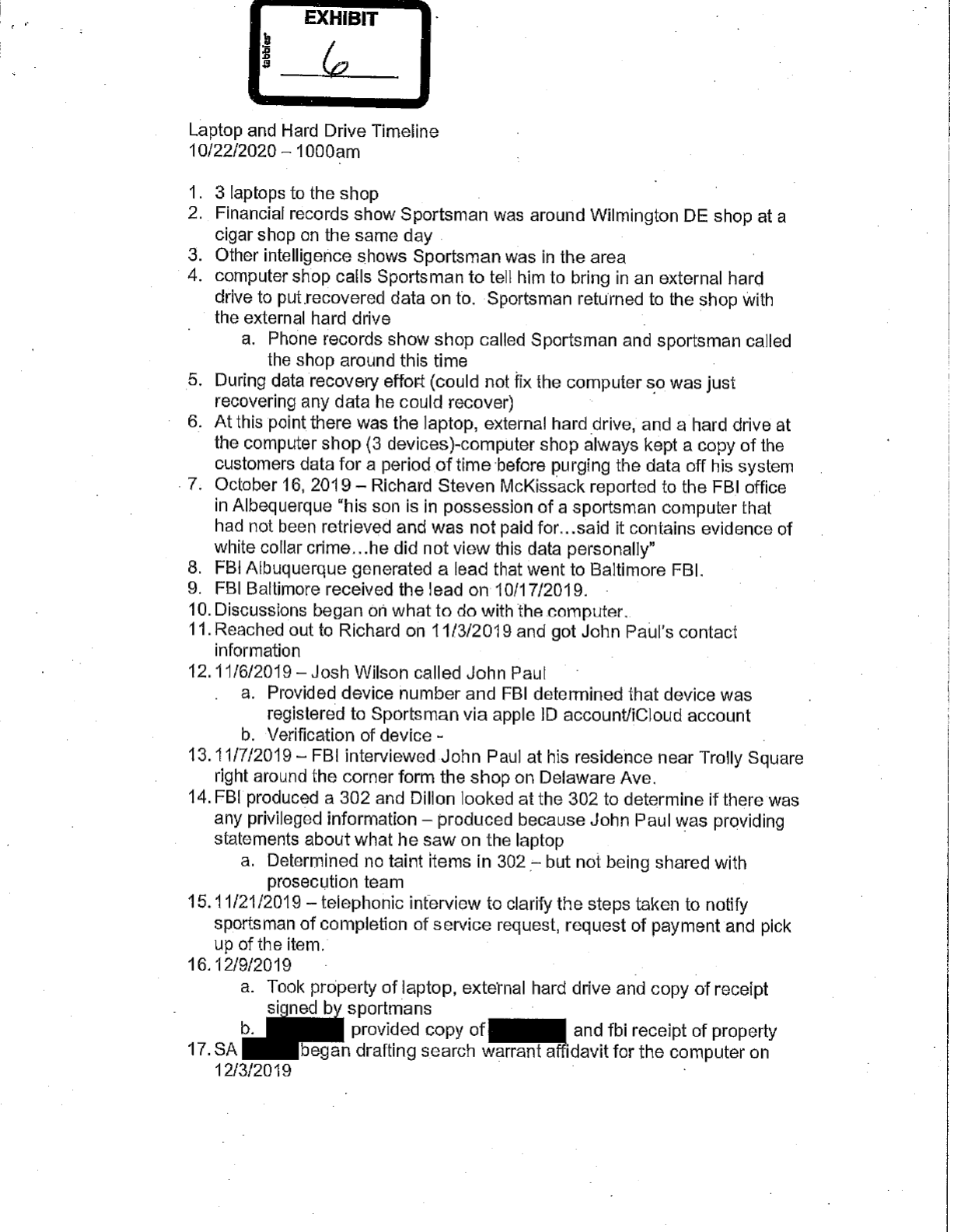



104
BY MAJORITY COUNSEL 2:
Q We just marked exhibit 6, and this is a document titled "Laptop and Hard
Drive Timeline" dated October 22, 2020, 10 a.m.
Can you tell us about this document, who prepared it, and why?
A Yes, I prepared this document. It was to memorialize a meeting that we
had with the prosecution team, plus the FBI CART team, which were the computer
analysis team.
One of the things that prompted this was an email that I had sent a couple days
earlier that basically asked AUSA Wolf to have a discussion about the laptop, because IRS
CI was the affiant that actually allowed to get the contents of that laptop and devices.
When I say laptops, there's a couple devices.
So then this occurred, and it was almost 4 hours, I think. It was a long -- no.
Yeah. Three hours. It was long and it was very detailed, and I just documented it here.
Q Do you know what warrant the FBI used to obtain these devices?
A It wasn't a warrant for the FBI to physically take custody of it. They
determined, because it was abandoned property, that it could be turned over via a
document request.
[Witness confers with counsel.]
[Discussion held off the record.]
MAJORITY COUNSEL 2. Back on the record.
BY MAJORITY COUNSEL 2:
Q Who obtained the devices?
A FBI did.
Q Okay. And could you tell us, you know, anything else about this document

105
that is worth knowing about?
A So would you like me to go through the document for high points or --
Q Just the significant parts.
A Yes. So there are a couple significant parts of this. One was that, at this
time, the laptop was a very big story, so we were just making sure that everything was
being handled appropriately.
So we wanted to go through the timeline of what happened with the laptop and
devices. I thought one of the most important first parts was that on November 6 of
2019, the FBI case agent, Josh Wilson, called up the computer shop owner, John Paul, and
basically got the device numbers from him.
And then we bounced those device numbers off third-party records, and it
showed that it was, in fact, Hunter Biden's device. So it was a very first important step.
And then it's a lot of minutia with what they did with the information -- or with
the analysis of the computers. But what was important here was that , the
IRS case agent, pointed out a couple different times how he had not seen -- he was not
given a cellabright report, which is just what they call the output of the FBI CART team
analysis, and was questioning whether or not the investigators were provided everything.
And when it came down to item number 33 on page 2, Special Agent is
saying like, well, I haven't seen this information. And AUSA Lesley Wolf says, well, you
haven't seen it because, for a variety of reasons, they kept it from the agents. And she
said that at some point they were going to give a redacted version, but we don't even
think we got a full -- even a redacted version. We only got piecemeal items.
So it was an example of pertinent, relevant evidence that a prosecutor kept from
an agent, and I --
Q You're supposed to be on the same team, correct?

106
A Yes. And it had already gone through a filter review, right? So there was
no attorney-client privilege. So that couldn't be an excuse.
A prosecutor, in my experience, would never want that, right? Because they
want the agents to go through the evidence and the agents to spend that time. So, you
know, we don't really know what the full contents of that laptop ever had on it.
Q And was it the U.S. Attorney's Office that was withholding the documents
from the investigative agents?
A AUSA Wolf was the one who communicated it. I don't know if they confer
with DOJ Tax or not, but AUSA Wolf's the one that made the statement.
Q And flipping over to the last page, number 42, Special Agent , you
have listed here: "For items not seen by agents, shouldn't they see everything because
if they have to testify, they need to see it."
And what was the response from the U.S. Attorney's Office, Assistant U.S.
Attorney Wolf?
A It was a nonsensical response. It was just something about historical
review. But, you know, this 42 is an example of like -- this should have been such a
mundane task, right? Like, after the analysis was complete, here you go, agents. You
know, there was no attorney-client privileged information. Agents, do your analysis.
This is such a -- this is an example of Special Agent saying like, Look, like
shouldn't -- we got to see this. I don't know how, as an IRS agent, if someone is getting
10 percent of the income, when I do a tax comp for criminal purposes for Hunter Biden, I
can't include the 10 percent if he's not getting that. So we need to know where all the
10 percent is going, right?
Q So if the 10 percent was going to the proverbial big guy?
A Yeah. So, I mean, this is just a very small example. This is every -- like this

107
happened all the time. Number 42 happened all the time where even on the smallest
items, for example, like the subpoenas that I alluded to in my opening statement it was a
time period in late summer 2021 where we had prioritized these interviews.
And we were to the point where we needed to go out to all these prostitutes,
because these were expensed. So we had, it was probably four or five different weeks
where, would give the -- or I can't say that -- attachment for the document
request and have it, you know, ready to go the next week.
So I had to call Jason Poole multiple times, because they wouldn't give those
document requests without Stuart Goldberg personally approving them. And, you
know, there were a couple different times he was on vacation 1 week. So he just didn't
approve them. So we had to move these trips.
But that's the side story. But 42 is kind of like a microcosm of like many other
events that occurred similar to that.
Q Okay. And turning to 43, item C, Ms. Wolf said, while laughing, "that
because a lot of people are going to be asking for the laptop."
What did you take that to mean? Was that just a nervous laughter that she was
suppressing something that needed to be addressed?
A I think -- it was in the media a lot, a lot of talk about the laptop. So I guess I
didn't take from it that it was nefarious. It was really just that they were like joking
about how everyone wanted the laptop.
Q Okay.
A And then it was right after that that FBI --
Q Including the IRS criminal investigators, correct?
A Yes. We would have also liked to have seen that, unfiltered and
unmanipulated by the prosecutors.

108
Q Item E, Ms. Wolf stated: "This team trying to determine if anything was
added to the computer by a third party which are allegations being made by people who
are not the defendant in this case, is not a priority. We have no reason to believe there
is anything fabricated nefariously on the computer and/or the hard drive."
So this is Ms. Wolf, the Assistant United States Attorney, stating, according to your
contemporaneous notes, that we, meaning DOJ, and the prosecution team have no
reason to believe there is anything fabricated nefariously on the computer and/or hard
drive. Is that correct?
A That is correct.
Q There are emails and other items that corroborate the items on the laptop
and the hard drive. Is that further evidence from Ms. Wolf that the items on the laptop
are authentic?
A That is correct.
Q And are you aware of any point in time ever that Hunter Biden or his lawyers
have asserted that anything on the laptop is not accurate or not legitimate or not
authentic?
A Like news reports? Like, you know --
Q Has it just come to your attention? Has anyone made an allegation that
knows anything about the laptop that it's not authentic, that they would have a reason to
know?
A Anyone in --
Q Hunter Biden, his lawyers, anyone from the Biden camp?
A Oh, I don't know. I don't recall who was making what statements. I
mean, I --
Mr. Lytle. You're not aware of them?

109
Mr. Shapley. Yeah, I'm not aware of it.
BY MAJORITY COUNSEL 2:
Q If you're not aware -- I'm not either -- of anyone, Hunter Biden or his lawyers
saying that anything on the laptop is fraudulent, doctored.
A Yeah. I don't know of that, no.
Q Okay. And that never came up in the prosecution team discussions?
A No, no.
Q And if there was a question that there was doctored material or inauthentic
material on the laptop, that would be something that the prosecution team would
discuss, correct?
A They were -- we were discussing it.
Q Okay.
A I think that there's even another bullet point here where they're talking
about looking back to see if documents have been -- or if files have been manipulated.
Yeah. So A is: The computer guy said that they could do a CSV list that shows when
everything was created, and that the laptop was returned to original when they -- yes.
So, I mean, the whole discussion was about can we rely on this information on the
laptop, is it Hunter Biden's? And their opinion was, it was, and it was not manipulated in
any way.
Q It was reliable evidence?
A That is correct.
Q Okay.
I want to mark another document that you produced. It will be number 7.
[Shapley Exhibit No. 7
Was marked for identification.]

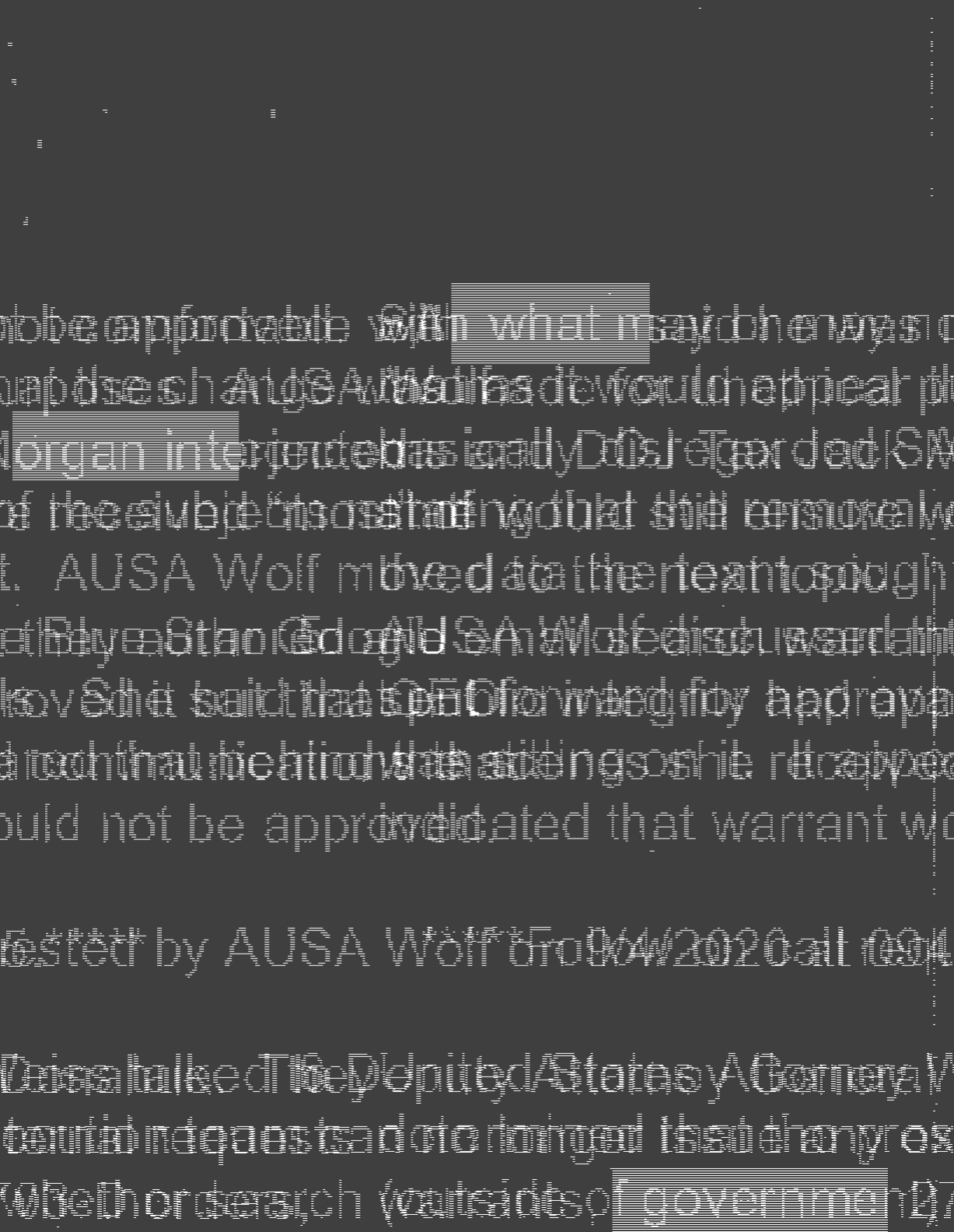

110

111
BY MAJORITY COUNSEL 2:
Q It's a memorandum of conversation regarding the Robert Doe investigation.
This is a two-page document, two pages of content -- the document is three pages, the
third page doesn't have anything on it -- prepared by yourself dated September 3, 2020.
A Yes.
Q And you wrote this document?
A I did.
Q Can you describe the significance of this document?
A Yes. So this was a pros team meeting September 3rd, 2020. And we were
having a discussion about being able to do the physical search warrants on Hunter Biden's
residence and/or the guest house of President Biden's residence in Delaware.
And we had already established -- well, herein too this is when AUSA Wolf is
stating that the probable cause had been achieved and that there was more than enough
evidence and that there was likely evidence to be seized relevant to the investigation that
could be found at these locations.
So she stated, "The decision was whether the juice was worth the squeeze." And
also a statement made here was that she said that, well, we had to consider the optics of
doing a search warrant on, you know, Hunter Biden's residence and/or the guest house of
President Biden.
She further states about the guest house of Joe Biden that there was no way we'd
get that approved. And here's another example of Case Agent interjecting,
talking about that there were other documents that said that there was information that
would be in the guest house and in the subject's California residence in Venice Beach at
the time.
112
And further, there was another discussion about moving forward on these
external document requests. So we did multiple electronic search warrants, D orders,
you know, document requests.
And prosecutors were pushing to remove the subject's name from those. And
the reasoning behind that was that they were worried that it would -- someone would --
out there that received these documents, these document requests, would leak the
information, and that if it just had the entity that it would be less -- it would be more
difficult to link it to Hunter Biden. So, I mean, of course, the issue is that she said that it
would not be approved way above them, right, which -- and I could talk about that in a
moment.
And then we're having a long conversation about it and every one of the
investigators are like, look, like this is not normal. There is no way we'd ever send
out -- how do you do a thorough investigation of a subject without the subject's name on
it? It's just -- it was absolutely absurd.
And then even Jack Morgan from DOJ Tax said, well, we'll receive most of the
information. And in my experience with working with prosecutors who might be going
toward a trial, most is never going to -- never going to be good enough for them.
Q Was there any overt discussion at these meetings that we're dealing with the
son of a Presidential candidate? Was that ever discussed explicitly?
A I mean, they were careful. They tried to be careful. You know, that's why,
you know, there's not a lot of emails, there's not a lot of documents they produced, right?
There were discussions that were obvious that they were talking about the issues with
investigating a Presidential nominee at that time.
Q When AUSA stated that the juice was -- whether the juice was worth the
squeeze, what do you think she was referring to? Whether the effort expended to get a

113
physical search warrant would be worth it? It takes a lot of hard work and effort on the
side of the investigative team to obtain a T-3 warrant, correct?
A Well, it wasn't a T-3.
Q Not a T-3.
A A physical search warrant.
Q A physical search warrant.
A I think that she wasn't worried about that part. She was worried about
blow-back from doing a search warrant that was related to Hunter Biden. I think all of
these things that they didn't allow us to do, even back in June of 2020, was because their
primary goal was to keep this investigation secret, right?
And even on December 3rd of 2020, when we're in Delaware U.S. Attorney's
Office prepping for the day of action on December 8, Weiss came in and was
like -- congratulations for keeping it secret. And I was like, well, I thought that we were
conducting an investigation here. I didn't think that what we were doing was trying to
keep a secret.
But there were multiple things like this that occurred -- and this wasn't specific to
the upcoming election, right? Like, we hadn't got the cease -- this was on September
3rd, 2020 -- we hadn't got a cease and desist from DOJ Public Integrity to stop.
So this was generally just that they wanted to remove the subject's name because
they were so worried that some company got a document request and that they would
give it to the media and that it would somehow out the investigation.
BY MAJORITY COUNSEL 1:
Q When you said that AUSA Wolf was worried about blow-back, from who do
you think she was worried about blow-back?
A I think it was worried about, that there's going to be, suggestions of election

114
meddling, or that you're targeting targeting -- Hunter Biden.
I think -- all of her -- all of the reluctance to do all this I believe was related to that.
Like, when she says, there's no way we'll get that approved, so at the time, right, like this
is September 3rd of 2020. So Bill Barr is the Attorney General, right? So I would
assume this would -- I don't know, but would this go to his level? I don't know who's not
approving it, right?
But I think that this was an excuse to not even send it up. So I would -- I don't
know 100 percent, but I'm almost positive that they just said, Well, we're not going to get
that approved so we're not even going to send it up. And that was always kind of an
excuse, to use the process to slow it down and to kind of hide behind.
BY MAJORITY COUNSEL 2:
Q And your belief, based on your experience, was they were afraid that maybe
it would be approved?
A Yes, yes.
Q And so they wanted to stop it right there in Delaware, in the U.S. Attorney's
Office in Delaware?
A That is correct. And even the storage unit search warrant. I mean, that
was after the election. And there was no -- it was a storage unit in northern Virginia.
No one would have known that was connected to Hunter Biden.
But we had information that there was -- the clean-out of the Owasco office was
located in this storage unit in northern Virginia. And after the day of action, we got a
little bit more information about it, so we wanted to do it.
And the night of the day of action, sends a search warrant affidavit to
Lesley Wolf saying, let's do it, right? Now, there's not even an election issue, right?
And it's in a storage unit. It's not on someone's residence.
115
And still, AUSA Wolf and the prosecutors wouldn't allow us to do it, so much so
that I set up a call with Weiss and my Special Agent in Charge at the time, and we said,
Look, we got to do this. We can't just rely on a document request for them to give us
whatever. We need unfettered access to this evidence. We don't know what they're
going to give us eventually.
And he agreed that -- look, if it’s not -- Weiss agreed on that call that if it is not
accessed, that storage unit, within 30 days that he would allow us to do a search warrant
on that.
I'm feeling great, right? So hang up the phone, an hour later I find out that AUSA
Wolf and the other prosecutors told defense counsel about the storage unit. So it was
off the table. And that was even after the election.
So there's many things. Any other case I ever worked, if they were like there's a
storage unit with documents from the business and personal documents in relation to the
years under investigation -- the risk was zero, because it's on a storage unit, it's not on a
residence -- there's no prosecutor I've ever worked with that wouldn't say, go get those
documents.
Q Do you think these decisions were made by Ms. Wolf, the AUSA, or do you
think these decisions were made by the U.S. Attorney?
A I don't know the answer to that. Based on what I was led to believe that
Weiss was in charge, right? And that the prosecutors often use that as an excuse.
Well, that's a great idea, we're going to go talk to Weiss about it.
Q From some of your testimony, though, in the last few minutes, it seems that
the AUSA Wolf may have been curtailing parts of the investigation, but the U.S. Attorney
had expressed, at least overtly, that he was interested in moving forward, at least with
the search warrant for the storage unit.

116
A Yes. That particular item, yeah. I mean, Weiss -- I mean, I think Weiss
didn't have an opportunity to talk to Wolf, right? And maybe they didn't communicate
that Weiss had agreed to that.
But the whole point is, is that December 8th, there's emails where Weiss and -- or,
I'm sorry, Wolf is asking for a search warrant affidavit. Like, let's go do a search warrant,
right?
And then gets the search warrant affidavit forward. And then all of a sudden
they're like, we don't want to do that. And they knew we were talking to Weiss about
the physical search warrant. So I don't know why they would call the defense counsel at
the same time without speaking to Weiss about what came out of that meeting about the
physical storage unit.
BY MAJORITY COUNSEL 1:
Q From an investigation process perspective, is it typical for prosecutors to
notify defense counsel before executing a search warrant?
A No. No, that wouldn't happen.
BY MAJORITY COUNSEL 2:
Q Is that inappropriate?
A Absolutely. I mean, officer safety. I mean, it's just incredible. You know,
there's destruction of evidence. I mean, you go into a door and they know you're
coming. It's terrifying.
Q So it's not just for the integrity of the investigation, there are safety issues?
A Absolutely, yes.
Q Let's talk about the day of action, which occurred a couple months later.
This memorandum of conversation we were discussing was September 3, 2020. And the
day of action was going to be -- it turned out it wasn't very action-packed. Is that
117
correct?
A Yeah. There was only one successful interview that day, but there were
lots of document requests.
Q What other agencies were you coordinating with for the day of action?
A FBI.
Q Is that the only one?
A Yes.
Q And what was the original plan for the day of action? I know you
mentioned 12 interviews, some in Arkansas, some in California. But maybe you can just
walk us through, again, at a high level, what was planned for the day of action.
A So the plan on how to execute that day?
Q Yes.
A All right. So the plan that we discussed and agreed upon on that December
3rd meeting, and it might have morphed in a couple days after just to finalize some
things, was that for Hunter Biden, who now had a Secret Service detail, that we were
going to have the FBI Special Agent in Charge call the Secret Service Special Agent in
Charge the night before to just say, hey, I'm calling you at 8 a.m. It's important.
And then 8 a.m. call. FBI SSA Joe Gordon and I were the ones tasked with
interviewing Hunter Biden.
Q So you're in California?
A In California, yes. So the night before -- so that was the plan. I went to
FBI L.A. Field Office with the FBI SSA. We talked to their management. That's the plan.
We're going home, right?
Now it's December 7th, the night before the day of action. And I'm prepping for
interviews, because I'm interviewing Hunter Biden and Kevin Patrick Morris, right? So
118
I'm prepping. I'm prepping.
I get a phone call from my Assistant Special Agent in Charge, George Murphy, who
tells me that FBI headquarters notified Secret Service headquarters and the transition
team that the day of action was occurring the next day. And that the new plan
became --
Q Can I just stop you there? Why did they tell the political officials?
A I have no -- I have no idea, no idea.
Q That certainly sounds strange to you, correct?
A All of it is strange.
Q It's one thing to tell the subject, but to tell the political officials introduces a
whole range of topics of concern. Isn't that correct?
A Yeah. All of it -- yes. Yes to your answer, but all of it was incredible.
There's also another officer safety issue, because these people close to him are going to
know that we have agents out there out and about trying to do interviews and try to get
information.
And then just, tampering with witnesses, right? Now you're telling the witnesses
that agents might be knocking on your door tomorrow, don't say anything. And
ultimately, we got one guy that talked.
Q Right. So of the 12 witnesses, do you remember who was on that list other
than Hunter Biden and --
A I generally know it was Joan Mayer, Eric Schwerin, Rob Walker. It was
Kathleen Buhle, Kevin Morris.
Q These people are located in the United States?
A Yes.
Q Eric Schwerin, where is he located?
119
A D.C., I think.
Q And Rob Walker is in Arkansas?
A That is correct, yes. There were a few more, but I don't recall.
Q And for the day of action, were you given any instructions -- and I think you
mentioned this in your opening statement -- about what the agents could and could not
ask?
A Yes, we did.
Q And could you tell us a little bit more about that, again?
A Yes. So on December 3rd, 2020, in the Delaware U.S. Attorney's Office, we
were going over -- it was a very, very long day, because we had -- there were a group of
like 12 or 15 people in the room. Weiss was coming in and out. And we were prepping
for each individual witness.
So the agents that were going to conduct those interviews were Zooming into this
meeting. So we're going over each outline. There were multiple times where Lesley
Wolf said that she didn't want to ask questions about dad. And dad was kind of how we
referred to him. We referred to Hunter Biden's father, you know, as dad.
Q That's Joe Biden?
A Yes. James Biden as uncle.
Q You were not allowed to refer to James Biden either?
A We called him uncle. I think it was so that we could speak more openly
without, yelling, President Biden or James Biden. I don't think that was nefarious,
but -- she said, I don't want questions about dad.
So now we're in the Rob Walker, and the interview outline is eight, nine, 10 pages,
and we're on page 4. So we're not on priority items, but we're kind of gaining that
rapport, getting him used to the interview, just like we do a lot of things. Now we're

120
going to ask him substantive things that we really want to know.
So in there, it said: "10 held by H for the big guy." And it just said how -- what
we were going to ask on that topic. And Lesley Wolf stops and says, we're not asking -- I
don't want to ask about the big guy. And everyone -- basically, everyone in the room
except for the prosecutors had a big problem with that. There was a large debate about
it. And, she said, I don't want to talk about big guy. I don't want to -- I don't want to
ask about dad. So you see in the --
Q Do you know why?
A I think that she was trying to limit where the investigation could go.
Q And do you know what her motivation was?
A I don't know what her motivation is, no.
Q And did anyone on the team give her any feedback about what are you
doing, this is crazy?
A Everyone there -- the prosecutors are generally pretty silent. So Lesley
Wolf was the main voice, and the other ones were very subordinate and kind of only
talked when they were asked to talk.
So FBI raised concerns. raised concerns. I raised concerns about it.
She's like I don't want to talk about the big guy. Don't ask about the big guy. So you
see in the Rob Walker interview --
MAJORITY COUNSEL 2. And we can mark that. It's No. 8.
[Shapley Exhibit No. 8
Was marked for identification.]



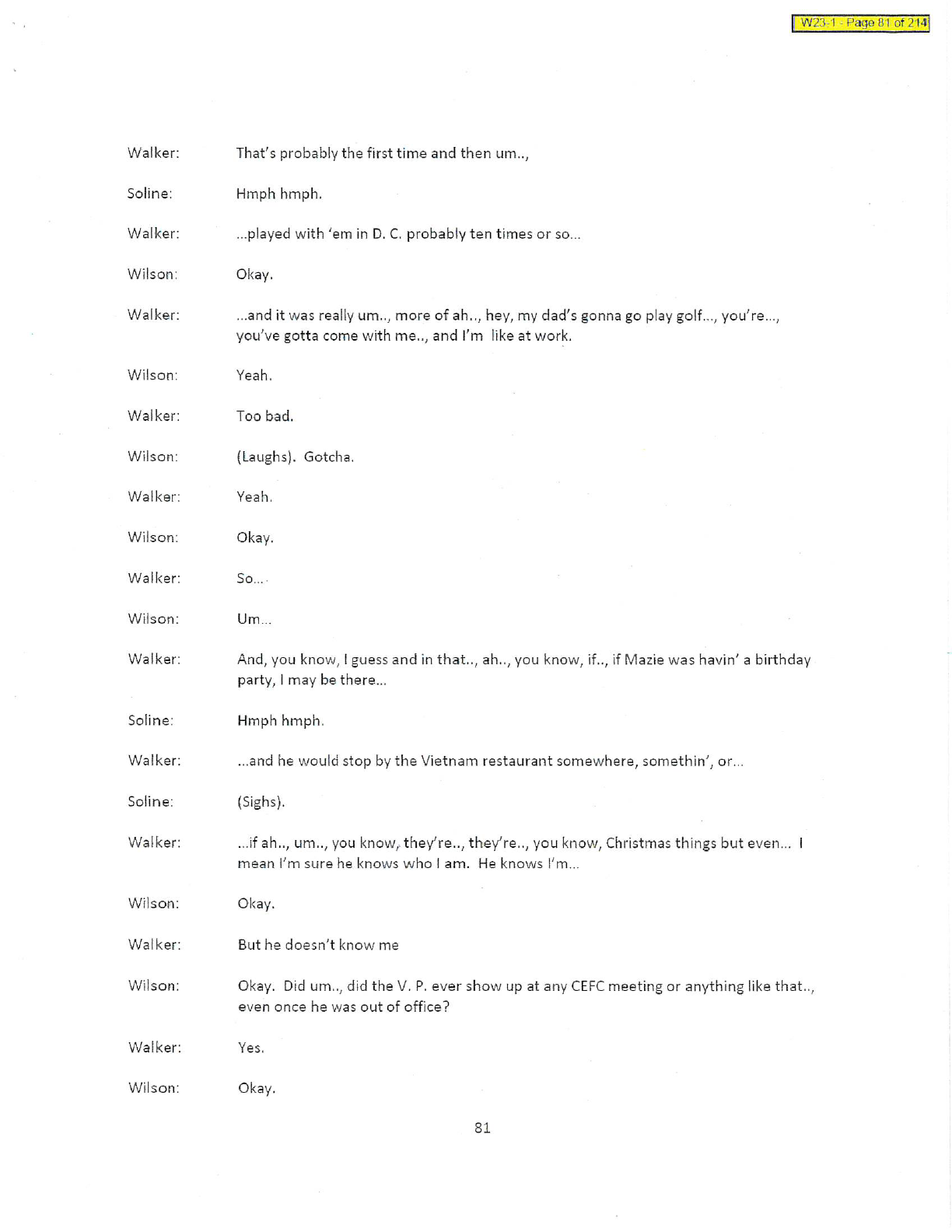
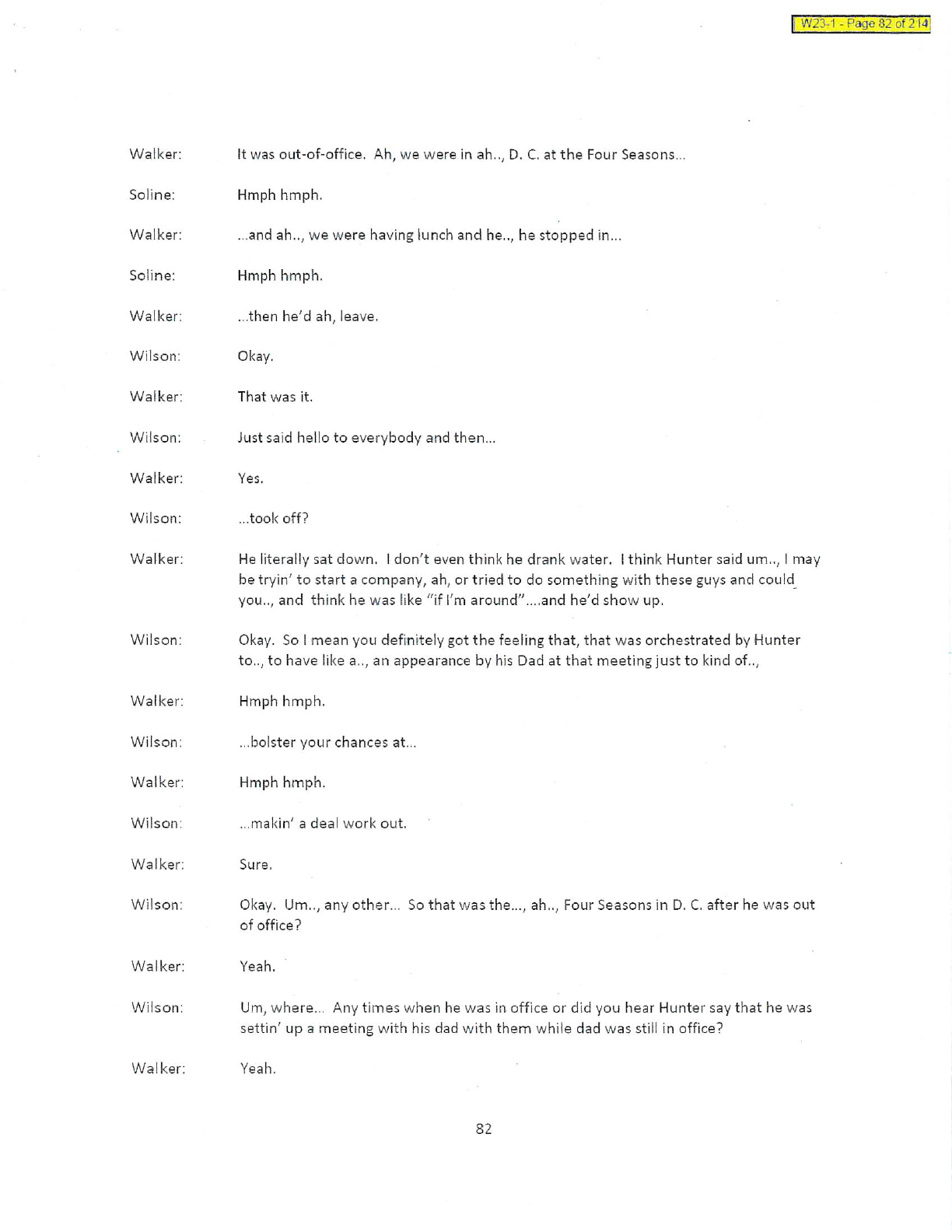
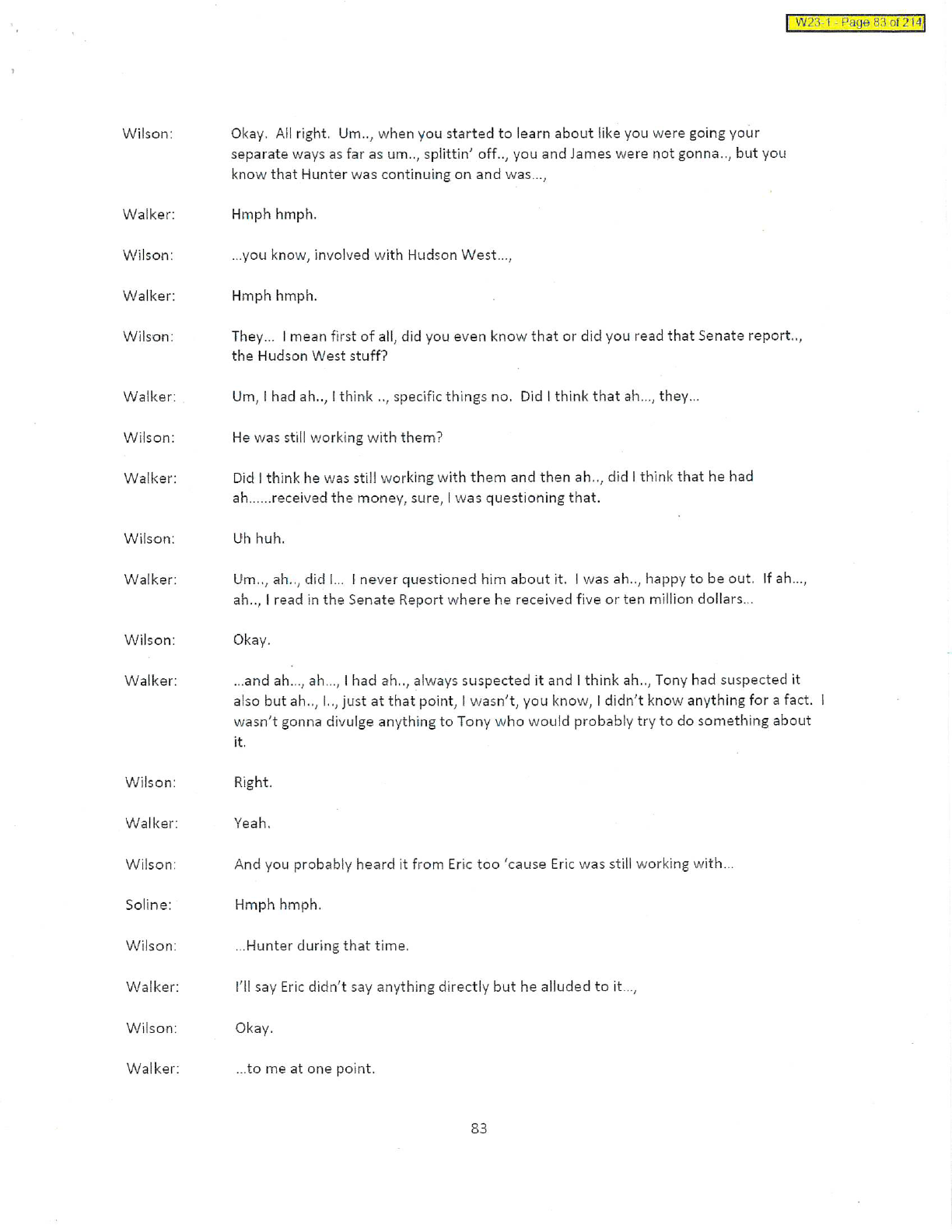

121
BY MAJORITY COUNSEL 2:
Q This is a document of a December 8, 2020, interview by Special Agent Wilson
of the FBI and Rob Walker.
And just as I understand this document, this is a transcript of a recording?
A Yeah. This is an excerpt of a transcript of a recording. That is correct.
Q And so was Special Agent Wilson wearing a -- or recording it on his phone, or
how did it get recorded, to your knowledge?
A Yes. Mr. Walker was consensually monitored.
Q Okay. So he agreed to have the interview recorded?
A No. The agents were the consenting people to monitor.
Q Okay. So it's like a one-party State or --
A Yeah, yeah. Well, law enforcement, we have the consensual monitoring
rules.
Q Okay.
A And we got approvals to do consensual monitoring for these things. So the
agents are the consensual.
Q All right. Now, are they wearing a wire or are they just using an iPhone, or
how does that happen?
A It's different. We have different tech. Key fobs, coffee mugs, iPhones.
There's lots of different things. I haven't seen a physical like what you think of as like
taped to your chest.
Q Well, I used the term "wire," but what I mean is a specific device for
purposes of recording, not just an iPhone.
A That is correct. And this was to be able to be inserted into evidence at trial
122
transcript of that recording, excerpt of a transcript.
Q Maybe you could draw our attention to the significant parts of this
document.
A Sure. So, right up to the time when Special Agent Josh Wilson or Special
Agent Adam Soline, who is an IRS agent, one of my agents, was going up to this door, they
were deliberating. They were basically debating about Lesley Wolf's directives.
And they were like, how can we not ask? Like, that was wrong. We got to ask.
We got to ask. And so they basically decided that they would ask the question without
saying the words "big guy," and that then they would somehow be doing what they were
asked to do.
So, as you can see in here, page 79, it's about right in the middle of the page
where it says "Wilson" and it begins "who." So this -- Wilson's question and -- do you
want me to read it or --
Q I can read it.
A Okay.
Q It says: "Who...Like can you tell me your opinion of that? Like" -- I won't
read the ahs and the – “I mean are you familiar with what I'm talking about…, that email..,
when it's going through like, you know, ten b.., held by “H”? And Walker responds in
the affirmative.
A Yeah.
Q And then Walker further says: "Yeah, I saw that on Twitter."
A Yes.
Q And so what else is significant about this back-and-forth between Special
Agent Wilson --
A Sure. So this just shows the lengths at which we had to do to -- and how it
123
affected actually our jobs and conducting these interviews. But then you go --
Q Because Walker was a business partner of Hunter Biden, correct?
A That is correct, yeah.
Q And so he was especially positioned to know what 10 for the big guy meant,
right?
A Yes, yes.
Q And so by not asking directly about that, you're giving away a legitimate
investigative lead, correct?
A Definitely could be, yes. So, as I kind of stated about -- I'll say it a little
more directly. They were debating about this, right? But they were struggling to come
to grips.
Even, you know, what is it, 5 days later when they're headed to do that interview
and they know that it's wrong but they were agents and they did the best that they could.
So if you move down into this -- this couple pages, you can see that they're saying
VP, VP, page 80.
Q Okay.
A They're calling him VP, and that was because they weren't supposed to call
him dad.
Q Okay.
A Not call him dad. So that's the --
Q So VP wasn't on the list. It was don't mention the big guy, don't mention
dad?
A Yeah.
Q But VP wasn't on the list of barred terms?
A It was a little bit of a protest, I guess, to say that we're asking it, but, we'll ask
124
it in a way that maybe she's not mad.
Q Do you think she would have been mad, though, because clearly she was
trying to steer the investigation away from Joe Biden, correct?
A I mean -- yeah, of course. She would have been -- she was the type of
person that did not like dissenting opinions, and what she said went.
Q Do you think at this point in this -- maybe you don't know, but I'm going to
ask it anyway -- whether she was angling for some sort of position in the administration in
the Justice Department?
A I have no idea.
Q Was there ever any chatter among your colleagues about that, if that was
her motivation?
A No, I've never heard that.
Q Did you or any of her colleagues have any speculation about her motives, or
was it just that she was trying to keep this case from moving forward?
A Her motives are just difficult to assess, right? We're just thinking about the
investigation and how we have prosecutors on the case that are obstructing our efforts to
get all the evidence. That's really, eventually, the reason why we went a couple years of
this type of conduct was because we just -- we have to do it. We have to suck it up.
We got to work this case.
I got a prosecutor that's not great to work with. That happens sometimes. We
just got to move forward, right? So that's what we did for a year, 2 years, 3 years. So
she was not pleasant to work with. She was -- I don't want to belabor that point, but it
was her way, right?
And if there was big guy in the transcript, she was either going to directly berate
you, or she was probably going to give you the silent treatment, which was one of her

125
tactics, for a couple weeks and talk behind your back.
MAJORITY COUNSEL 2. Okay. Our hour is up, so pivot to our colleagues.
Mr. Shapley. We can come back to that, right? There's more on that.
MAJORITY COUNSEL 2. Correct.
MAJORITY COUNSEL 1. Go off the record.
[Recess.]
MAJORITY COUNSEL 2. We are back on the record. It's 2:20.
BY MINORITY COUNSEL 2:
Q Thanks again. I think on our side, we have sort of a smattering of clarifying
questions and the like.
First, I'd like to go back to a discussion we were having before regarding the
relationship between civil tax investigations and civil tax liability and criminal tax liability.
And I think I'd like to start with questions about something that you alluded to
that I have not heard before. I just wanted to get clarity on it.
You said in the discussions of the various tax years, when we got to, I believe it
was 2016, or maybe my notes are a little bit fuzzy, there was a point where you said that
Hunter Biden was paying off tax debts in installments.
Could you describe a little more about what that was, what those payments were
for exactly?
A Yes. So he was assessed a civil tax assessment at some point, and he
entered into a payment agreement with IRS civil side to pay $10,000 a month, I believe.
Q Do you know for what year that liability was assessed?
A I don't.
Q But not for any of the years in question?
A No. They would have been prior.
126
Q Prior, okay. And then who is responsible or what is the process at IRS CI
for, let's say, hypothetically, there's a case that comes before CI, and they review it and
they decide that it doesn't necessarily meet the standard for criminal prosecution, but
there's, nonetheless, tax liability.
Is there a process for referral to the civil?
A Yes. It's called just that, civil referral.
Q Civil referral. And did that occur in this case at all after -- after prosecution
was declined, or the statute ran, the criminal statute ran?
A No, it didn't, because the civil statutes had run. The statute of limitations
had run. I'm sorry.
Q The civil statute of limitations on fraud are infinite under IRS 6501(c). And,
similarly, the statute for failure to file also does not run if you don't file a return.
Was that thought of and acknowledged by Criminal Investigation when deciding
whether to refer the case?
A Are you asking about the civil fraud penalty?
Q No, not the civil -- if there's fraud under 6501(c) -- if the IRS can demonstrate
fraud, then the statute of 6 years does not apply, correct?
A The civil fraud penalty which you are referring to -- it can only be assessed
with a criminal conviction. That's the standard for civil to be able to make that fraud
assessment. And there are some jurisdictions where it has to even be 7201, an evasion
case, in order for the civil fraud penalty to be able to be assessed.
Q 6501 is the civil fraud penalty or -- maybe I'm mixed up, because I was under
the impression that that was the limitation on assessment. So put it aside. I don't
have my Code with me.
But I was pretty sure that the limitation on assessment -- in the case of fraud,
127
simply did not run. But --
A I think you are partly correct, but the way that the precedence for proving
fraud, for the civil fraud penalty, is a criminal conviction or guilty plea.
Q That could -- we'll have to look.
A That's my understanding, and that's the way that I've seen it done in the
past.
Q Okay. Fair enough.
Skipping around, can we go back to AUSA Wolf for a moment? If I recall, AUSA
Wolf was among the individuals who, at the end of the day, were in favor of charging
Hunter Biden in their recommendations to, for instance, the D.C. office of the DOJ?
A They were supportive of the charges in the SAR --
Q Yes.
A -- and moving forward to the D.C. U.S. Attorney's Office, and presumably to
the California U.S. Attorney's Office, yes.
Q Right. So, when all was said and done, AUSA Wolf and Mr. Weiss as
well -- they didn't appear to be impartial -- to be biased in their conclusion as to whether
or not to charge Hunter Biden?
A I don't think that's an accurate statement. There were -- during the
investigation, we have no way to know if we have all the evidence. We were obstructed
from approaching certain witnesses. We were obstructed from asking certain questions.
We limited the names that were on document requests.
So we have no idea what's out there that could have linked us to one bank
account that opened up a whole other slew of evidence for us. Just the search warrants
not being allowed after they've agreed that probable cause has been achieved.
I look at it as is that there was all these obstructions, and at the end of the day,

128
the evidence was still strong enough to support them charging. That's how I look at it.
Was that your question? I'm sorry.
Q It is my question. But there's still a point where nonetheless they have
discretion to agree or disagree with your recommendations, and they chose to agree with
them.
A Officially, and -- there's two different things you're talking about, right?
There's the SAR that we give to them and they review. And we've been working with
them every single day. They know every single piece of evidence. They know more
evidence than we do, because they withheld some from us.
So when that SAR went forward, we talked with them constantly about these are
the charges that we're looking to recommend. Is everyone on the same page, right?
So we don't want to recommend something and then have some huge argument over it,
right? So everyone was on board then with the SAR.
Afterwards, with what happened at D.C., or happened at California, or if any
charges have been approved officially yet or -- I don't know the answer to that.
Q But nonetheless, they still supported your conclusion in the SAR at the end
of the day?
A That's accurate, yes.
Q And that was despite what you perceived as obstructing various steps of
evidentiary gathering along the way?
Mr. Leavitt. Can we go off the record for a second?
MINORITY COUNSEL 2. Of course.
[Discussion off the record.]
MAJORITY COUNSEL 1. Back on the record.
MINORITY COUNSEL 2. Back on the record.

129
BY MINORITY COUNSEL 2:
Q I was just clarifying that they agreed with your conclusions in the SAR, and I
said that was despite what were your perceptions of those obstructing the obtaining of
evidentiary material along the way and reaching those conclusions.
A That is correct. But I just want to go back to the fact that it could have
been much more. It could have been much bigger. There could have been income
streams, more income streams, to other people associated with it, to include the
President.
So, that's my answer.
Q And is it your opinion, not necessarily your professional opinion, but your
opinion as a citizen that the FBI in 2016 and after the 2016 election took something of a
reputational hit?
A I don't really have a lot of opinion about that. I don't --
Q You're familiar with the Jim Comey memo and the like, presumably?
A Yeah. I'm not a big guy that reads a lot of news and stuff. Obviously, you
hear things. And my NBC News app, I see once in a while stuff on that. But, working
with the FBI, it didn't seem like there was -- I don't -- is some factions of the media saying
that there's a problem, but I didn't sense it. I still -- I didn't sense it doing the work.

130
[2:28 p.m.]
BY MINORITY COUNSEL 2:
Q That's fair, you're in the trenches and you're working closely with the things,
but, obviously, the FBI was very much in the public eye as a result of the 2016 election
and the Comey memo and the potential for interference there.
And, do you think, in general, in organizations that have sort of tiers of authority
and tiers of responsibility, where, you have workers at a lower level and reporting up the
chain to higher up, that those up the higher chain might have a different prudential
outlook on the reputational concerns of an organization?
Mr. Shapley. Yeah.
MINORITY COUNSEL 2. Okay. That's all I have.
MINORITY COUNSEL 1. Thanks.
BY MINORITY COUNSEL 1:
Q Okay. I have a couple questions, and a lot of these are like my former
questions. I just want to go back and make sure that I have the record right and correct.
So earlier you had mentioned that, in 2015, there were some issues that were
different. You mentioned the diamonds, you mentioned the low amount for 2015, that
maybe the case was less straightforward, I guess in the case of the loan.
Was there anything else in 2015 that made it, you think, different than 2014,
other than the amount? Were there any other issues that you can think of that maybe
we haven't listed or talked about yet?
A The conduct in 2015 and 2014 was entirely different. So, there was a
scheme to evade in 2014 by using Rosemont Seneca Bohai to divert income from Burisma
under Devon Archer's entity. In 2015, that was kind of sifted out through Eric Schwerin.

131
He became aware of that in 2015. You got to think, 2015, the tax return's due in 2016,
and if an extension is filed April 15th of 2016, then the return is not due until October 15,
2016.
So Eric Schwerin had become aware of the income, and that's kind of how that
whole thing changed --
Q And so maybe that's why the amount was lower in 2015, maybe he actually
helped. Okay.
A Can I --
Q Yeah, sure.
A So, initially when the SAR was written, the amount of taxes owing was
around $160,000 for that year.
Q For 2015?
A For 2015.
Q Okay.
A But, we were battling to get information from accountants and so on and so
forth, right? And we're trying to be as conservative as possible to give every benefit to
the subject in terms of the actual tax due and owing. So ultimately, 2015 just became
something where it was -- to be conservative, it was not an issue. I had no issue with
that.
Mr. Leavitt. And you're saying that was after the SAR had already gone forth. Is
that right?
Mr. Shapley. Yeah. So more information was received after that SAR went
forward.
[Shapley Exhibit No. 6
Was marked for identification.]

132
BY MINORITY COUNSEL 1:
Q Great, thanks.
Okay. Now I want to talk about exhibit 6, which is your memo about the laptop
and the hard drive. Was this memo provided to anyone?
A This memo was discussed in length with the case agent and co-case agent,
but to protect the record, these I couldn't send to them.
Q Okay.
A So after each time we had calls like this, I would have conversations with
them. There was even a document that I produced where they were like, well, there
was this problem, this problem, this problem. So I was like, I'll record it, because we
don't want this to potentially be discoverable and have any issues in the future.
So this is an example of that, where if there are at least two people that will say
that we talked about this right after, and most of the conversation is to discuss what
happened during that, to make sure that it was accurate.
Q But you don't provide a copy to your supervisor or Mr. Fort or anyone else in
your chain of command?
A No.
Q It just stays with you?
A That's correct.
Q Okay. That's my question.
A Yeah.
Q And then in this exhibit 6, there's two items that are redacted -- it says
December 9, 2019, and there's two redactions. Why are those redactions there?
A It was just a potential 6E type situation.
[Shapley Exhibit No. 7

133
Was marked for identification.]
Q Okay.
Thank you.
Now I'm going to look at exhibit 7. And the question is the same as the one
before it. Was this memorandum provided to anyone or copied to anybody?
A It was not. Just to reiterate again, that this was discussed right after -- I
can't even think of a time when we didn't have a discussion immediately after these
meetings with just me, case agent, co-case agent, and sometimes with FBI agents on the
phone to discuss this.
Mr. Leavitt. Let me just clarify, to discuss your documentation of the meeting,
which did include other parties?
Mr. Shapley. That's correct.
MINORITY COUNSEL 1. I thought that's what he was saying, but thank you.
BY MINORITY COUNSEL 1:
Q Okay. When we were talking about this exhibit 7, you mentioned that, at
the time, Bill Barr was the AG. Why did you not take your concerns up the chain in 2020
at that time?
A Well, as I said before, there is a healthy tension between investigators and
prosecutors, right? And there are sometimes when I don't agree with a prosecutor, but
every time I don't agree with a prosecutor, I'm not going to run to Bill Barr or to senior
leadership to -- to blow the whistle or make a protected disclosure. The whole focus
was to do what we had to do, even if it meant dealing with obstructions from prosecutors
to get this case across the finish line, if it was worthy of it.
And, that's what we did. Every single time something happened wrong in this
investigation, I couldn't bring it to Bill Barr or anyone else, so --
134
Q And did you think about, in 2020 at all, coming to the committee at that
point in time? Because I know that you mentioned that there were irregularities that
you saw in the summer of 2020. Did you think about coming to the committee or
coming forward at that time or making a report to TIGTA in 2020?
A Like I said, we are trained and we work with these prosecutors hours and
hours, trips, and spend all this time. We are just trained to trust them, and it was an
incredibly high burden. If I wasn't in the October 7th meeting, my red line might not
have been crossed.
But the things in that meeting -- it solidified a lot of things that had happened
previously and explained a lot of things that happened previously. And it just got to the
point where, okay, now all of these things that happened that might be investigator
versus prosecutor-type thing, I just, I thought it got to the point where -- this is not a
small thing. I'm not coming to the House Ways and Means Committee when a
prosecutor says we can't do one search warrant. That's just not -- I'm not going to
do -- I'm never going to do that, right? This is a series of events over 3 years where
every single thing was to obstruct the investigation. Every single thing limited evidence
that we were able to obtain. And, so -- if I was in the wrong for not coming to House
Ways and Means Committee, I don't know.
Q I wasn't saying -- I wasn't implying that.
A Okay.
Q I was just asking, was that something that you considered in 2020, because it
seems like a lot of things happened in 2020, especially at the end, and so hence my
question.
A Well, I had the exact opposite feeling right then, right, because we were
going over -- we thought that the evidence we had so far -- we were going to get a bunch
135
of new evidence. We thought the evidence we had so far would maybe lead to an early
resolution of the case.
So there was a lot of excitement because we, for a year or so -- or a year for me,
because I came on in January 2020, but longer than that from others, we couldn't do a
drive-by of his residence without Stuart Goldberg approving it.
So, no -- we just wanted to move the investigation forward, and now we were
finally doing that. And so we were hoping that we'd get what we need and keep moving
forward.
Q And then, you just mentioned when you were talking, that you don't
normally make it a routine to come to House Ways and Means Committee. How many
times, just generally so we get a sense, do you disagree maybe with something that a
prosecutor says in a case? Is it regularly? Is it most cases? Some cases?
Sometimes? This is the first time? Can you give us some sense as to that interaction
and how often they don't agree in your cases?
A How many times have I disagreed with a prosecutor on a case?
Q Yeah. Just generally.
A I mean --
Q Is it every case there's always something or what's a general sense?
A It's always a professional relationship where everyone is moving forward
toward the common goal. The mission of the agency, and their agency, right? So if
every -- I challenge prosecutors all the time. They challenge me. It's fantastic. And
then we go and everything's great, and we come in the next day and talk about our
families. It happens but, in this particular instance, it wasn't jovial. It was just, this is
the way it is. And then even when we try to get support to go -- for example, to get my
SAC involved, to bring her to Weiss, to try to get this search warrant and this physical

136
stores [storage] location, we still got the end around, so -- I don't know. Did I answer
your question? I'm sorry.
Q No, that answers my question. That's what I wanted to know. I just
wanted to get some context. Like, if you were to tell me that most of the time we all
agree a hundred percent and this is the first time that we didn't agree, that would
obviously be different than, well, there's normally give and take in a case, and so this is
what we're seeing here.
Okay. Moving to exhibit 8.
A Well, I don't think that's what we're seeing here. I don't think that -- that's
not what I saw here. Maybe you're just speaking generally.
Q I am.
A Okay.
Q Yeah, I am.
Mr. Lytle. Well, what did you want to say?
Mr. Shapley. No. I think I've said it, that this is not the norm. This is -- I've
worked with some great guys, some great prosecutors that went on to be U.S. attorneys
and went on to be the deputy attorney general and, I think I have experience enough to
where it means something.
And I can't even count a time -- I don't even think I can come up with a time where
a prosecutor made a decision that I didn't agree with, that they didn't take the time to
explain to me and I didn't walk away being like, I disagree, but that makes sense. And
that just did not -- countless things did not -- that did not happen here.
BY MINORITY COUNSEL 1:
Q So do you think it was this prosecutor, is that what you're saying essentially,
that's who your dealings were with?

137
A I don't know what the ultimate motive was, right? I only know what I
know. I know what the evidence said, I know what precedent is, I know what my
experience is. I know all of the things that happened in the investigation.
It just appears to me that based on taking all those factors into account, that there
was some type of nefarious motive here, and I don't know what it is. I don't know.
Q At the beginning when you were giving your opening statement, you had
mentioned that the committee was your last hope, last sort of chance. And so,
obviously, we're not a law enforcement body. What are you hoping to get from the
committee? What is your outcome that you're looking for? Is it a process change at
IRS? Is there something that you're hoping to get with your last hope, which was the
way you described it?
A So I'm just here to give the documents and give my testimony, and I can
steer you to others that have documents and who can give testimony. And the whole
thing was that I have faith in the committee and this country, in general, to do the right
thing. And, ultimately, if you guys at the end of the day don't agree, that's not for me to
say. But, in terms of corrective actions or recommendations -- that's for you all to
decide.
Q Okay. I was just making sure that there wasn't something that you wanted
in this particular case. That's what I was asking.
[Shapley Exhibit No. 8
Was marked for identification.]
BY MINORITY COUNSEL 1:
Q Okay. Looking at exhibit 8, which is the interview.
A Yeah.
Q As I'm reading this interview, it was held in a restaurant or some place,
138
because I notice here that it says "unknown female," and then it says "female, wait staff."
Where did the interview take place?
A It was at his residence.
And I also noticed what you said, but at one point they were outside, and I
couldn't tell by the transcript if they were mowing the lawn or if there was lawn
maintenance -- I don't know what it was.
Q Okay.
A But they were in his residence. They went to his residence.
Q Okay.
A And his wife was there as well.
Q I did see the wife, and so that's why I wasn't sure. It seemed like maybe
they were in a restaurant or something. That's why I asked the question.
A No, no. I don't think so, no.
Q Okay. And you said that the consent was given by the IRS agents for the
recording of the interview.
Did he know that he was being recorded? Do you tell the interviewee that
they're being recorded?
A We do not have to tell the interviewee that they're being recorded, and I
don't know the answer as to whether we did tell him, because people can ask, right, if
they're being recorded, and I don't have the answer to that side. But we don't need to
inform them that they're being recorded.
Q Okay. And then I was looking at the top of the transcript. And I know that
you gave us some excerpts, and we're on a couple pages, and then the total looks like 214
pages. What else was discussed? Was there anything else discussed in the other
pages that we don't have that go to the tax, I guess, liabilities from 2014 to 2018?
139
I'm trying to get context on the other things that were discussed during this 214
pages that we only have a couple of these pages.
A Sure, yeah. So, I can't make a representation to all 214 pages, but the
reason why I thought this was pertinent was because this was basically showing the
outcome of the obstruction from the direction to not ask witnesses certain things. And
that's what brought this in. So, that's why this section's included -- and I can't really
remember -- if you're asking if there's dollars and cents in there for tax liabilities, I would
say I don't think that there is. But is there a different thing that you wanted me --
Q No. I was just wondering, in these types of interviews, and this one in
particular, do you talk to him about some of the questions that you had? I know, like
2015, you mentioned diamonds or other items. When you're doing an interview with
this person, Mr. Walker, would you talk to him about all the tax years and any issues that
you might have in any of the years, or is it just limited to a single scope? I'm trying to
understand how the interview would work with him.
A It's by witness. So say Eric Schwerin would have been, and Joan Mayer,
those are like every single year: income, work, what's going on, expenses, in-depth type
of things. The accountant, CPA, return preparer, same thing.
This is a witness that was a business partner that was involved in a deal with CEFC,
so most of the questions were kind of geared toward that and SinoHawk and some of
these other things. So this one in particular likely wouldn't even have broached the
topic of how would Rob Walker know what Hunter Biden's tax situation is. He wasn't
involved in the preparation of stuff --
Q Okay.
A -- of it, so --
Q Okay, that's fair.
140
And then the entire transcript, the whole 214 pages -- who does that go to?
Would it go to AUSA Wolf? You mentioned that she didn't want you to use the words
"big guy" and other things. So would she have seen that "VP" was used, and would she
have commented on this transcript -- what happens to the transcript once you receive it?
A So the evidence in a case should be available to everybody in the
case -- prosecutors and investigators -- unless there's some type of confidential, classified
type thing that could be partitioned into some SCIF or so and so forth, but everyone
should have this. And I would have to say that she read it. I don't know directly that
she read it, but it was 214 pages, so, maybe she had someone else read it. I don't know,
but --
Q But it's available --
A Absolutely.
Q -- to the entire team?
A Absolutely.
Q Okay. Okay. And then I just noticed -- this is just a basic question. I
noticed through here there's a lot of these words like the "hmph," like h-m-p-h. You
see, that's kind of all throughout this interview. What was that? Was it like, hmph, like
I'm agreeing with you, or, like, hmph, like, maybe that's a fact, or, hmph, that's not a fact,
it's a question? I don't know how to read the "hmph." Do you recall anything from
that interview that would help us with this phrase?
A So, I wasn't in the interview, but I did chastise my agent from stop saying
hmph hmph in the middle of it. I did argue -- so I think you're absolutely right, and I
think that if you listen to segments of the actual recording, you would almost have
to -- when you read it in context, it makes sense, he's like, uh-huh, hmph, hmph, like, and
then you can tell by the line of questioning that he responded in the affirmative. But I

141
think it might require you to listen to that little section in the recording.
Q Yeah. Okay.
BY MINORITY COUNSEL 1: I think that's all that I have. Do you have
anything else?
That's all that we have for now. Thank you.
MAJORITY COUNSEL 1. You're welcome.
[Discussion off the record.]
MAJORITY COUNSEL 2. Back on the record. It's 2:50.
Do you want to go first, , or do you want me to?
MAJORITY COUNSEL 1. I have just a couple quick follow-ups.
MAJORITY COUNSEL 2. Okay.
BY MAJORITY COUNSEL 1:
Q I'd like to bring your attention back to exhibit 2, what we've been referring
to as the SAR, which is the special agent report. Is that correct?
A This is the excerpt from that, yes.
Q And you were discussing earlier the idea about whether U.S. Attorney Weiss
and AUSA Wolf appeared impartial because they approved your recommendation in the
SAR.
Only AUSA Wolf is mentioned in this document. Is that correct?
A That is correct, yes.
Q Okay. And the reference in this document that AUSA Wolf agrees with the
prosecution recommendation, did you take that to include the endorsement of the U.S.
Attorney Weiss or just AUSA Wolf?
A Well, I did take it to include him, but there are also other events that led me
to believe that he also concurred with it. There were -- I can think of one specific time,

142
on that 6-15-2022 meeting at Main DOJ, Stuart Goldberg, Weiss, and everyone
underneath is there, every level of everyone underneath is there.
And this was when DOJ Tax was kind of giving a presentation about potential
problems with '14, '15. Now they've already tried to bring it to D.C. They already
requested special counsel and got denied. So now they're kind of trying to make this
evidential issue for those years.
So on the side of that, in a break, Weiss comes up and he's talking to me on the
side, and comes up, the case agent. And Weiss was like, you guys always
convince me, I agree with this, and then DOJ Tax tells me something else.
So I know that Weiss agreed with these charges, and -- I don't know. At the end
of the day, they should've been charged. I offered to give prosecution recommendation
reports from previous cases to show precedent, to show specific examples of this loan
issue and how this would follow a precedent in other cases being charged, and it just kind
of fell on deaf ears.
Q Based on your knowledge, do you have an opinion of whether U.S.
Attorney Weiss did everything -- took all appropriate steps to pursue charges that you
just testified that you believe he concurred with?
A Like with D.C., with Main Justice, with all that stuff?
Q Yes.
A As he described it, his process was go to D.C. and try to charge there, but he
needed permission from the U.S. attorney there. When that got denied, he requested
special counsel authority. Then in the October 7th meeting, he's basically explaining
what happens in California, right, if he -- if he recom -- he's going to recommend to
California -- well, it had already gone to California, right, but there was no answer yet.
He's like, well, if they say no, then I'm going to have to request special counsel
143
authority from the DAG or the AG. All I know is what he told me he did, and that's all I
can say, I think, to that.
Q Just a clarifying point on the earlier discussion about sort of your decision to
make protected disclosures, right? You testified that the October 7th, 2022, meeting
was the breaking point. Is that correct?
A Yes, it was.
Q Okay. And would it be correct to say that you sought to state your opinion
and impact decision making short of protected disclosures before the October 7th
meeting?
A Well, I think I reached a level of protected disclosure internally to IRS senior
leadership before that.
Q And at what point was that first protected disclosure?
A I believe it was June of 2020. You got to understand, at the time, I wasn't
making a protected disclosure. I was just working a case raising issues, right? It's not
until we're down the road a hundred miles that that was a protect[ed disclosure] -- you
know?
Q Yeah. Understood.
A But it seems like the October 7th meeting, after that, after I raised issues
directly to them, I explained to them the risk of not charging '14, '15. I explained to
them how we had no mechanism to ever recoup that money, and I went like kind of like
point by point how the elements were met.
And, it was that meeting where I think DOJ started to look into the discovery that I
had provided back to March, because I was like, this is not right, there's a big, huge
problem here. And it switched from me raising just concerns, hoping that they'd be
remedied, to now I'm like, no, this is a problem. And I think because of that, they went
144
and looked at all my documents that I contemporaneously documented over the years.
And then I think they started attacking me. And I think I read a part in my opening
statement, the email that I sent to my director of field operations exactly on that topic.
Q And who was the director of field operations that you sent that email to?
A Mike Batdorf.
[Shapley Exhibit No. 9
Was marked for identification.]
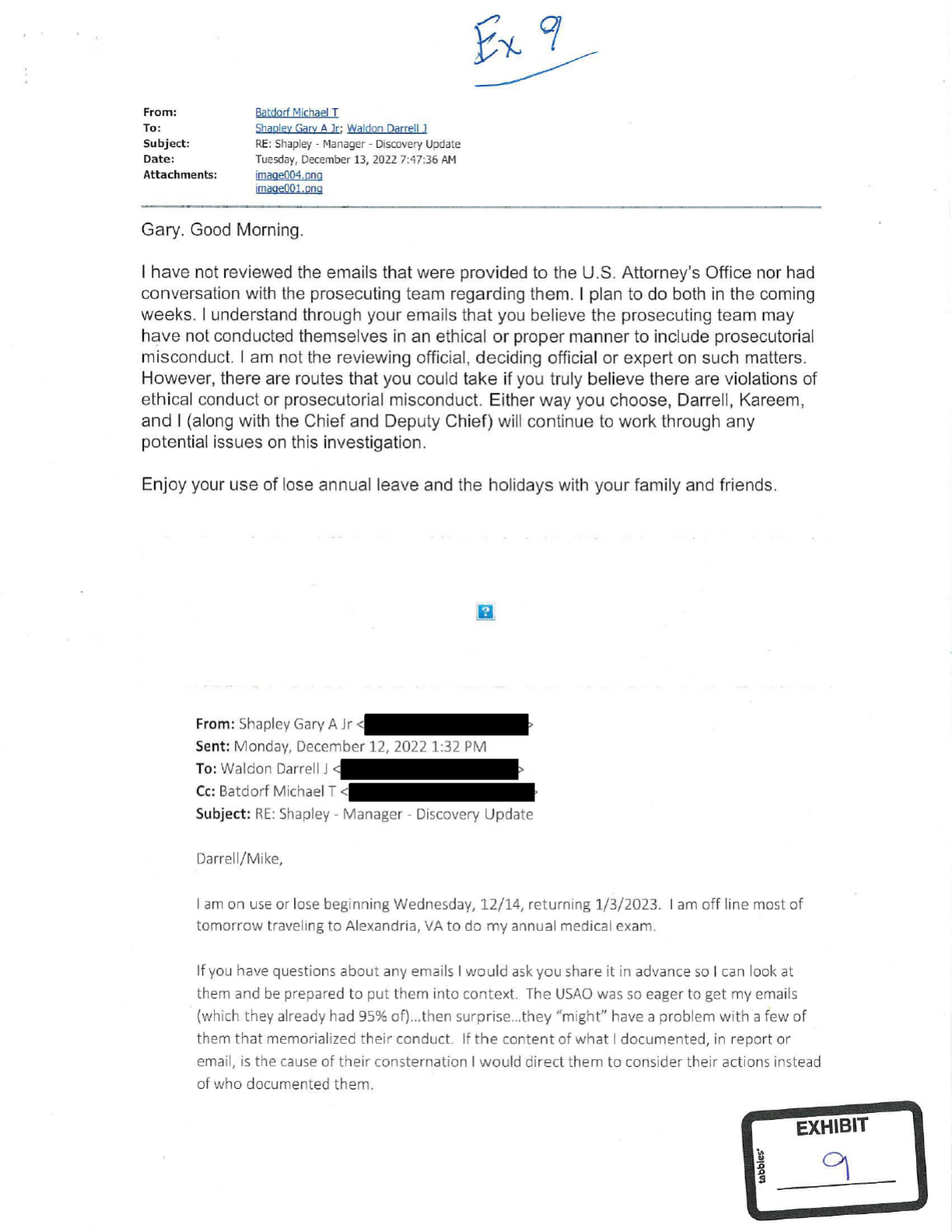


145
BY MAJORITY COUNSEL 1:
Q Okay. I've just marked as exhibit 9 the email you just referred to. Just to
confirm, can you describe this document?
A Sure, yeah. This is the email that I sent to Mike Batdorf, the director of
field operations, and cc'd -- oh, I'm sorry -- I sent to Darrell Waldon, the SAC, and cc'd
Mike Batdorf, the DFO. And this was the culmination of an October 24th
communication from Delaware U.S. Attorney's Office and -- well, it was really Lesley Wolf
and Mark Daly who called the case agent, , on the telephone and said, hey, we
need -- we need Shapley's emails and his -- these sensitive case reports that he's
authored back to May.
And they didn't ask for discovery for anybody else. They didn't ask for, from
the -- mind you, the agents had provided discovery March-April timeframe, so there was
6 months or so of additional discovery, and they're not asking for that, right? They're
only asking for mine.
So sends me an email with Wolf and Daly on it that says, hey, you
know, they asked for this, you got to talk to Shapley. I respond, hey, yeah, I'm available
9:15, let's chat. And she sends that, she forwards my email to Shawn Weede, number
[two] -- a senior level at Delaware U.S. Attorney's Office.
And then he contacts me about this discovery, and he's kind of putting a lot of
pressure on me. So even Weiss called up, the deputy chief, to complain about timing of
the emails that got turned over from me at that request. But, basically, I think that they
understood that it was a serious issue, what they had told me on October 7th, and that I
had a huge problem with it, so I think that they started looking into what I had done for 2
or 3 years. And then they specifically targeted me, because there was an SCR in my
146
original discovery that went to the chief that said that these people are doing the wrong
thing, and this is specific, not general, specific things that they're doing that are wrong.
So they wanted to get the universe of everything that I produced -- and then they
eventually started attacking me on it. And so October 17th was the last time we had an
actual call together. And then they canc- -- then there was -- and the next call was
scheduled, and then there's an awkward cancellation right before. And then they didn’t
-- they wouldn't talk to us anymore, and it was because they knew that I had documented
their malfeasance contemporaneously over the years.
Q Do you know whether those prosecution team's meetings continued after
October 17th?
A If they did, we were not invited. IRS was not invited. This is an email that
kind of toward the end where I had turned over the documents. The documents were
easy, but I'm not going to get into why the emails, we had to create PST files, and, [I]
don't want to get into it. But it was like a 25-, 30-day process.
Q Complicated?
A I had to get computer people on my computer to remote in to get it. I was
actually in San Diego assisting with execution of search warrants on other cases, and I
have computer people chiming in to try to get my emails, because Weiss is calling my
deputy chief, who knows what they're saying. So --
Q And at what time was that all taking place?
A It was right around Thanksgiving time.
Q 2022?
A Yes, thank you, 2022. And when the request came in -- it was like the next
week I was in Australia for search warrants, and then I was traveling somewhere else for a
week, Los Angeles, and then it was Thanksgiving. And then I was in San Diego for search

147
warrants. I had zero time to do this. So that's why I was like, I can't get this done right
now. And so, they were bothered by that, so they called my deputy chief and God
knows what they said. I don't know.
Q Okay.
A But this email was basically, I sent to these guys to say, this is just completely
unacceptable. And I laid out to them Jencks and Brady, and why a manager's
information would never be discoverable.
Now, if I had had a successful interview of Hunter Biden, that changes things,
right? I might be a witness, I could be impeached, et cetera, et cetera. But other than
that, because that didn't occur, they never ask for -- they never ask for discovery from my
level or above. Never.
Q Okay. And I was a little inartful before about protected disclosures. I was
trying to get at the point that the October 7th, 2022, meeting, is it accurate that that
would’ve been -- after that that is when you started to, or sometime after that, started to
consider the possibility of making a protected disclosure to Congress?
A Yes.
Q Okay.
A That's when I became -- looked into the process and read 6103, you guys and
Senate Finance, right, that's when that occurred, and that's when I sought counsel.
Q Okay.
A Did you want to finish document 8?
MAJORITY COUNSEL 2. Sorry, sir.
Mr. Shapley. Just a reminder, document 8, there are still things that we --
MAJORITY COUNSEL 2. We are going to come back to that, right.
We're marking exhibit 10.
148
[Shapley Exhibit No. 10
Was marked for identification.]
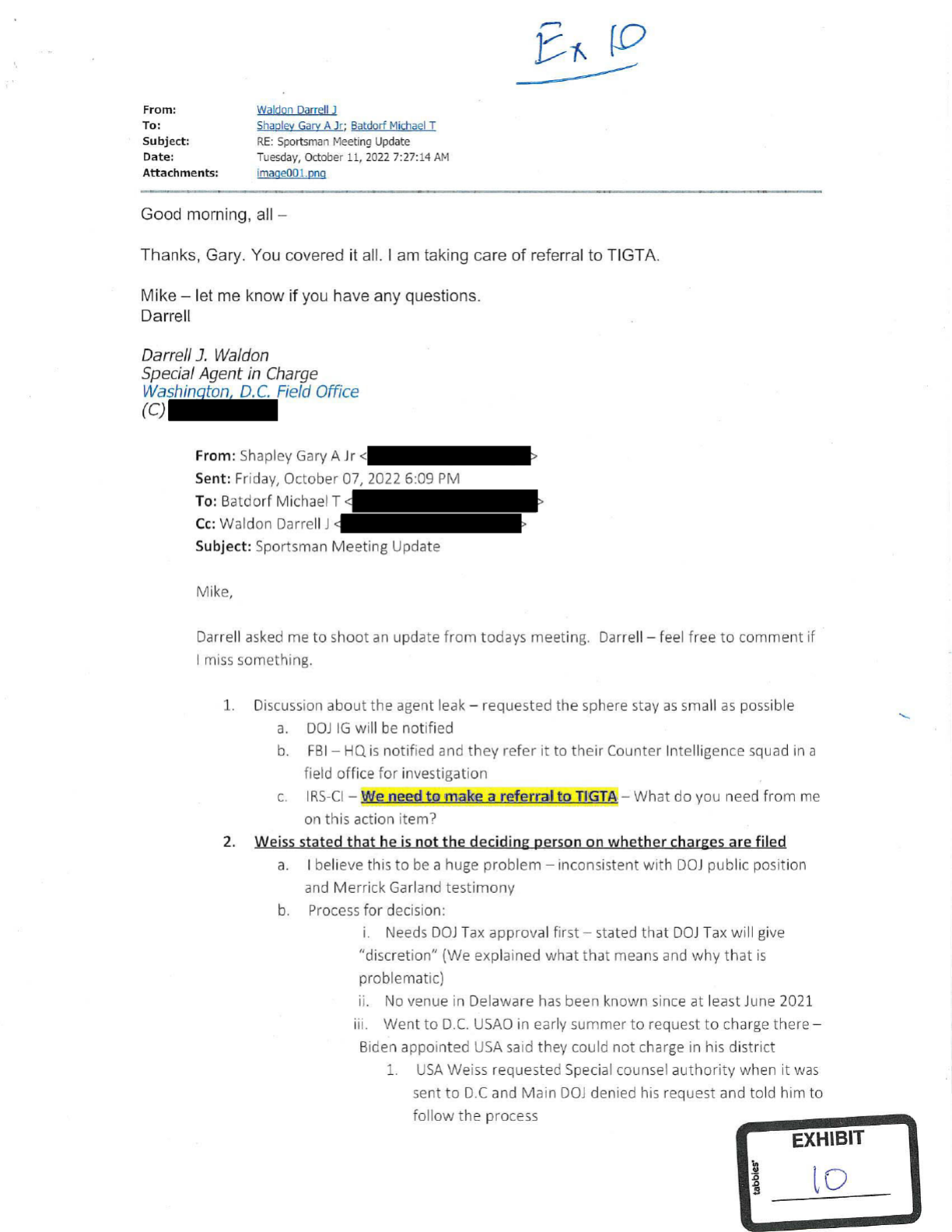
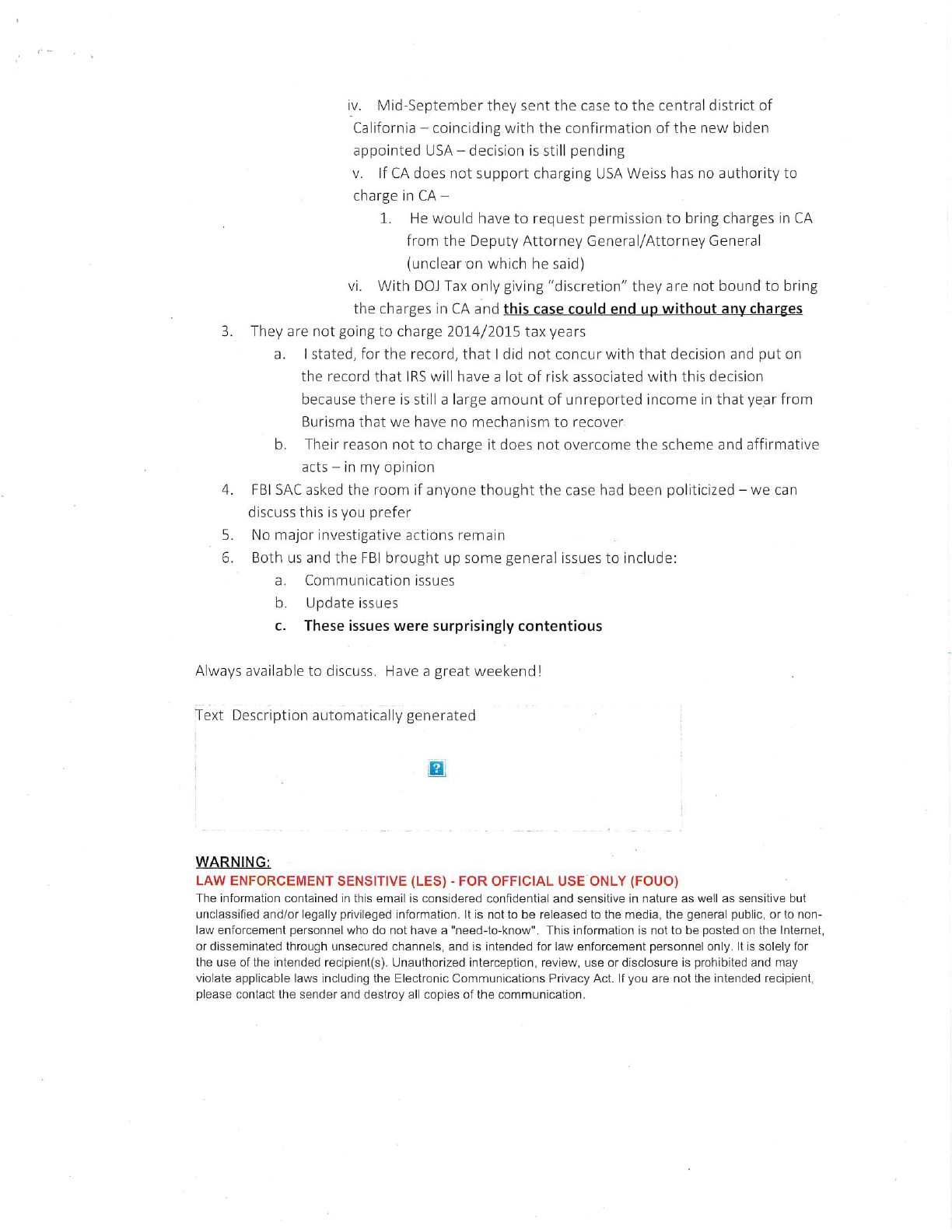

149
BY MAJORITY COUNSEL 2:
Q This is an email chain that starts on October 7th, 2022. Presumably this is
after the meeting, correct?
A That's correct.
Q And you send this to Mr. Batdorf and Mr. Waldon. And what is the upshot
of this document? Are you just giving a readout of the October 7th meeting?
A Yeah. I realized the gravity of what I just witnessed, so I didn't want it to be
a memo to file that didn't go anywhere else. So I did this to ensure that my information
was corroborated right then, right there.
Q Right.
A So that people couldn't --
Q Right. So this is essentially your contemporaneous notes from that
business meeting, correct?
A Yeah.
Q And at the top, Mr. Waldon indicates that this is an accurate reflection of
what happened in the meeting?
A That's correct.
Q And he was in the meeting?
A He was.
Q Did you have any discussions with him outside of this doc -- did you tell him
you were preparing the document?
A Yes, I did. I told him that I would be the one that would summarize it for
Mike, the DFO, Batdorf, and I said that I'd cc you so that you can confirm.
Q Okay. So your email says: “Mike, Darrell asked me to shoot an update from
150
today's meeting.”
Did Mr. Waldon ask you to prepare this?
A I put it in front of him and he said sure, that sounds great.
Q Okay.
A So --
Q And you're just trying to explain why you're sending the email, correct?
A I'm trying to play nice because I was -- I'm trying to play nice.
Q In No. 1 on this email you prepared, says: “Discussion about the agent
leak -- requested the sphere stay as small as possible…DOJ IG will be notified. FBI -- HQ
is notified.”
What was the specific leak?
A So there was a leak, I'm not sure what outlet, on October 6th of 2022 -- it
appeared to come from the agent's level, who was critical of the prosecutors for not
charging the case.
Q Okay. Talking about the Hunter Biden case?
A Yes, not charging the Hunter Biden case.
So, obviously that was part of the discussion at the beginning. And there have
been multiple leaks in this case going back, and this one was handled a lot differently
because I guess it was purportedly from the agent's level.
So this drastic -- you know, they used that as an excuse to kind of -- to do what
they were doing to us after this meeting on the 7th, they kind of used that leak as an
excuse to exclude us.
Q And then the second item in the memo -- or the document you prepared,
this summary of the meeting, AUSA “Weiss stated that he is not the deciding person on
whether charges are filed…I believe this to be a huge problem -- inconsistent with DOJ
151
public position and Merrick Garland testimony.”
It's pretty remarkable that the U.S. attorney on October 7th said he is not the
deciding official. Did he say it in those words?
A Yeah. He said, I am not the deciding person on whether charges are filed.
Q So there's no ambiguity, he was crystal clear in what he was saying?
A It was how I understood it, and it was also how the special agent in charge
understood it.
Q Okay. Is there anything else in this document that is worth bringing to our
attention?
A Yeah. So if you go down to 2 b ii, that's kind of the acknowledgement that
it's been kept in Delaware since June, even though the venue is known or was in
Delaware since 2021, which not -- it is what it is. But that describes the reason why we
run into these conflicts now in the political interference here.
So he says that when he went to D.C. U.S. Attorney's Office in early summer to
request charge there, Biden-appointed U.S. attorney said they could not charge in his
district. So it said they could not charge. So up to that point, I thought that he had just
said we don't support this.
Q Right.
A And we thought that Weiss was still deciding. And when he said this that
said he could not charge, okay. So that's a big difference -- that's a material difference
in what was occurring.
And then he further says that he requested special counsel authority when it was
sent to D.C. and the Main DOJ denied his request, told him to follow the process.
Now, following the process, as they would've only have known, was to go through
another -- a non-Weiss-appointed U.S. attorney -- or not Weiss. They were going to go

152
through somebody else. And when AG Garland's first defense of why everything's okay
here, he immediately goes to because is Weiss a Trump appointee. So the materiality of
this being a decision outside of Weiss is pretty significant, in my opinion.
So then it goes on to page 2. So at the bottom of page 1, that's when Weiss
requested special counsel authority. That's the first time we'd heard that, and that he
was denied.
And then he said that they went to Central District of California mid-September,
and it was the same week that the Biden-appointed U.S. attorney was confirmed. And
then he says, if California does not support charging, Weiss has no authority to charge in
California, which is obviously contrary to what Merrick Garland said. Then he said that
he would have to request permission to bring charges in California from the DAG or AG.
Q Right. And earlier this morning when we were talking about Senator
Grassley and the Attorney General, and maybe my notes are wrong, but I thought we had
discussed that the effort to bring the case to the Central District of California was in
January of 2023, and this here seems that it was -- or a little bit earlier?
A No, it was September.
Q It was September.
A September 2023?
Q Okay. I probably have it wrong.
A Yeah.
Mr. Shapley. September 2022.
Oh, in January 2023, we learned from SAC Waldon that California had declined
to --
MAJORITY COUNSEL 2. Okay.
Mr. Shapley. -- declined the case.

153
BY MAJORITY COUNSEL 2:
Q Oh, okay. I understand. So in September of 2022, the materials are
presented to the Central District of California?
A That's correct.
Q And it wasn't until January of 2023 that a resolution on that was
determined?
A It's when we learned of it. I don't know if it had already been decided.
Q Okay. And along similar lines, is it fair to say that in March of 2022, the
case was brought to the U.S. attorney for D.C.?
A That's correct.
Q And then in the early summer of 2022 is when you learned that the U.S.
attorney in D.C. had declined to move that forward?
A No. It was right in March, because that was when Mark Daly was calling my
case agent.
Q Okay.
A The one call was, hey, things kind of look good here. Call a couple days
later was, they said no.
Q Okay. So that was in March?
A That was in March.
Q And that was right away. There was no delay or there was no --
A There was very little delay. We weren't involved in the presentation in
D.C., so I don't know the exact date that it went over. But it was right there at the end
of March that it was declined.
Q So in your notes on page 1, 2 b iii, went to D.C. U.S. attorney in early
summer, is that Weiss sort of getting the dates --
154
A Yeah, I think he was just --
Q -- incorrect?
A -- kind of being --
Q Okay.
A Yeah.
Q But it should read March of 2022, correct?
A He would've been more accurate to say spring than early summer.
Q Okay. And then flipping back to the second page, No. 3, this is what you
stated for the record, that if they're not going to charge 2014 and 2015, they're just
letting this Burisma income go untaxed, correct?
A Yeah.
Q And this is just a gift to the taxpayer, right?
A It significantly reduced the egregiousness of his conduct if that wasn't
included.
Q Right. And I think we had established that he was getting paid about a
million bucks per year in 2014, and it started in April, so it was two-thirds of the million.
A Yeah.
Q So that was just going completely tax-free to the taxpayer Hunter Biden,
correct?
A That's correct.
Q Did you get any feedback when you stated that for the record?
A There was just some general discussion.
Q Okay.
A It wasn't anything reportable, I guess.
Q So nobody said, Gary, whoa, whoa, whoa, there's a mix-up here, the reason

155
we can't do this is because of X reason?
A No. No. There's an August email that maybe I alluded to before from
DFO Batdorf that says that we support 2014 and '15, and we're going to have the deputy
chief call over to Stuart Goldberg at DOJ Tax to tell him we support it. And then SAC
Waldon is in this meeting, right, FBI SAC Sobocinski and FBI ASAC Holley are there as well.
It was just that was their decision.
Q Okay.
A But the funny thing is that now that he said he requested special counsel
authority in D.C. and was denied back then, him saying that he decided not to charge '14
and '15 at that point in time was moot, because he had no ability to charge it. So maybe
that's a nuance that only I think is important.
Q Right.
A But, he's saying that he made the decision not to charge it, but he didn't
make the decision not to charge it. The D.C. U.S. Attorney's Office made the decision
not to charge it. And then when he was denied special counsel authority, he had no
ability to charge it.
Q Okay.
A And that's my understanding.
MAJORITY COUNSEL 2. Off the record a second.
[Discussion off the record.]
MAJORITY COUNSEL 2. Back on the record.
BY MAJORITY COUNSEL 2:
Q We'll go back to exhibit 8. There's a discussion at the bottom of page 81,
where the Special Agent Wilson asked whether the VP, meaning now President Biden,
ever showed up at any CEFC meeting.
156
Is it fair to say that the question is whether the President, the now President, ever
showed up at his son's meetings to support his son, to give it some legitimacy? Is that a
fair reading of the question?
A Yes.
Q And the answer was "yes" from Rob Walker, correct?
A Yes. And this question was specific to out of office, and his request was
yes.
Q Right. And did they also ask whether the President, when he was the VP,
appeared at any meetings on behalf of his son, when he was in office?
A Yes. So the bottom of 82, FBI Agent Wilson, “Any times when he was in
office or did you hear Hunter say that he was settin’ up a meeting with his dad with them
while dad was still in office,” and Walker's response was "Yeah."
Q And then flipping to the next page, Special Agent Wilson said: “Okay. All
right. Um.., when you started to learn about like you were going your separate ways as
far as um..,splittin’ off.., you and James were not gonna.., but you know that Hunter was
continuing on and was…,”
Is James a reference to James Biden?
A Yes.
Q And do you know what's going on in that exchange right there about James
going his separate ways with Rob Walker?
A I don't know anything too specific about that.
Q Okay. And there's also a reference to Tony in this document.
A Yes.
Q A little bit further down on page 83. And Tony I think appears on page 80
as well. I was just wondering, for the record, who Tony is, if you know.
157
A That's Tony Bobulinski.
Q Okay. Tony Bobulinski.
A So if I could add -- it was page 81 or 82, right in the middle. And Walker
basically describes that the VP “literally sat down. I don't even think he drank water. I
think” -- and then he's basically saying Hunter told him about the company he's trying to
start --
Q Right.
A -- with these guys. And basically saying, well, if you're going to be around,
Dad, can you like, stop by? And, he'd show up, it said. So then Wilson asks him,
“so…you definitely got the feeling that, that was orchestrated by Hunter…to have…an
appearance by his Dad at that meeting, just to kind of…bolster your chances at…makin’ a
deal work out.” And Walker said "sure."
Q Walker agrees, but of course he agrees. Why else would Hunter bring his
dad into these meetings, correct? He's trying to trade on the family name, and if he
brings his dad to the meetings, it gives him a lot more credibility, correct?
A It would make sense, yes.
Q Is there anything else on this exhibit that we have not discussed that we
ought to?
A Yeah. That was 82. Yeah. So he asked a question about when he was
out of office, did he ever meet with him, but then he also said, well, when he was in
office, did he --
Q Right.
A -- he responded that, yes.
Q Right. Okay.
A Yeah.
158
Q Next exhibit we're going to mark is the WhatsApp document. This is
number 11.
[Shapley Exhibit No. 11
Was marked for identification.]
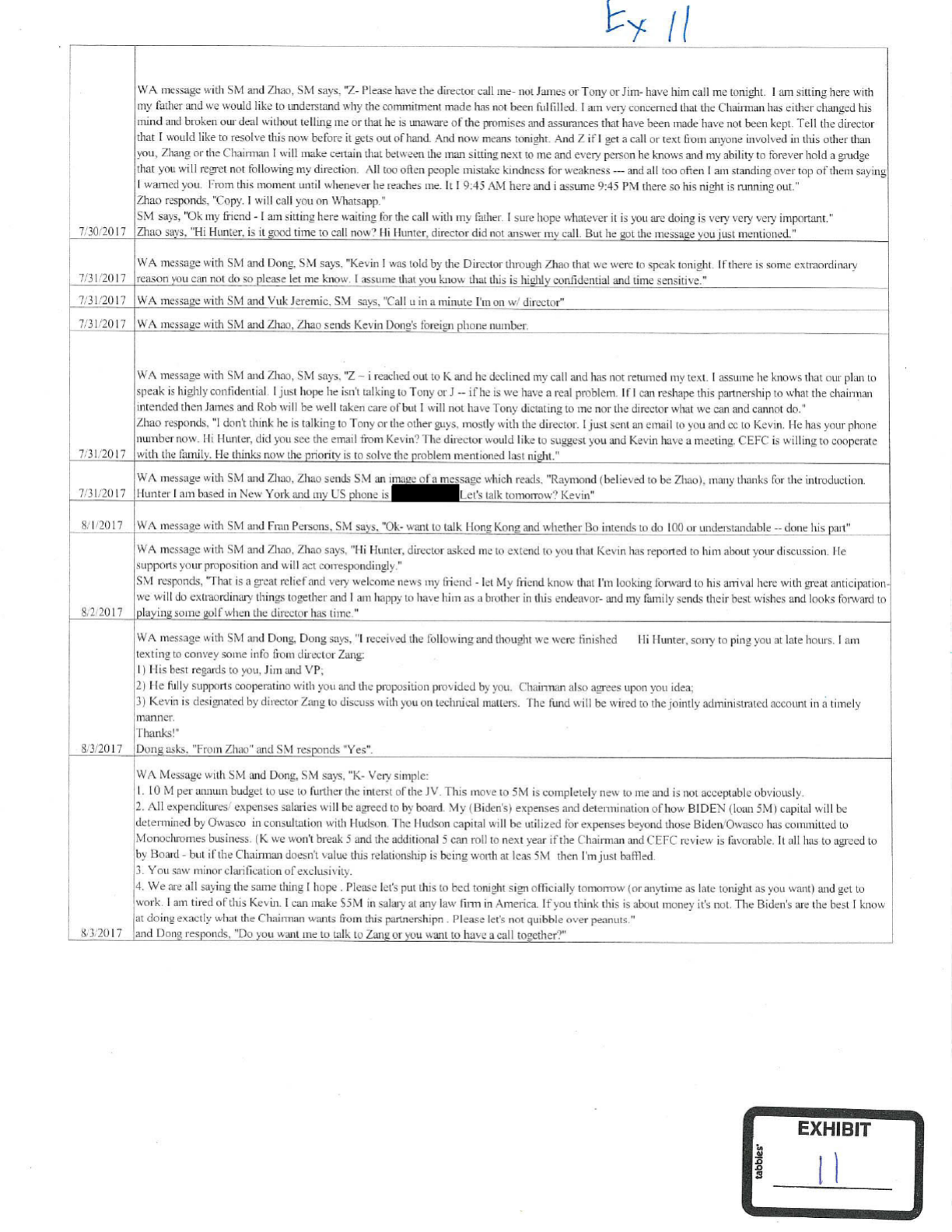

159
BY MAJORITY COUNSEL 2:
Q Could you tell us about this document, what is it, and how was it obtained --
A Sure. So there was an electronic search warrant for iCloud backup, and
these messages were in that backup and provided --
Q Okay.
A -- from a third party, from iCloud.
Q Okay. Who was it provided to?
A The -- the investigative team from --
Q Okay.
A It would go through all the same processes of -- since it's electronic, it would
go to one of the computer analysis folks, and then they would put it in a readable format,
and then it would go through filter review.
Q Okay. And these aren't WhatsApp messages, these are summaries of
WhatsApp messages, correct?
A Yeah, that's correct. Because it was something about the readability of the
actual piece, right? It was easier to summarize in a spreadsheet.
Q Okay. And who did the summary? Who prepared this document?
A It was either the computer analysis guy or , one or the other.
Q And you referenced some of this document in your opening statement.
And if you can draw our attention to the parts that you referenced in your opener.
A Oh. Do -- would you like me to --
Q Well, you can just flag it --
A Yeah. So --
Q -- by date -- or some of the dates are multiple dates, so --

160
A The first one, July -- the top one, July 30 of 2017, and this is Hunter Biden
emailing Zhao, who is one of the executives at CEFC. He's basically saying have the
director call him, and he's demanding that he doesn't call James Biden or Tony or Jim
Bulger (ph). Have him call me. And it says, I'm sitting here with my father, and he
would like to understand why the commitment made has not been fulfilled.
Mr. Leavitt. Sorry. You said "he." "We" would like to understand.
Mr. Shapley. Oh, sorry.
And we would like to understand why the commitment made was not fulfilled.
So I mean, I'm just looking down.
So it says, “And Z, if I get a call or text from anyone involved in this other than you,
Zhang or the Chairman I will make certain that between the man sitting next to me and
every person he knows and my ability to forever hold a grudge that you will regret not
following my direction.”
So then there's, a little bit going on. And then Hunter Biden responds, “Okay, my
friend -- I am sitting here waiting for the call with my father. I sure hope whatever it is
you are doing is very very very important.”
BY MAJORITY COUNSEL 2:
Q That seems pretty threatening, doesn't it?
A Yeah, yeah. And there are other excerpts, some that are pretty pertinent
where --
Q And just for the record, SM stands for Sportsman?
A That's correct.
Q Which is Hunter Biden?
A That's correct.
Q Is it unusual to use a code name like that or code initials? If you were just
161
investigating somebody who didn't have national prominence, would you make up a
name like Sportsman?
A We do use code names now and again. FBI is really heavy in them.
Q Okay.
A So this code name did come from FBI --
Q Okay.
A -- on this particular one. We probably would've went with Robert Doe.
Q Okay.
A But it does happen occasionally.
Q Okay.
A So some of the other pertinent things in here are just talking about, CEFC is
willing to cooperate with the family.
Q And what date was that?
A That is 7-31-20- -- well, it's one, two, three, four, the fifth message --
Q Okay.
A -- second line from the bottom, go all the way over.
Q Got it.
“The director would like to suggest you and Kevin have a meeting. CEFC is willing
to cooperate with the family.”
And the family is the Biden family, correct?
A Yeah. And he even alludes to that later on, all the way in the very bottom
of No. 4, of the last part of that message where --
Q Who is Kevin Dong?
A So he's like the CEFC spokesperson kind of in -- he's Gon Win Dong (ph), and
he goes by Kevin.

162
Q Okay.
A So he's just connected with CEFC. He's kind of the runner.
So that No. 4, fourth line up from the very bottom, “put this to bed tonight…I can
make $5 [million] in salary at any law firm in America. If you think this is about money
it's not. The Bidens are the best I know at doing exactly what the Chairman wants from
this partnership…let's not quibble over peanuts.”
But, you know, he alludes to "the Bidens are the best I know at" again here.
Q And who is saying "the Bidens are the best I know"?
A Hunter Biden is saying that.
Q Okay. So Hunter Biden is referring to sort of his family here, "the Bidens
are the best I know"?
A Yep.
Q So he's self-identifying that his family is good at doing this?
A At doing what the chairman wants from this partnership. Chairman Ye is
who he's speaking about.
Q Okay.
A And --
[Discussion off the record.]
Mr. Shapley. Yeah. I just flagged the third message to Vuk Jeremic.
MAJORITY COUNSEL 2. Okay.
Mr. Shapley. And that's from Hunter Biden to Vuk Jeremic. And it says, “Call u
in a minute I'm on w/ director.”
So Vuk Jeremic is that former Serbian politician and former -- I don't know what
his title was but of the U.N. Assembly. And so because of something like that in this, let
alone the rest of it, we wanted to look into this.

163
And the reason why this was included in here was because that when agents saw
this in late August, September of 2020, we went to the prosecutors. We said, we got to
ask questions about this, we got to figure this out, we got to -- like, what's going on with
this? And the response was, No. No, we're not going to do it.
You want to know why? And it makes a little bit of sense, right? Well, we don't
know if he was lying that his father was sitting next to him, right?
So then we said, well, let's get the location data for the messages, and if they're
co-located, then we're on better ground here, right?
MAJORITY COUNSEL 2. Right.
Mr. Shapley. And they, no, we're not going to do that. And we even brought
that up in a pros-team meeting because created an agenda for every single
meeting, and the agenda item number, like, 2 or 3, or whatever it was, location data, and
that was specific to this, and they didn't allow us to do it.

164
[3:29 p.m.]
BY MAJORITY COUNSEL 2:
Q And the reason you wanted to look into this is because there could have
been a lot of money coming in from CEFC that was untaxed, correct?
A Yeah. We're talking about a lot of things there. There's FARA in play.
And the FBI is considering a lot of national security type issues here. And we were
precluded from doing anything.
Q Is there anything else from this exhibit 11 that we haven't covered that we
should?
Mr. Lytle. Can we confer for a second?
MAJORITY COUNSEL 2. Excuse me?
Mr. Lytle. Can we confer for a second?
MAJORITY COUNSEL 2. Of course.
MAJORITY COUNSEL 1. Off the record.
MAJORITY COUNSEL 2. Go off the record, please.
[Discussion off the record.]

165
Mr. Shapley. I had alluded to FARA and some other things there. But, some of
these people in here, Chairman Ye, Gon Win Dong (ph), Zhao, are believed to be
connected to the Chinese Communist Party.
BY MAJORITY COUNSEL 2:
Q Okay. So there could be national security implications with
communications with those officials, correct?
A That is correct.
Q And was that sentiment also shared by the FBI?
A Yes.
Q And despite those concerns that the FBI had and that the rest of the team
had, that was not looked into. Is that correct?
A The prosecutors said don't do it. And then we asked for location, they said,
no, we're not going to do that. And if FBI did something at some level, I'm not privy to
it.
Q So you don't know if FBI CT went off and --
A You would almost hope that they did, but I don't know if they did.
Q Okay. We're going to turn our attention to some of the retaliation you
have faced.
BY MAJORITY COUNSEL 1:
Q We talked about the email you sent up to Mr. Waldon, talking to Michael
Batdorf. And you read a portion of that in your opening statement as well.
Subsequent to that and in other material that you have shared with the
committee, you referenced a failure to select situation. Can you explain what happened
with that situation?
A Sure, yeah. So I was selected in 2018 to help stand up the Joint Chiefs of
166
Global Tax Enforcement called the J5. It's an assembly of Australia, U.K., Canada,
Netherlands, and United States. And because of my reputation working on international
cases and working with other countries, and my experience, Chief Don Fort at the time
selected me. It wasn't something where it was even a job announcement. It was all of
a sudden you are a member of the J5, and I had to ask what the J5 was.
So I helped stand up the group. My agents worked a vast majority of the
operational cases that are considered J5 cases. And ultimately there was a J5 lead. It
was an IR-1 position, like a deputy director level position at headquarters. She was
retiring. And, everyone thought that that was the job that I was going to get, right, and I
wanted that job. And I was already an IR-1 because I was the assistant special agent in
charge at the Chicago field office during that time. And I received and outstanding
rating during that rating period and everything. So I applied for that job.
There were two people that were original members of the J5. I was one of them.
And ultimately, I didn't get that job. The interview was one day after this email, and --
Q That interview was on December 14th?
A That's correct. And this email was December 13th. Well -- I'm sorry.
The bottom one is December 12, 2022, top one is December 13, 2022.
So, being that J5 lead, they work directly with the chief, because they're basically a
spokesman for the chief in J5 matters. So -- ultimately I interviewed. And then on
January 3rd, 2023, in senior staff meeting they announced the other person, Oleg, had
gotten the position.
I'm friends with a lot of people on senior staff, and they called me and said, what's
going on here. And it wasn't till the next day that Scott Goodlin, the director of IO,
called me and told me that I wasn't selected for the job. And I'm the one that had to
brief Scott Goodlin when he got that job about what the J5 was.
167
So -- the person selected -- he hadn't been an ASAC. I'd been an ASAC for 16
months at two different SES field offices, New York and Chicago. I wasn't --
Q So you believe you were qualified for the position?
A Yes, I do.
Q And you believe you had qualifications superior to the individual selected?
A Yes.
Q And why do you believe you were not selected?
A Because I'm raising these issues. And I think that -- Weiss calling my deputy
chief, and right before this, right around this time, and who knows what he said, but I
think it tainted me. I think that they retaliated against me because of that. There's
really no other explanation for it. Even what was explained to me by Scott Goodlin as to
why Oleg got it, it almost -- it made no -- I don't even know if Scott Goodlin understands it
made no sense, but it made no sense, right? So yeah.
Q Did you hear from colleagues after that decision was made about the fact
that you hadn't gotten the position?
A Yeah. Several of our foreign partners, one of them is like the deputy chief
of the Australian taxation office, basically was dejected and was like how -- I don't even
know -- it was twofold; one, because I told them I was going to resign from my J5 duties,
which I did do. And they were like, well, number one, what are they going to do without
you? But I was in charge of a vast majority of operational stuff. And I had the
institutional knowledge since it stood up, many of the things I helped stand up. So -- I'm
sorry.
So after I resigned to the director of global ops Kareem Carter, who is actually now
the SAC of Washington, D.C. field office. It was Lola Watson ASAC, Kareem Carter SAC.
He was the director of global ops. And I sent him an email, and said, I'm resigning my J5
168
duties. And they had no idea what to do. And then I'm talking to some of the analysts
there. Are there any discussions? They are like, no, we don't know what's going
on -- obviously they had one chief brief -- monthly I briefed the chief and the top
executives on the J5 stuff.
So I wasn't on the first call after I resigned. And they were like, there were no
questions answered because I wasn't there. And -- sorry, I just lost my train of thought.
Q It's okay. Is it fair to say that there are others inside the agency that would
share your opinion that you were more qualified than the person selected?
A Oh, absolutely, yes. There were even times when the person who got
selected, he couldn't do what he needed to do, so he had to call me in to do it. One was
a trip to Australia in February timeframe to go and represent in the intelligence group
there and the J5. And he just simply would have added no value, so I had to go. And
then there was a briefing to, it's called a JSEIT, it's joint strategic -- JSEIT, it's J-S-E-I-T, it's a
joint strategic emerging issues task -- I don't know what T is for. I apologize.
So I presented on three of the J5 cases within my group at this JSEIT meeting,
which is basically a bunch of executives from all over the different business operating
divisions within IRS. And I presented three cases that we are working on J5. And when
they asked for someone to speak to that group, it came through Kareem Carter to Scott
Goodlin, director of IO, to Oleg. And Oleg responds with, well, the only person that can
give this presentation is Shapley.
So then I give the briefing, and now I'm the lead of one of the working groups out
of there. And I was just asked to be the lead of a second working group, which I asked
them, please, I don't have the time.
Q Understood. Okay. Moving forward to May 15th, 2023, the committee
received the letter from your counsel noting that you and your entire investigative team

169
were removed from an ongoing investigation of a high-profile controversial subject, who
we've been discussing is Hunter Biden. Is that correct?
A That is correct.
Q How long had you been working on this investigation when you were
removed?
A Since January 2020.
Q Who informed you that you and your team were being removed from the
investigation?
A SAC Kareem Carter.
Q How were you informed?
A The ASAC Lola Watson put a meeting on my calendar, and it was a telephone
call, conference call. And the subject was Sportsman update. wasn't
invited, but I had him on the line anyway, and he witnessed the telephone call. We
produced a memo which both of us signed, because was taken off the investigation as
well, so he can see and sign all documents.
Q Okay. And remind me -- I know you covered this earlier, but just for the
record, when you say the whole team was removed, how many people was that?
A Sure. Yeah. So it was me, Case Agent , Co-Case Agent Christine
Puglisi, and the rest of my team, which is 12 in total, were not allowed to take the
investigation. So they basically ensured that it was not under my supervision anymore.
Q Were you given a reason on that phone call as to why the team was
removed?
A I specifically asked and he said, no, didn't give a reason. To which I said,
how could you possibly make a decision like that in a case like this without being given a
reason? So then I said, well, if you were given a reason and you can't tell me, okay, just

170
don't tell me, but don't tell me they didn't give you a reason -- so I challenged him on it.
Q And was the case closed at this point?
A It was not closed, no.
Q Were other IRS employees assigned to the case? Was your team replaced?
A After, yes.
Q So to the best of your knowledge, the investigation remains open and the
team has been replaced by other IRS personnel?
A Yes.
MAJORITY COUNSEL 2. And did we indicate who made that decision? Was it at
DOJ or --
Mr. Shapley. I don't know if it was asked, but yes, Kareem Carter told me that
DOJ had requested that change.
MAJORITY COUNSEL 2. And do we know who at DOJ? Was it the Tax Division?
Was it the U.S. Attorney's Office in Delaware?
Mr. Shapley. He said DOJ, is my recollection.
MAJORITY COUNSEL 2. Okay.
BY MAJORITY COUNSEL 1:
Q In your career at the IRS, have you ever been removed from an active
investigation like this?
A No, no. And we even saw testimony from Don Fort, the former chief of IRS
CI. And I don't remember the context or who was asking the question, but he was asked
about this issue and said, in your 30 years, had you ever seen a team removed like that?
And his response was, no, I've never seen that.
Q And this was recent testimony before Congress?
A It was May 16th.

171
Q What is your understanding about who has decision making authority about
what IRS personnel work on any given investigation?
A IRS personnel should be managed by IRS, not by DOJ.
Q In this context of IRS working on cases with a different department, different
agency, Department of Justice, are you aware of any formal documentation about how
that relationship is managed, a memorandum of understanding, any kind of agreement
about who has decision making authority on an issue like this?
A I don't think I know of a memorandum, no. No.
Q And why do you believe you and your team were removed from the case?
A I think the DOJ, because we were raising protected disclosures, that they
wanted to get rid of us. And it was twofold because we were making disclosures, but
also because they knew that our disclosures were valid.
Q Moving forward, only a week, May 22nd, the committee received another
communication from your counsel. It included an attachment that was a letter to the
IRS commissioner, Daniel Werfel, regarding additional retaliation.
Can you talk about what happened in that instance?
A Yeah. So after being removed from -- my red line was October 7, 2022.
case agent's red line was being removed from the case without cause. And
he decided to make that disclosure to the IRS commissioner because he thought that the
people who were retaliating were at the highest levels of IRS CI, so he went to the next
two levels, which is the deputy commissioner and commissioner of IRS.
Q And how did IRS respond to that communication?
A So ASAC Lola Watson sent him an email basically threatening him that he
could have violated 6(e) with the communication with someone who's not on the 6(e) list.
I only could assume that that's the commissioner, because our 6(e) lists are incredibly
172
robust. I mean, the commissioner is on it now. So, I would imagine Lola Watson is not
on the 6(e) list and she's an ASAC, right? Because ASACs come in, ASACs come out, and
it's really the position.
So they threatened a 6(e) violation, which there was no 6(e) in there. And also
told him that there is no -- no information should be shared at any time outside of his
chain. It was like 2 minutes later, Kareem Carter, the SAC, sends an email to all the
managers in the D.C. field office saying that you are to follow the chain of command, in
no instances are you to provide information outside of that chain of command without
their permission.
Q Why is that problematic?
A It was a direct threat. Other people, like the co-case agent that is going to
make her decision on what she wants to do, that is a shot across her bow, and anyone
else that ever wants to comes forward, and it's just plain and simple.
Q And did that communication about discussions not leaving the chain of
command, did that include any language acknowledging exceptions for whistleblowers?
A It did not. There was a follow-up email from Deputy Commissioner
O'Donnell yesterday where he sent out to everyone in the IRS basically -- it seemed as
though they realized that they had done something wrong and they were trying to
cleanse their error. And they sent an email that had language about how to blow the
whistle of 6103 and 6(e). I believe that -- 6103 issues or 6(e) issues. And my
understanding is that's also deficient, because it did not have language in there that you
can go to Congress and that there are ways that you can go to --
Q So it did not include any reference or any language about individuals being
able to contact Congress or communicate with Congress about allegations of
wrongdoing?

173
A That's correct. Even in their attempt to cleanse, they still fell short. It was
an email from deputy commissioner of services enforcement is what is says, but that's
Douglas O'Donnell. And it was yesterday, May 25th, at 4:53 p.m. And yes, there's no
language of being able to make those disclosures to Congress.
Q Okay. Other than the items that we've just been discussing, have there
been any other issues of potential retaliation that you would like us to know about?
A I think that there is. Can I have a second?
MAJORITY COUNSEL 1. Go off the record.
[Discussion off the record.]
MAJORITY COUNSEL 1. Back on the record.
Mr. Shapley. So this is emerging now. We have a really large case, and it's
actually 's case, just the best agent. And this huge case, nationwide, with
around 30 to 40 spinoff investigations. And we required the director of field operations
to buy on to the strategy. And it was in January where I presented the strategy to them,
and all three DFOs agreed to the strategy. And then it was in February, I don't have the
dates in front of me, DFO Mike Batdorf sends an email to all people across the country
who were working this case saying that we're going to pause on it. So that was in
February.
And now we're still trying to work it. We're still trying it push it forward. We
have all these meetings, and they keep giving us -- they keep telling us ways that they
would approve it moving forward, but we can't move forward that way because there's
already grand jury material in it and because I'm not speaking about the Hunter Biden
case, I can say that.
BY MAJORITY COUNSEL 1:
Q This case is different --

174
A Different --
Q Totally unrelated case?
A Totally unrelated case.
Q I'm sorry. You're describing a totally unrelated case. Is that right?
A That is correct. Yeah.
So even today I don't know -- what's the date? The 26th of May, we're still on a
pause. And I think that it's directly related to coming forward and making these
disclosures, because Mike Batdorf was the one that I initially called and said, with advice
of counsel, to say, hey, I've retained counsel and I'm going down the road to blow the
whistle, and then all this stuff starts happening.
Q So you believe he may be retaliating by slowing down or impacting your
duties and responsibilities on totally unrelated matters?
A Absolutely. And all three DFOs agreed to this strategy and then he paused
it. And the effect is now they can say, oh, well, you screwed this up or you didn't do
something right or something happened, and it can ultimately affect me.
Q And for the record, what does DFO stand for?
A Director of field operations.
Q Okay.
MAJORITY COUNSEL 1. Our hour is up.
[Recess.]
BY MINORITY COUNSEL 2:
Q Just really these are clarifying questions. The letter you wrote to the
committee regarding your being removed from the Hunter Biden audit was on May 15th.
On what date did the Sportsman update meeting occur?
A Sure. So, my lawyer sent that letter. And also, it wasn't an audit. It's a

175
criminal investigation, just to clarify. But that meeting was 1:30 on May 15th.
Q Okay.
A And the letter went the same day. Yes.
Q Okay. And could you clarify or explain what the IRS' response was with the
disclosure up the chain? Who exactly is Lola Watson and what is her role,
and how does she fit into that disclosure?
A Sure. Yeah. So , one of my agents; me, SSA supervisor; ASAC,
assistant special agent in charge Lola Watson; then SAC Kareem Carter.
Q Okay.
A So he sent the email to ASAC and above. So ASAC, SAC, DFO, deputy chief,
chief, deputy commissioner, commissioner. And she, the ASAC Lola Watson was the one
who responded directly to him about following the chain of command which just a small
nuance is that she didn't send it to me, which would have been the chain of command,
so --
Q I see. So she was someone who was on the original email, along with the
commissioner, the deputy commissioner, all the way down. In her response, did she
also cc the commissioner, cc the deputy commissioner, or was that just sent directly to
him?
A The only address we could see was his, so we don't know if there was bcc.
Q And presumably, since the meeting was on May 15th, that email to the
commissioner was also May 15th or May 16th or sometime close thereafter?
A I think it was the 12th, May 12th. I think -- was it a Friday?
Q Well, if the meeting didn't occur until the 15th, I'm trying to figure out --
A Oh, no, no. Oh, no. Okay. I'm sorry. I wasn't following your question.
Q So when was 's email to the commissioner, et cetera?

176
A Okay. Okay. I'm sorry. I totally missed your question.
Q Yeah.
A So it was -- is the 15th a Monday or a Tuesday? It was Monday or Tuesday
was when that happened. And then he sent the email either Thursday or Friday of the
same week.
MINORITY COUNSEL 1. 15th is Monday.
Mr. Shapley. Monday, yes. So that's when I got the call that the team was
removed, and he sent that email Thursday or Friday.
Mr. Leavitt. Just to clarify, you received our letter, right, that had it as an
attachment?
MINORITY COUNSEL 1. Yes, we have the May 15 letter.
MINORITY COUNSEL 2. Do we have the email with the attachment? I
can't remember.
Mr. Leavitt. May 22nd, I think, is the date we sent our letter.
MINORITY COUNSEL 1. Yeah, we have that.
MINORITY COUNSEL 2. We have it in our files.
And then I guess my only other question is, as far as personnel decisions go in
terms of who assigns who to a case or who would remove someone from a case, is there
any reason in the normal course of business that the commissioner of the IRS would be
asked or have to approve any kind of movements at that level?
Mr. Shapley. I don't know of that occurring before, so I don't know who would
approve it.
MINORITY COUNSEL 2. Okay. I'm good.
MINORITY COUNSEL 1. Thanks. And I'm going to make mine brief, so I think
we're almost done here. That gives everybody hope.

177
BY MINORITY COUNSEL 1:
Q I want to go back to exhibit 11. That's [where] the WhatsApp messages
were summarized. I had a couple of clarifying questions on that.
Who is WA? There's a WA --
A That means WhatsApp.
Q Oh, WhatsApp. Okay. That's not a person.
A No.
Q I was wondering how you guys knew it was WhatsApp.
Okay. And then you mentioned when you were providing some explanation
about these WhatsApp messages that Chairman Ye was talking about a partnership.
What is that partnership? And that was in connection with the July 31, 2017, message
or so. I know you were talking about that.
A Sure. Yeah, yeah. I'm just --
Mr. Lytle. Which message is it? Can you direct him to it?
MINORITY COUNSEL 1. I have written down here in my notes that it's the fifth
message, July 31, 2017. It talks about, "Will work with family." That one.
MINORITY COUNSEL 2. "If I can reshape this partnership to what the chairman
intended."
Mr. Shapley. Oh, oh. Okay. Yes. Oh, I'm sorry.
BY MINORITY COUNSEL 1:
Q What is the partnership? Do you know what it does or what it's supposed
to do?
A In all of my review of the evidence in this case, I'm not exactly sure what
Hunter Biden is doing for this money. So the partnership, I'm not really sure what
services he's providing as part of that partnership.

178
Was that your question?
Q Yeah. I was trying to see, if this is some sort of a real estate partnership or
a -- I have no idea. We don't know.
A This particular CEFC deal is not a real estate deal. No, it's not. There are
some dollar amounts in the last message, but I didn't really go into that too much.
Q Okay.
MINORITY COUNSEL 1. Okay. We don't have anything else.
MAJORITY COUNSEL 1. Okay. Well, we want to thank you for --
Mr. Lytle. Can we just have a follow-up?
MAJORITY COUNSEL 1. Oh, sure.
Mr. Lytle. I just have a couple of follow-up questions, if that's okay.
MAJORITY COUNSEL 2. This is on the record?
Mr. Lytle. Yes.
MAJORITY COUNSEL 2. Okay.
BY MR. LYTLE:
Q So, October 7, 2022, the meeting with Weiss where Weiss proclaimed he
didn't have the authority to make charges. You know that meeting, right?
A Yep.
Q Could you just name the people that were in attendance at that meeting, to
the best of your recollection?
A Sure. Yeah. So from the FBI it was SAC Tom Sobocinski, ASAC Ryeshia
Holley. IRS SAC Darryl Waldon. I was ASAC at the time, and I was there. And it was
U.S. Attorney David Weiss and then Shawn Weede. And Shannon Hanson.
So I don't know what Shawn Weede and Shannon Hanson's titles are, but they
were like David Weiss' one and two type person. Probably crim chief, first assistant, that

179
area.
Q And so if someone wanted to just check with those folks, they could tell
what they heard Weiss say at the same meeting that you were at.
A Yep.
Q Fair to say?
A Yep.
Mr. Lytle. Okay. I don't have anything else.
MAJORITY COUNSEL 2. I'm sure they're going to be eager to come in and speak
with us.
MAJORITY COUNSEL 1. Is there anything else that you would like to mention
before we conclude today that we haven't already covered?
Mr. Shapley. No. Just thanks for listening. My life's on the line here, so do
what you can.
MAJORITY COUNSEL 1. Thank you very much for your time and for a long day on
a Friday before a holiday weekend. We greatly appreciate it. Have a good afternoon.
Mr. Shapley. Thank you.
Mr. Lytle. Off the record.
[Whereupon, at 4:11 p.m., the interview was adjourned.]
180
Certificate of Deponent/Interviewee
I have read the foregoing ____ pages, which contain the correct transcript of the
answers made by me to the questions therein recorded.
_____________________________
Witness Name
_____________________________
Date
